Meikyuu Kingdom by Bitchtits McGee
Welcome to the Million Dungeons!
Original SA post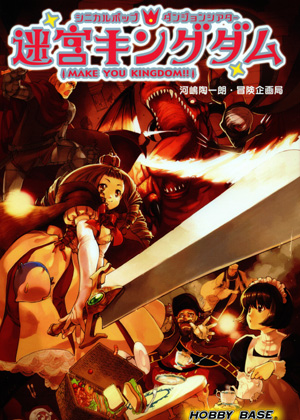
Cynical-Pop Meikyuu Kingdom Dungeon Theater
Introduction: Welcome to the Million Dungeons!
Okay, see if you can follow me, here. Two-thousand-ish years ago, the world was your standard anime high-fantasy setting. Presumably, anyway. Not much record actually survives of it, because of a global cataclysm of unknown origin that turned everyplace into monster-infested dungeons overnight. Earth, sea, sky, literally everything : literally dungeons. Yeah, "verisimilitude" pretty much isn't a word here. Anyway, humanity was almost driven extinct by the ensuing chaos, but the cataclysm also brought out the Landmakers among the people: superhuman adventurer-kings with the strength of arms to drive back the monsters and the force of will to impose order back onto the dungeons. The present-day world is still largely a deadly, anarchic place, but thanks to the Landmakers, enough patches of civilization exist to create a sort of overall normalcy.
Meikyuu Kingdom , yet another entry from Japan, is a game of two parts, as evidenced by the two core rulebooks: Kingdom and Dungeon. As Landmakers, players start out with a tiny nation the size of a small village and 50 ordinary citizens depending on them for survival and leadership. Your first duty is to the people, managing the growth and direction of your kingdom to create a safe haven. Yours isn't the only point of light in the world, either, and diplomacy must be maintained with the others (well, not must , but y'know). That, broadly, is the "Kingdom" part.
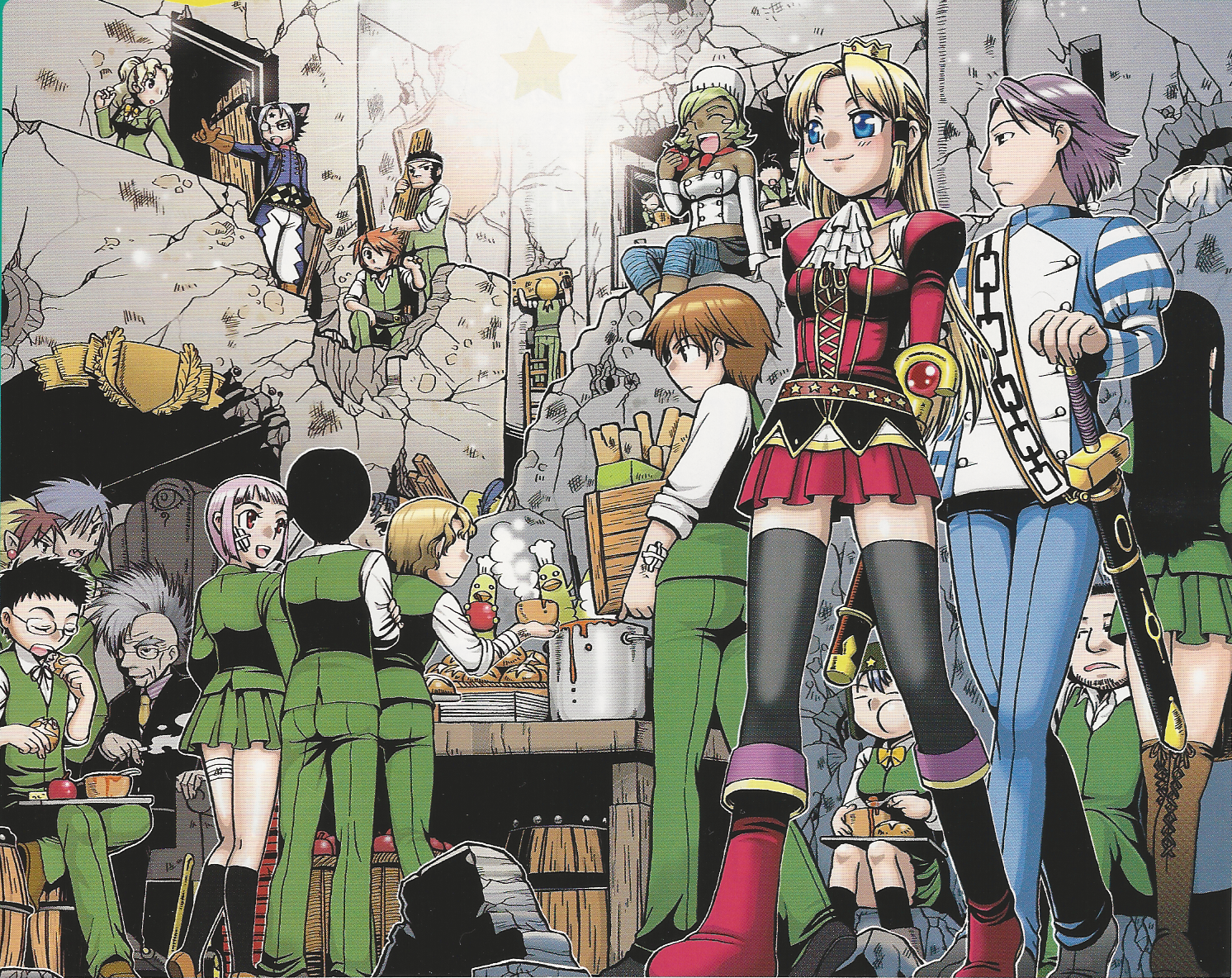
It would be hard for me to overstate how much I love everything about this picture. It's pretty much the reason I bought these books.
The "Dungeon" part should be fairly self-evident: the landscape continues to shift unpredictably, and adventure is practically a universal constant. Anything you gain will likely have to be taken by force; luckily, the Million Dungeons are so diverse that anything you could want to gain can be found somewhere, usually with a nest of monsters sitting on top of it. Kill them, take their stuff, and pawn it to fund your latest civil engineering project! See how it all fits together?
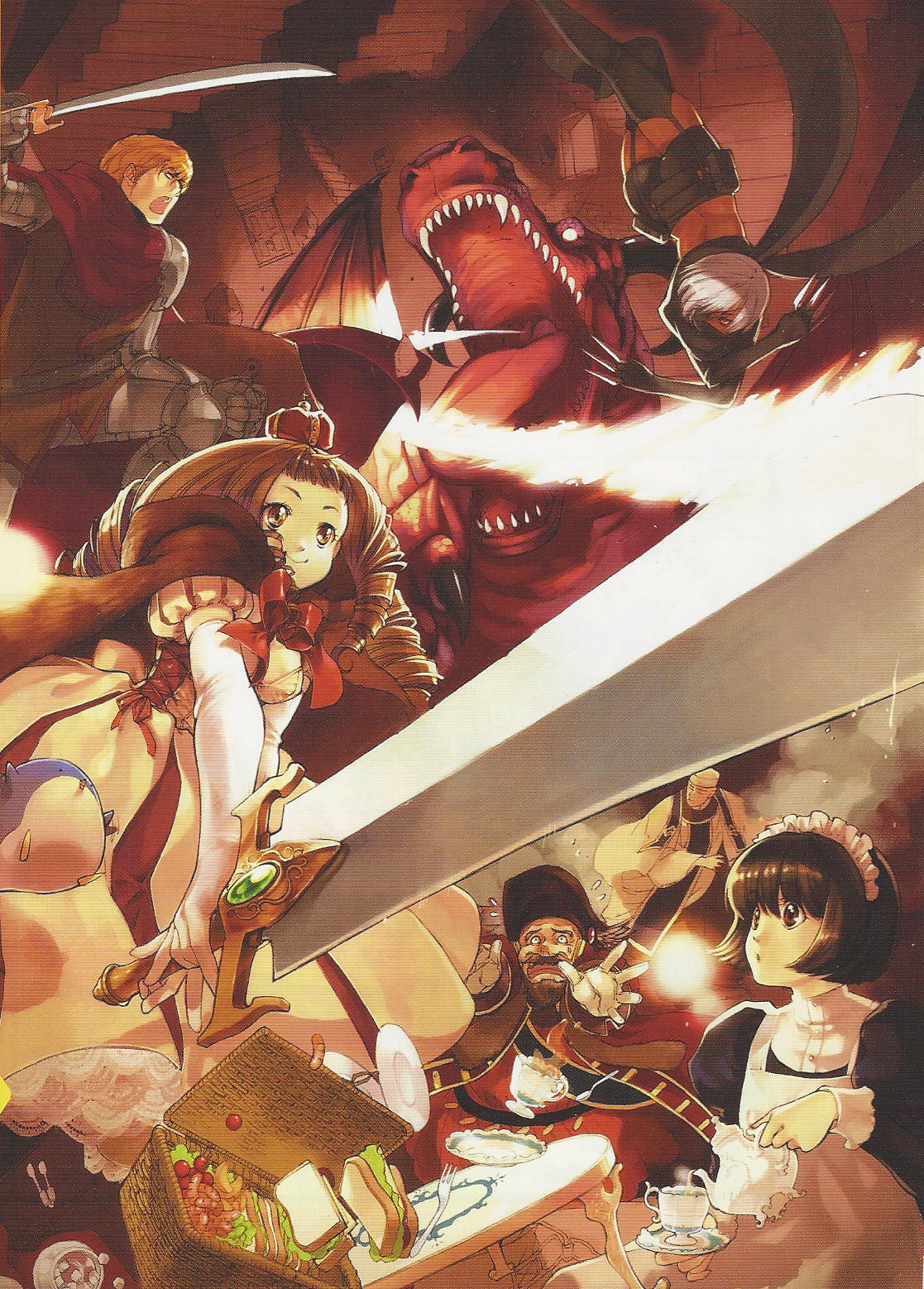
Picnic cancelled on account of dragon attack. Again.
I can't think of a good segue into this part, so I'm just going to digress. The Kingdom Book's actual introductory chapter is rather interestingly set up. It starts with a short comic:
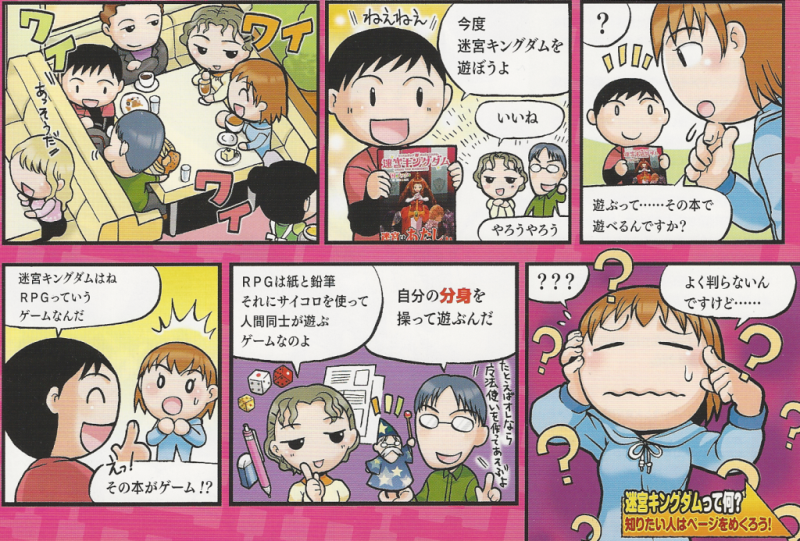
"What? That book is a game?!"
A group of friends are hanging out in a restaurant when one of them spontaneously suggests a game of Meikyuu Kingdom ! Everybody is instantly on board, except for the lady in the blue hoodie, who is confounded by the very concept of role-playing games. The rest of the intro is framed as Blue Hoodie asking a question and Book Provider answering it in very basic terms (the term "other self" is used repeatedly in place of "player character"), a combination of the Game Fiction and Infodump types I don't think I've ever seen anywhere else.
It also establishes Meikyuu Kingdom as a game that can be picked up by anyone practically instantly... a claim which I'm frankly not sure it actually delivers. That's not to say the mechanics are terribly complicated, because they're not. Aside from the character sheets, everything with any sort of stat block, from monsters to items to buildings to skills , is represented by a card (all of which are present in the core books for printing/photocopying), which makes everything easier on everyone. There's also quite a bit of rolling against tables involved, which while nowhere near TORG levels of insanity, could still bring the game to a confusing halt while books are flipped through... except then I remembered after typing out this paragraph that they printed duplicates of every table in their own chapter for easy access. Well, it's just a pie-in-the-sky sort of thing to say, alright?!

That's sort of an odd note to end on, but whatever. Next time: a brief glossary of terms and suchlike that may come up later but don't really fit in easily with any other sort of post! I can't wait!
Miscellany
Original SA post
Cynical-Pop Meikyuu Kingdom Dungeon Theater
Kingdom Book Chapter 0.5 - Miscellany
Dice! Gotta have dice. In this case, though, only six-sided ones, and only maybe a dozen of them at the absolute maximum. Rolls come in two flavors: the standard Xd6 which needs no introduction, and the d66 . d66s are used almost exclusively for those tables I mentioned in the last post (although tables don't use d66s exclusively), and are made by rolling 2d6 and counting the lower number as a "tens" digit. This way, the results range from 11-16, 22-26, 33-36, and so forth. Rolling higher is generally better.
Notations! They show up on the cards. For future reference:
-
( ) - Character Attributes or National Powers
< > - most game variables
[ ] - mathematical formulas
{ } - the name of some other card
Default setting! There is one, but what I already covered in the intro is pretty much the only definition it gets in the Kingdom Book. It gets a few scattered mentions, but everything beyond a vague outline left in the Dungeon Book. This seemed strange, but now I'm guessing it's because they don't want to unnecessarily color whatever ideas of their own the players might have while still leaving enough for the GM to fill in any blanks or answer any questions. Since that's sort of me here, I'll just get it all out of the way now and define what might come up:
-
Dungeon Hazard
- common name for the mysterious disaster that set up the whole high concept of the game.
-
Hazard King
- Arthurian figure renowned as the first Landmaker.
-
Million Dungeons
- common name for the post-Hazard world at large. Not an empirical number, but referring to the fact that anywhere you go now will be a dungeon.
-
Grand Zero
- the world is split into three levels, Norse mythology-style. This is the name for the ground in the middle.
-
Firmament
- dungeons in the sky and space and apparently Heaven as Angels are among the Firmament-type Monsters.
-
Deeps
- dungeons below sea level. Includes the actual sea.

-
Great Powers
- Not every other kingdom out there is as small as yours. This term refers to four in particular whose influence is entirely global: Meikyuu Superpowers.
-
Dynamite Empire
- The youngest of the Great Powers, and on the fast track to becoming the largest. Its philosophy: reclaiming the world by beating the Million Dungeons into submission with
overwhelming brute force.

-
Millennium Dynasty
- Has existed practically unchanged since the Dungeon Hazard, at least. Very Middle Kingdom-y.
-
Metro Khanate
- Nomads and raiders whose entire kingdom exists on a series of trains. I don't know where the tracks come from, or if there are any tracks. Does it really matter?
-
Holy Capitalist Republic of Hagulma
- Economics thrive in the Million Dungeons under the loyal stewardship of Hagulma, part corporation, part bank, all kingdom.
I feel like I'm forgetting something, but then again, I always feel like that. It's usually the case, too. Anyhow! Next time: kingdom creation! For those interested in reader participation, roll up about fifteen d6s and we'll see what sort of place we get! I can't wait!
Kingdom Making
Original SA post
Cynical-Pop Meikyuu Kingdom Dungeon Theater
Chapter 1: Kingdom Making!
Before making any characters, you've got to make a place for them to live. Makes sense, right? Of course it does! So, you'll get a sheet rather like this one, only without the helpful notations:
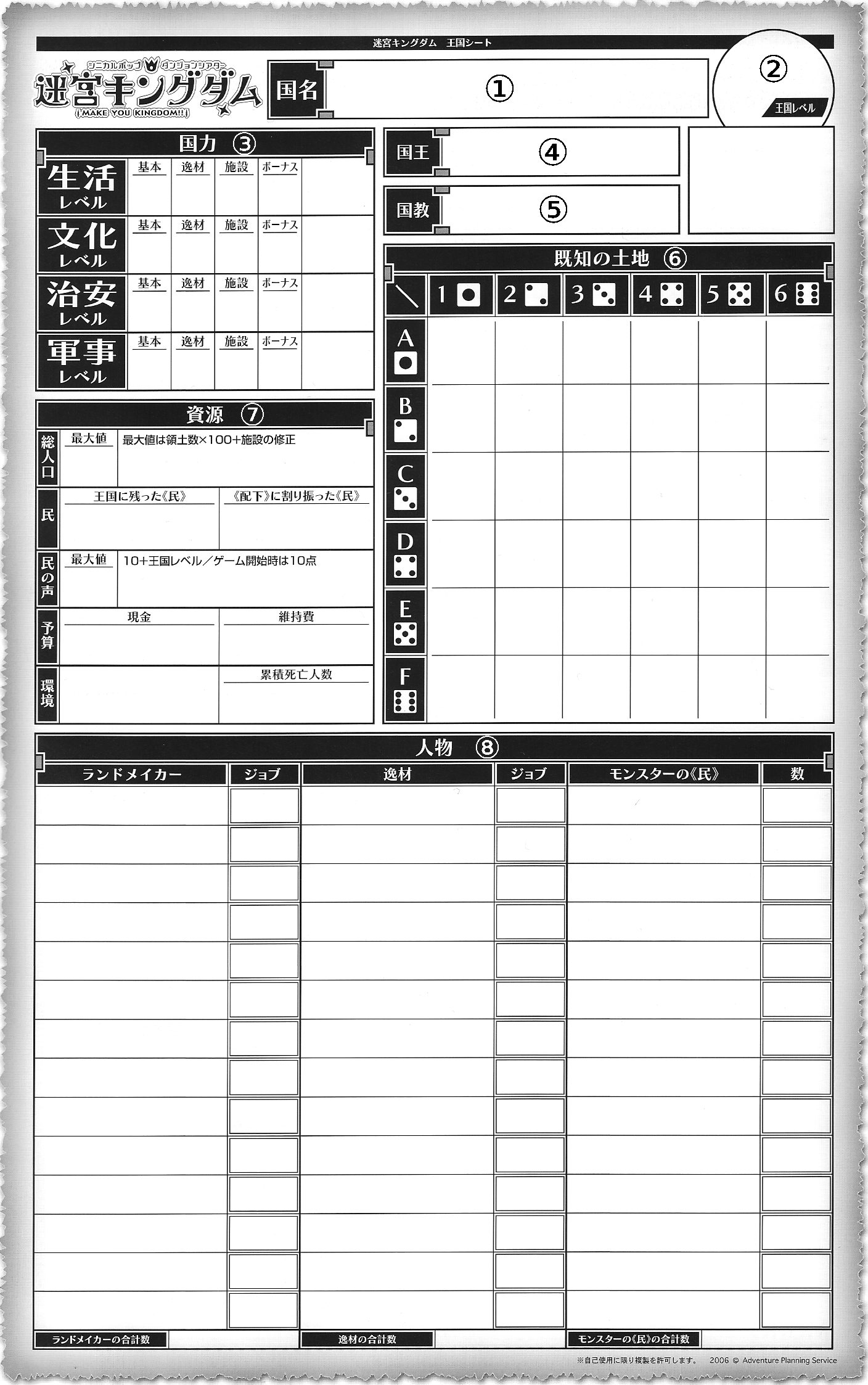
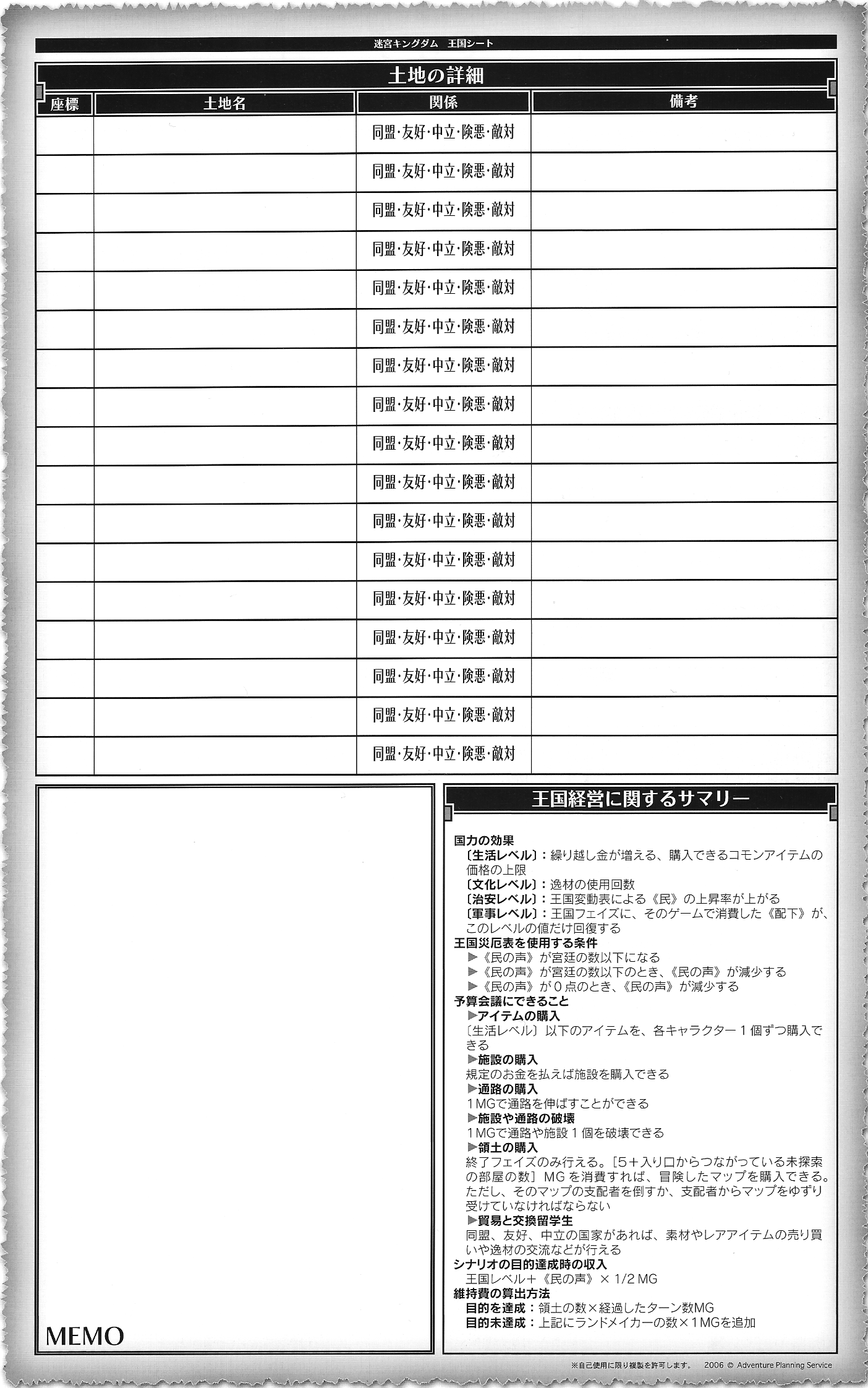
Probably having a hard time reading that, huh. Hence the helpful notations!
① - Kingdom Name. Self-explanatory.
② - Kingdom Level. Determined by total population; more peoples makes for a higher level. Since you start with 50 citizens, that makes for a Level 1 Kingdom.
③ - National Power. Determined by adding the total of four levels, each representative of your Kingdom's general capabilities: Quality of Life (economic prosperity), Culture (education/artistic expression), Public Order (internal security), Military (external security). The starting value for each level is 1. If any one of these levels is ever reduced to 0, the Kingdom is destroyed.
④ - Name of Royalty. Determined in the next chapter.
⑤ - State Religion. 95% certain this field's just for flavor. At least, if there's a single skill or effect that makes use of this, I have yet to see it.
⑥ - Terra Cognita. Essentially, this is the game map. Your Kingdom's Territories are recorded here, along with any other permanent landmarks you've discovered, such as rival kingdoms.
⑦ - Resources. From top to bottom:
-
Max. Population
: Equal to [Number of owned Territories x 100]. Since you start with just one Territory, that makes this 100.
-
Citizens
: This field is used during the game to keep separate track of "<Citizens> Remaining at the Kingdom" and "<Citizens> Assigned as <Staff>". More about what that actually means next chapter.
-
Vox Populi
: Latin for "voice of the people". Measures how much confidence the people have in their rulers. Comes up a lot later on. Starts out at 10.
-
Budget
: Divided into "Available Funds" and "Maintenance Costs". The specifics of these won't come up for a good while yet, so just remember "money" for now.
-
Environment
: ...What the heck is this doing here? The first field is blank, and the second is "Total Number Killed". I don't remember this being used or mentioned anywhere in the rules, but I have been wrong before. Guess we'll find out together.
The second image is the flipside of the first, and is taken up chiefly by Diplomatic Relations. In the one corner is a blank space for notes, and in the other is a summary of some of the rules we're going to get to later.
With sheet in hand, it's time to start rolling! Pretty much everything in this chapter and the next can be determined by dice tables. Note that I said "can be", because the book explicitly states that using the creation tables is entirely optional - if you've got your own ideas, you are encouraged to run with them - but still strongly recommended for new players still getting used to the way the game runs. They also make for much more manageable examples, so yeah.
First up, rolling for your Kingdom's name. There are three Naming Tables: 1) a governmental type or overall philosophy, 2) a miscellaneous adjective or "personal" emblem, 3) what sort of place you're in. (In English, the end result comes out more like a general definition of the kingdom than a name, really, but it's still handy.) Each table takes a d66 roll, so three players make one roll each for one of the tables. If the final output isn't quite to everyone's taste, any other players who didn't make a roll can change one result apiece.
EXAMPLE posted:
Ryuujin rolls 45 against Table 1, JohnOfOrdo3 rolls 12 against Table 2, and dereku rolls 44 against Table 3. This makes "Imperial Unified Shogunate". Mr. Maltose decides to reroll Table 2, and gets 25: "Kitty". Nyaa decides to reroll Table 3, but just gets another 44... then they notice that, rules-as-written, they're not required to reroll at all, just change the result! So they look over the whole table and pick out "Planet". Final result: Imperial Kitty Planet!welcome to cat planet! oh yeah!
(Actually, rules-as-written, they're not limited to picking a result from the tables, either, but as I said, I'm keeping it simple.)

Tower? Tree trunk? Beats me, but it sure is there , man.
Next comes the Kingdom's Environment. No apparent relation to that mystery field on the sheet, "environment" here refers to any unique features of the Kingdom itself or the surrounding area. This time, everybody gets a turn at rolling, including the GM. Environment rolls are in two parts: a 2D6 to determine the type of Environment, and a 1D6 against the appropriate table (sometimes with supplemental rolls for more specific results).
EXAMPLE posted:
Nyaa rolls 9 for a Facility, and a 6 against the Facility Table: "Your kingdom is very remotely situated." Did I cover Facilities in the glossary post? It's been so long, I can't remember.Just in case I didn't, Facilities are special rooms you can build for various beneficial purposes. Each Facility Table result has a supplemental D6 roll to determine a specific Facility; here, Nyaa gets a 5, for a free {Hunting Ground} (anyone who uses it before heading out to the dungeon gets a +1 bonus to hit).
JohnOfOrdo3 rolls 8 for a Resource, and a 3 against the Resource Table: "Your kingdom has struck up a co-existence with the dungeon's monsters." The Kingdom starts with one {Ranch} Facility (allows for breeding more Monstrous Citizens), and an extra 1D6 Monstrous Citizens, whose race is determined by another D6 roll. John rolls a 6 and a 2, making for six Horselizards . Now, the book says that special rules may exist for different types of Monstrous Citizens, but all I've found about them so far in either book is that they can be used as Staff, which doesn't actually set them apart at all.
Mr. Maltose rolls 2 for an Art, and a 4 against the Arts Table: "Yours is an industrial kingdom, famed for the quality of its craftspeople." Start with one {Blacksmith} (raises the Item Level of weapons and armor) and one {Guild} (allows the requisite-free selection of certain Skills) in Dungeoneering or Item Skills.
dereku rolls 7 for another Resource, and a 5 against the Resource Table: "The hidden fortune of a previous ruler was recently discovered in your kingdom." Start with an extra 1D6 MG in your budget. What's MG, you may be wondering? Well, that's a very good question. From context, all I can say is that it's the basic in-game measure of currency, but it doesn't seem to be actually defined anywhere in either of the core books or any of the errata published on the official website. Kind of a weird oversight, but not really a major thing. Anyway, dereku rolls a 6. So, 6 MG.
Ryuujin rolls 5 for a Custom, and a 4 against the Custom Table: "Many retired adventurers and soldiers have gathered in your kingdom." This increases the base value of your Kingdom's (Military) by 1.
The GM rolls 11 for a Bloodline, and a 4 against the Bloodline Table : "Your kingdom was once home to a brilliant alchemist, who created artificial humans to use as servants." This lets the PCs learn a Monster Skill from any Fetish-type Monster of a lower level. The lowest level Fetish Monster is Level 2, though, so this wouldn't come into relevance for a couple of games, at least. Hey, that blank space next to "Environment" on the Kingdom Sheet would be a good place to note this down! Still don't see why they couldn't have labeled it, though...
That's it for rolling in this chapter. The rest of the Kingdom Creation process is adding up numbers and filling in blanks:
Population : Start with 50 regular <Citizens>, and add any Monstrous Citizens and/or Prodigies obtained in the Environment rolls. JohnOfOrdo's six Horselizards brings the total Population to 56, which according to the chart, is enough to raise the Kingdom Level to 2! Huzzah! (You're probably wondering about those "Prodigies". Well, it'll be easier to explain them in the next chapter, so just bear with it for a while.)
National Power : As previously stated, the base value of each level starts at 1. Ryuujin's Customs roll brings the base value of (Military) up to 2, making for a total National Power of 5.
Geography : There's two parts to this one. First, the players have to set up the internal layout of their Kingdom. For that, they'll need a Map Sheet:
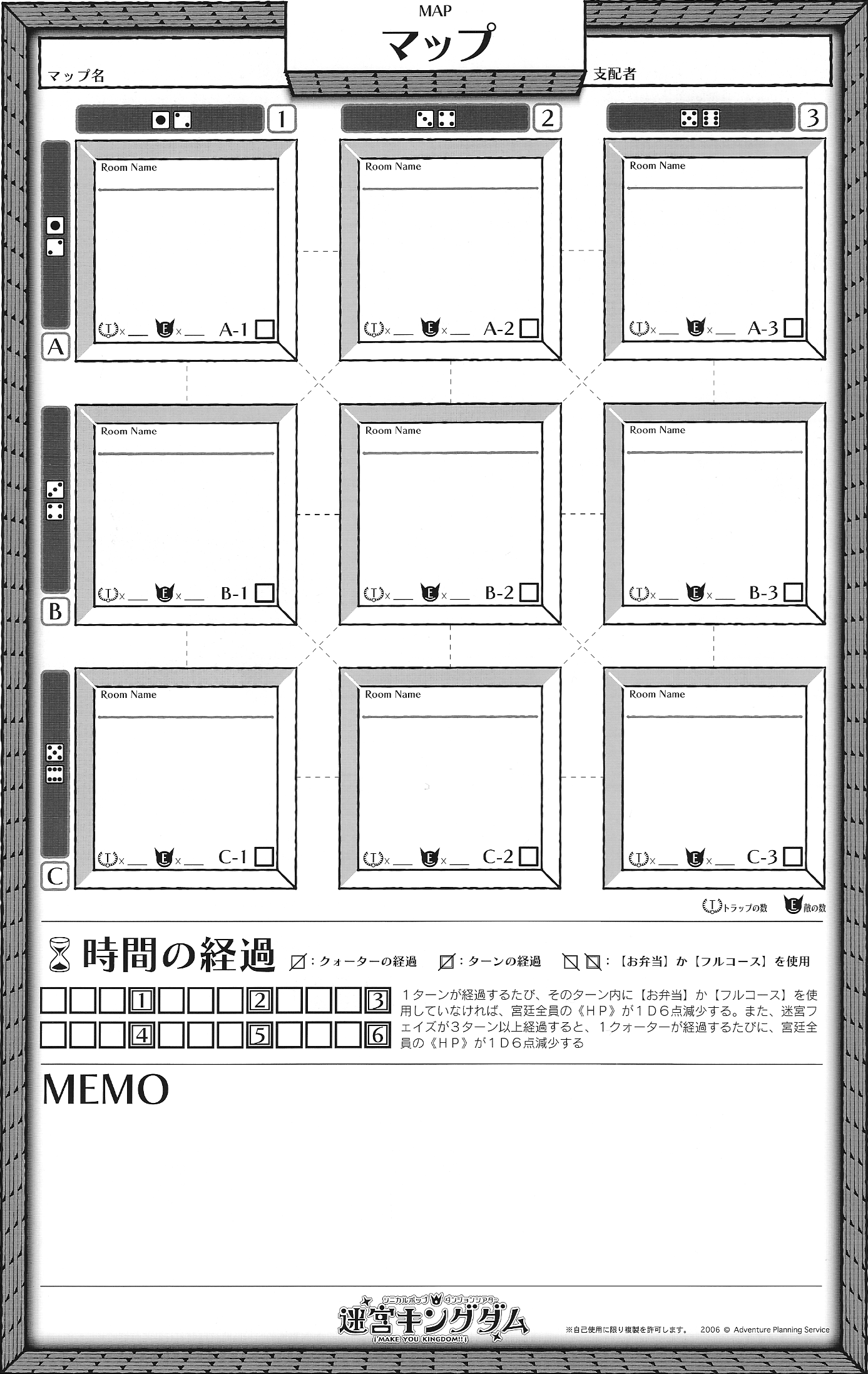
Incidentally, this same sheet is used by the GM to map out dungeons, so most of what's on here won't come up until we cover combat in a few chapters.
Like so. Firstly, every Kingdom starts out with one free Facility, a {Royal Palace}:
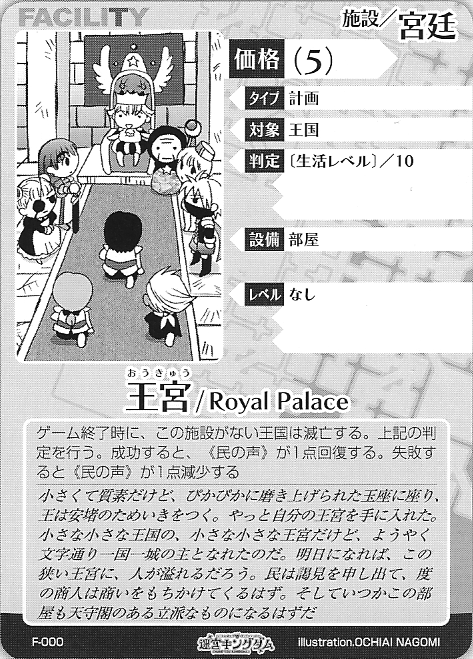
"If a Kingdom does not possess one a {Royal Palace} at the end of a game, that Kingdom is Destroyed." Also, make a Check against your (Quality of Life) to gain 1 <Vox Populi>, or fail it to lose 1 <Vox Populi>.
This Facility must be placed at B-2. This is inviolable. Any other Facilities gained from Environment rolls can be placed at will in any other unoccupied square. Next, assign one Passageway to each room. Passageways are just what they sound like - doors and corridors connecting one room to another. There's no restriction here, but any Facility without a clear path to the Palace is unusable, so be careful of that. Lastly, place an Entrance, another free Passageway leading out from the Kingdom and into the Million Dungeons beyond. This can be placed on the outer edge of any square except B-2; note also that no map can have more than two Entrances at any time. The end result should look something like this, only hopefully not quite so butts:
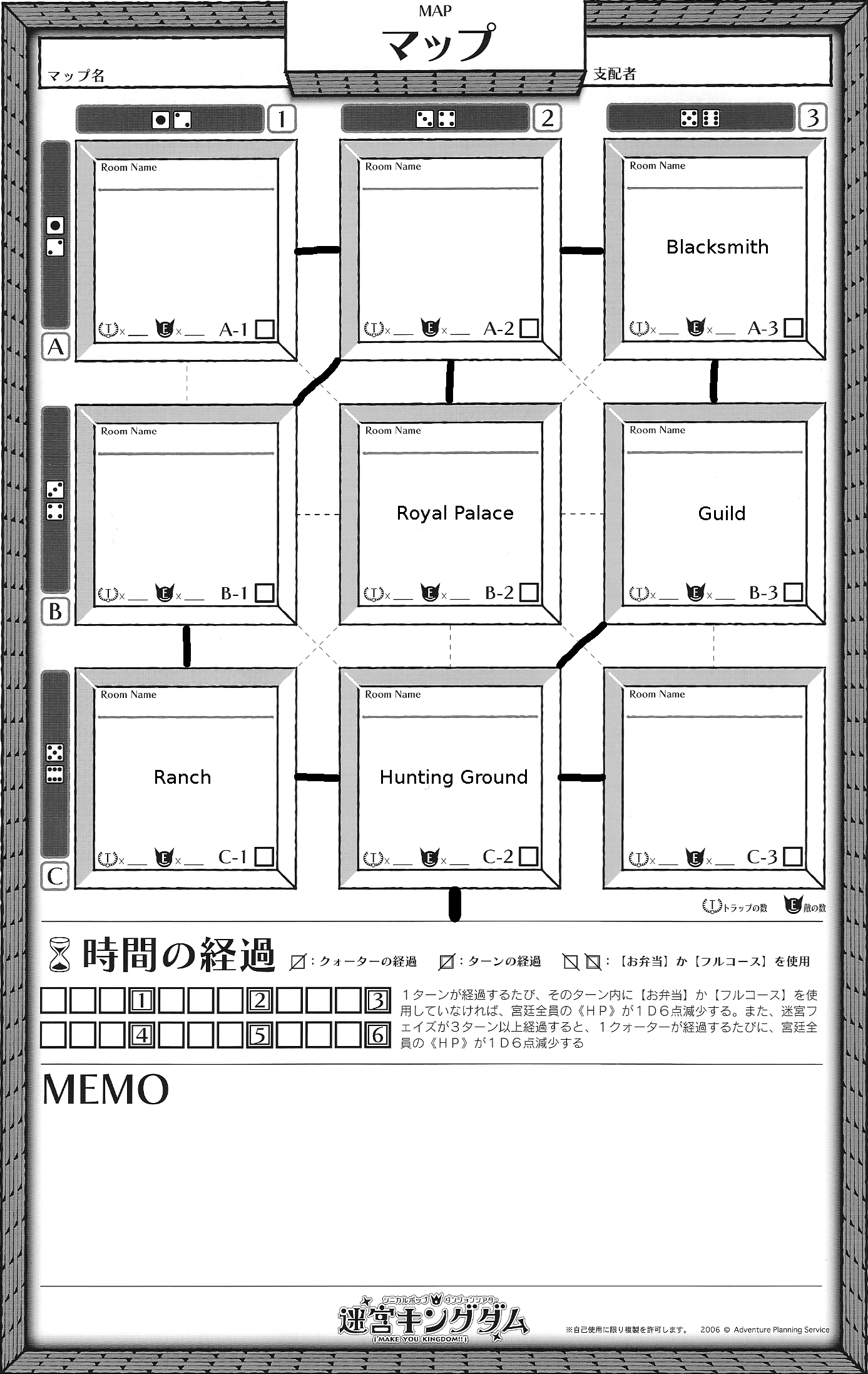
The second part of Geography is determining your Kingdom's place on the Terra Cognita. Just roll 2D6 , declare X and Y, and mark it on the sheet. 5 and 4 puts the Kingdom down in the southeastern quadrant. If any other kingdoms had been generated by an Environment roll, their locations would be rolled for in the same way, but as it is, cat planet is alone in a vast expanse of unexplored territory - Terra Incognita, as the game terms it.
Vox Populi : Mentioned earlier, <Vox Populi> is one of two quantified forms of <Hope> in the game. <Hope>, in one form or the other, is spent to power many Skills, effects, and abilities, making it a major part of the gameplay. We'll get to the other form in the next chapter; for now, know just that <Vox Populi> starts at 10, and cannot go higher than [10 + Kingdom Level] at any time. Also, if the <Vox Populi> ever goes lower than the number of Landmakers in the Court, the Kingdom is destroyed.
Budget : The Kingdom's available funds. Unmodified, you start with 0 MG, but dereku's roll gives you a head-start of 6 MG. How this can be used is another subject that will have to wait a while.
Diplomacy : Again, no other kingdoms were generated by the Environment rolls, and the Court hasn't had the opportunity to discover any yet, so there's not much use for this step here. If there were , however, there'd have to be a 1D6 rolled to determine each one's Relationship with your Kingdom: 1, Allied; 2, Friendly; 3 or 4, Neutral; 5, Strained; 6: Hostile.
And that's it! You should now have a Kingdom Sheet that looks something like this, only hopefully less obviously thrown together in GIMP over the course of a song and a half:
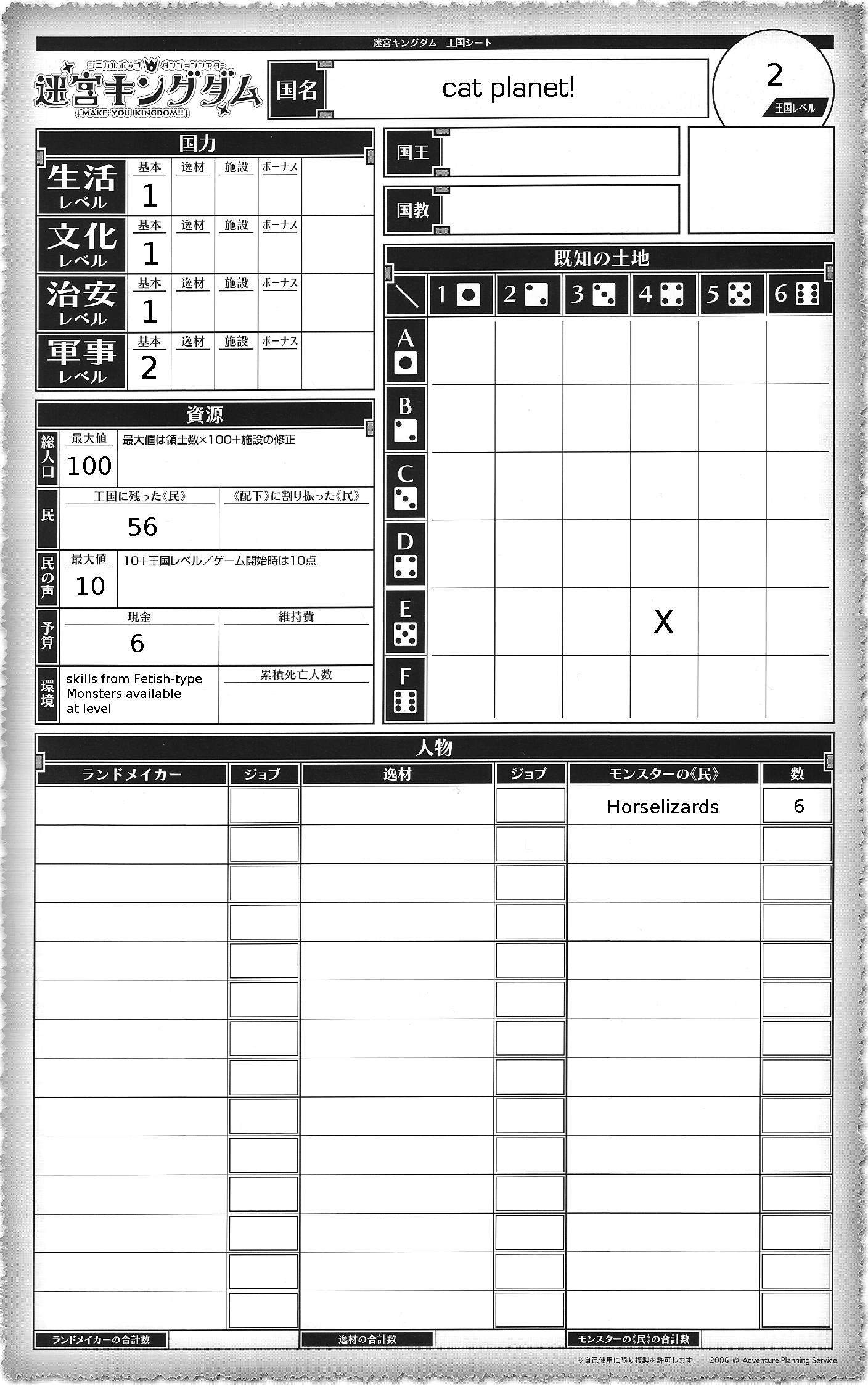
Fuckin' finally! Next time: character creation! This calls for another round of audience participation! I totally undercounted the number of dice required for generating a Kingdom, so to be on the safe side this time, give me a total of 25 d6s each! Limit of five examples, first come first served, but at this rate, I won't be posting in this thread again until sometime next month, so hey, no rush!

Filling Out Forms and Standing In Lines
Original SA post
Cynical-Pop Meikyuu Kingdom Dungeon Theater
Chapter 2.1: Filling Out Forms and Standing In Lines
First thing you're gonna need for making a character is a Character Sheet. Well, you don't need one, I guess, but it sure makes the process go a lot easier.
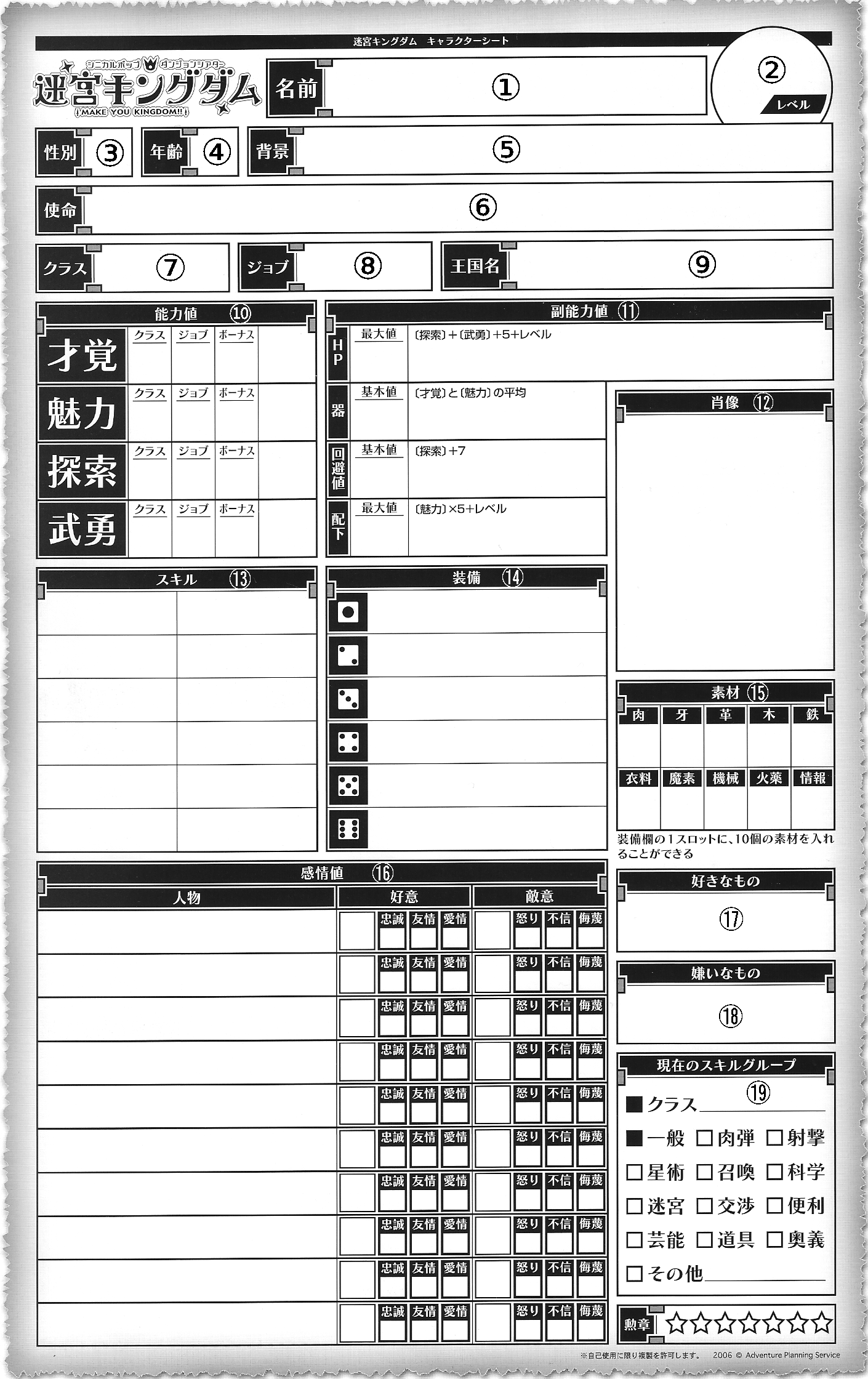
Helpful notations, go!!
① - Character Name. Self-explanatory.
② - Level. Starts at 1, goes up by one every time your Character successfully completes a Scenario. Since the PCs will generally be completing Scenarios as a group, this system keeps everyone even.
③ - Gender. There are a few scattered effects that specify one or the other, but this remains largely an ornamental decision.
④ - Age. Even more ornamental than the last one.
⑤ - Background. Self-explanatory. New players, please use the Background Table. Yes, there's a Background Table coming up. The reason for this is...
⑥ - Mission. Determined by your Background. Complete your Mission, gain a Level.
⑦ - Class. Determines your role within the Court. Ideally, by the time you've been handed one of these sheets, you'll have already figured out between the other players which one you'll be taking.
⑧ - Job. Sort of a sub-Class. Grants one unique Skill and determines which Skill Groups you can choose from when gaining a Level.
⑨ -
⑩ - Stats. Your stats. Determined by your Class. There's four of 'em, from top to bottom: Wit (mental acuity), Charisma (charisma), Adventure (reflexes and perception), and Valor (fightin').
⑪ - Sub-Stats. Other Stats calculated by your other Stats. From top to bottom:
-
HP
- Hit Points, ye ken. Maximum is equal to [(Valor) + (Adventure) + 5 + current Level].
-
Capacity
- Approximates the depth of your Character's mind. Now ain't that a thing? Mechanically, marks the maximum value of your <Drive>. Calculated by [(Wit) + (Charisma) ÷ 2].
-
Evasion
- Dodging shit, yo. Base is equal to [(Adventure) + 7].
-
Staff
- Public service is a big thing in the Million Dungeons, and every good citizen stands ready to brave the world outside in service to their Landmakers.
 Maximum is equal to [(Charisma) * 5 + current Level].
Maximum is equal to [(Charisma) * 5 + current Level].

⑬ - Skills. List the names here, and keep the cards handy. Start out with one Class Skill and your Job Skill.
⑭ - Equipment. You can only carry six items at a time, including anything you find out in the dungeon that you might want to bring back, so choose carefully. Your <Staff> can't help with this because
⑮ - Materials. Component loot from the dungeon, bring back home and craft into useful items. One Equipment slot can hold 10 Materials.
⑯ - Empathy. Tracks your relation with other Characters. Split into two types, which are in turn split between three values each: <Sympathy> (Loyalty, Friendship, Affection) and <Antipathy> (Anger, Mistrust, Contempt). Each value has a hard maximum value of 5. The values are mostly flavor, but the totals have mechanical benefits which will show up later.
⑰ - Likes. These are a few of your favorite things. For RP purposes only.
⑱ - Dislikes. These are a few of your least favorite things. For RP purposes only.
⑲ - Skill Groups. Mark down which Groups are available to your Character here.
⑳ - Medals. At the end of each Session, award one Medal to one Character. How you choose a Character and why are left entirely to the group. Used to qualify for Advanced Jobs. (There wasn't any room on the sheet to actually put the number, but really, there's only one place left
 )
)
There's a flipside to this sheet, too, but it's pretty much packed solid with notes and reminders of rules to be covered in later posts, so I'm omitting it here for clarity. Here's a notation-free one, too, for those what might want one.
The next post's probably gonna be pretty long, so this one's gonna be short. Next time: class in session! I can't wait!
Meet the Court!
Original SA post
Cynical-Pop Meikyuu Kingdom Dungeon Theater
Chapter 2.2: Meet the Court!
First thing you do when making a Character is deciding on a Class. Since each Class has a different role to play in running the Kingdom, this should be done as a group. The only restriction here is that there has to be at least one player with the Royalty Class; aside from that, it's up to what everybody wants to play / what everybody thinks could be fun to try.
Royalty
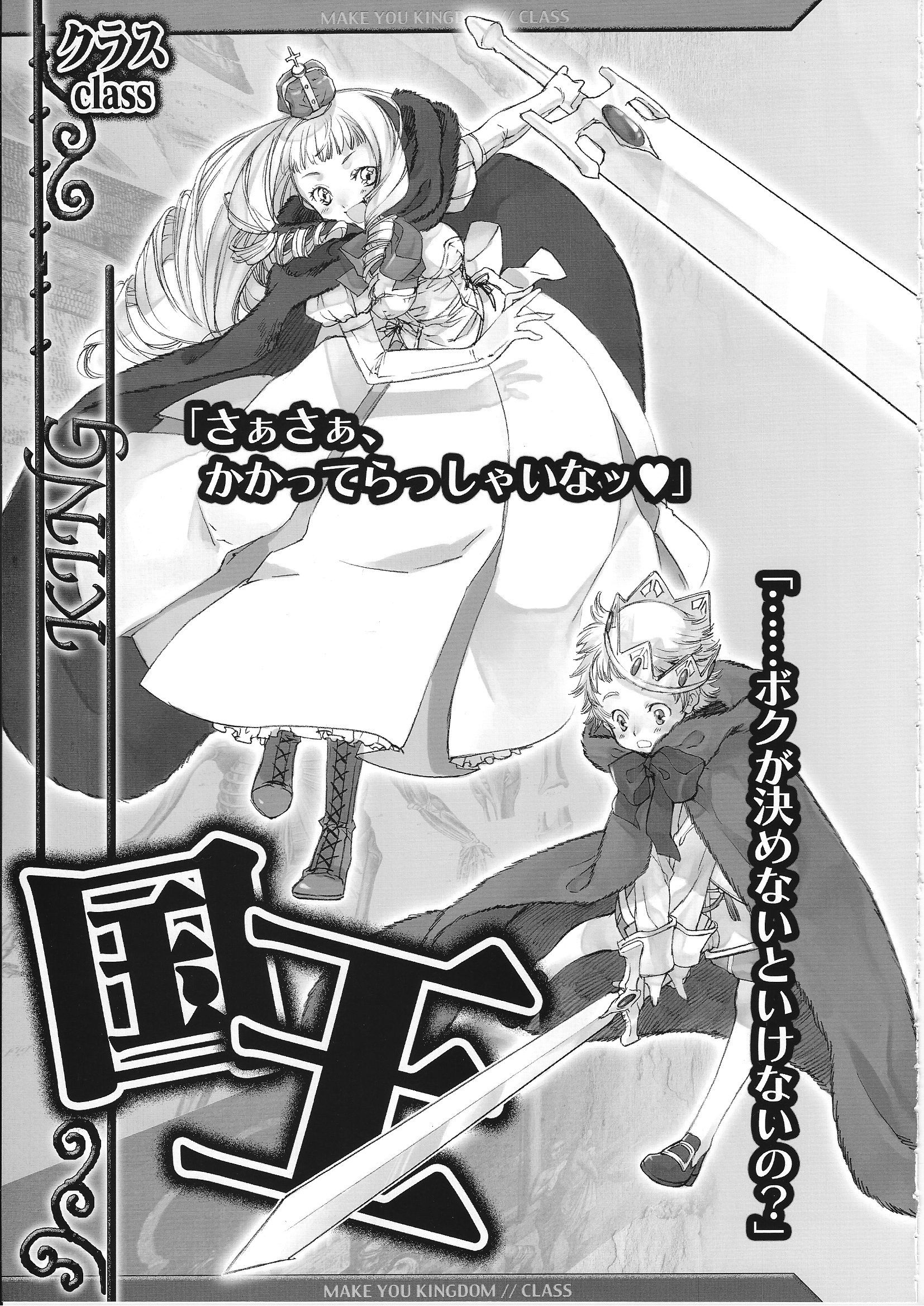
"Aaall right, just leave it to me!" "...do I have to decide it right now?"
Class Stats: 4, 4, 1, 0 free-assignable
Starting Items: {Blade}, {Flag}, {Outfit}
The Big Cheese. Not necessarily actual royalty, just like your Kingdom might not be an actual kingdom, but whatever they are, they're where the buck stops. It's not an autocracy, though (unless it is
 ), every other Class has their own little domain where they're in charge, but Royalty has the final say in case of disputes. They're also tasked with managing the Court's joint resources, like <Vox Populi> and the National Budget. With free-assignable Stats and a variety of Class Skills, you can pretty much write your own game role, too. Note also that while one Royalty Character is required, it's not a limit. If you've got an idea of why your Kingdom might have more than one (succession dispute, for example), figure out which one is responsible for what and run with it.
), every other Class has their own little domain where they're in charge, but Royalty has the final say in case of disputes. They're also tasked with managing the Court's joint resources, like <Vox Populi> and the National Budget. With free-assignable Stats and a variety of Class Skills, you can pretty much write your own game role, too. Note also that while one Royalty Character is required, it's not a limit. If you've got an idea of why your Kingdom might have more than one (succession dispute, for example), figure out which one is responsible for what and run with it.
Class Skills:
-
Royal Command
- (Interrupt, Single) - no Check
Use this Interrupt when another Character spends <Hope> for any reason. Reduce your <HP> by 1 to reduce that <Hope> cost by 1. Cannot be stacked.
-
Hegemony
- (Permanent, Self) - no Check
Use this Skill during the Kingdom Phase. Gain a bonus equal to [the Kingdom's total <Population> ÷ 50], free-assignable to any of your Stats. Recalculate any affected Sub-Stats. This bonus lasts for the remainder of the Session.
-
Royal Guard
- (Permanent, Self) - no Check
While in your Encampment, any allied Characters present have any damage received reduced by [your <Staff> ÷ 5] (minimum of 1).
-
Storm Bringer
- (Permanent, Self) - no Check
Whenever you make a Total Success on an Attack Check, you may add a bonus equal to your <Staff> to your Weapon Strength instead of rolling on the Critical Hit table.
-
Regal Spirit
- (Support, Self) - no Check
Use this Skill when making a Check. Spend 1 <Vox Populi> to substitute your Kingdom's National Power for the Stat being checked.
-
Irresponsible
- (Aid, Special) - (Wit) / 10
Roll against the Kingdom Disaster Table, then make the above Check. If successful, revert any one Spent Character to Ready.
Knight
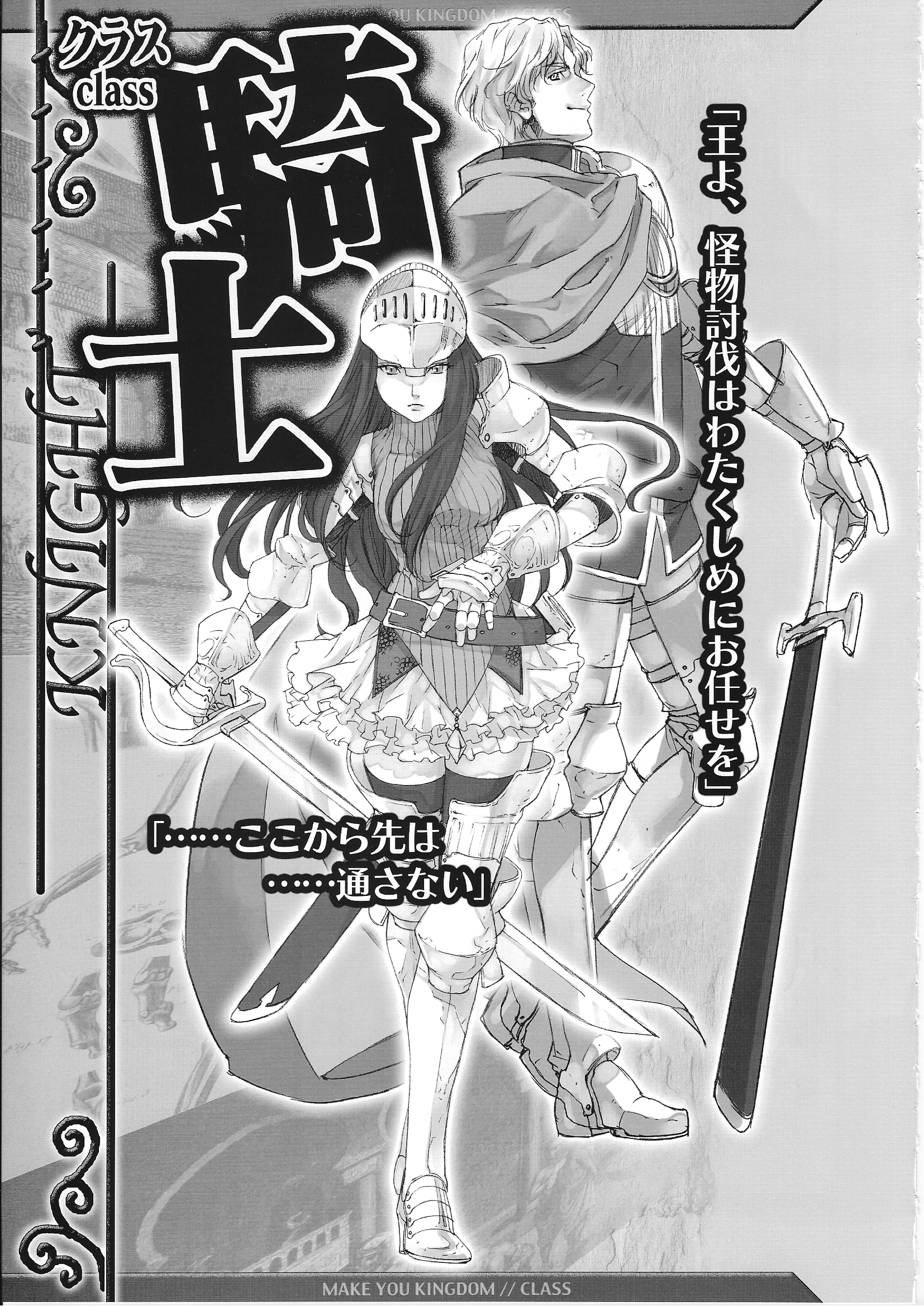
"Stand back, sire, I shall teach these creatures their place!" "This is it...you shall go no further."
Class Stats: 4 Valor; 2, 2, 1 free-assignable
Starting Items: {Blade}, {Armor}, {Mount}
The Kingdom's sword and shield, a Knight's domain is battle. It's up to them who charges forward and who stays back, distribution of equipment, and other such tactical decisions. Accordingly, whoever plays this should have a strong familiarity with the Combat Rules. Also, have a mind for what sort of army you're leading with your <Staff>.
Class Skills:
-
Distinguished Service
- (Permanent, Self) - no Check
At the start of each battle, choose any one Major NPC or Monster. Add 1D6 to your Weapon Strength whenever attacking that Character.
-
Carnage
- (Permanent, Self) - no Check
Use this Skill whenever one of your attacks renders another Character either Unconscious or Dead. You may immediately take another Full Action.
-
Lord of War
- (Permanent, Self) - no Check
Your <Staff> is added to your maximum <HP> (using the <Staff> value as of the last Kingdom Phase, but adding to your current <HP>.)
-
To The Last
- (Interrupt, Single) - no Check
Use this Interrupt whenever any Character takes damage from any source. Subtract 1D6 from your <Staff>. The damage is nullified.
-
Force of Arms
- (Permanent, Self) - no Check
Your Weapon Strength is increased by [<Staff> ÷ 4] points.
-
Guardian
- (Interrupt, Self) - no Check
Use this Interrupt whenever a Character's <Staff> is depleted by any means other than the Character themselves (i.e., for a Skill effect). The effect on the <Staff> is nullified, and you take damage equal to the number of <Staff> that would have otherwise been lost.
Vizier
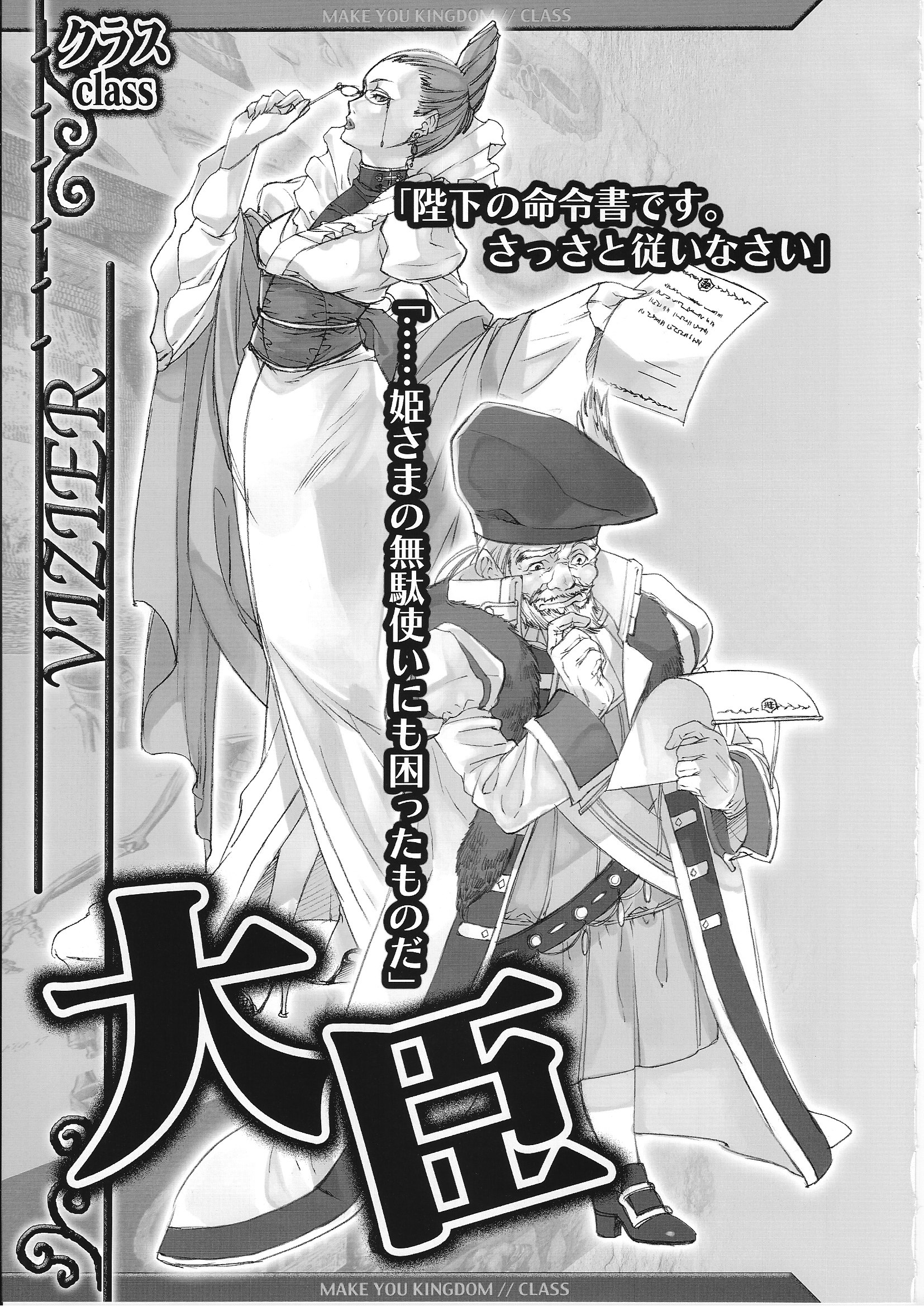
"These orders come direct from His Majesty. See they are carried out at once." "Hrm...the princess' wasteful spending is still a concern.
Class Stats: 4 Wit; 2, 2, 1 free-assignable
Starting Items: {Dagger}, {Census Book}, {Mobile Phone}
The Kingdom's chief administrator. Matters of diplomacy and finance are their domain. Not the flashiest of roles, if we're honest, but an indispensable one.
Class Skills:
-
Levy
- (Interrupt, Court) - no Check
Use this Interrupt after a Total Failure is made on a Check roll. The target may spend any number of <Vox Populi>, then reroll the Check using the same number of dice.
-
Domestic Politics
- (Support, Self) - no Check
Use this Skill when using your Kingdom's National Power as part of a Check. Spend 1 <Hope> to substitute one of your Stats in place of the National Power.
-
Diplomacy
- (Interrupt, Special) - see text for Check
Use this Interrupt at any time. On a successful (Wit) Check, one of your Kingdom's existing Relations becomes Friendly. The Check Difficulty is determined by the target's current Relation level: Friendly, 10; Neutral, 13; Strained, 16. For each point of difficulty, 1 MG must be spent out of the Kingdom's Budget. This effect is permanent, and does not expire at the end of the game.
-
Resupply
- (Aid, Special) - (Wit) / 9
Use this Skill while in your Encampment. Discard any 1D6 Materials, and select 3 Characters. On a successful Check, each of those Characters regains <HP> equal to [your current <Staff> ÷ 4].
-
Messenger
- (Permanent, Court) - no Check
Use this Skill while in your Encampment. Subtract 1D6 from your <Staff>, and add that number to the AV of your next Tactical Check.
-
Rescue
- (Plan, Court) - (Wit) / 11
Use this Skill during the Dungeon Phase. On a successful Check, you can spend 1 <Hope> to acquire a number of <Citizens> equal to [your current <Staff> ÷ 4]. These <Citizens> may be organized freely.
Priest
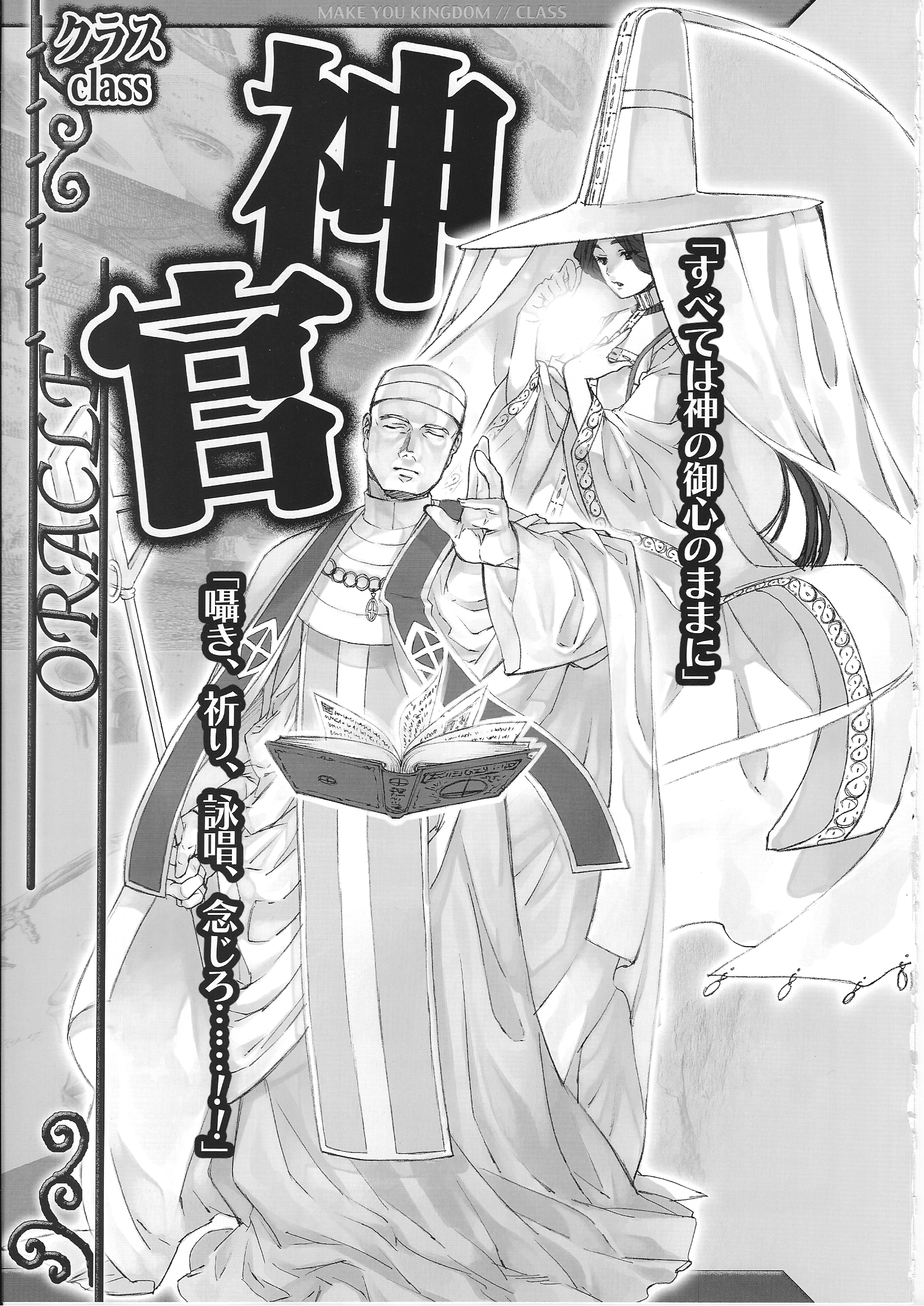
"All are as one in the eyes of God." "Murmur... chant... pray... invoke!" 1
Class Stats: Charisma 4; 2, 2, 1 free-assignable
Starting Items: {Hammer}, {Liquor}, {Amulet}
The Kingdom's soul. State Religion may not have any mechanical use, but it's one big source of flavor. What sort of god or gods are being followed sets the tone for the whole rest of the kingdom. In-game, they are, as you would expect, the Court's major source of healing in the dungeon. What you probably didn't expect is that they're also about the only way to expand your Kingdom beyond the Grand Zero, so while it's not required to have one around, it's a pretty damn good idea.
Class Skills:
-
Prayer
- (Interrupt, Any) - no Check
This Skill may be used at any time. Select any present Characters you wish. Spend any number of <Hope> points, then divide the spent points between the selected Characters. For each assigned <Hope> point, each selected Character regains [1D6 + total <Sympathy> with target] <HP>.
-
Turn Undead
- (Aid, Single) - (Charisma) / 7 + target Monster's Level
Spend 1 <Hope> and select an Undead-type Monster. On a successful Check, this Monster takes 2D6 damage.
-
Sermon
- (Aid, Court) - no Check
Spend any number of <Hope> points. For each spent <Hope> point, each member of your Court regains [1D6 + your current <Staff> ÷ 5] <HP>.
-
Sacrifice
- (Aid, Self) - no Check
Reduce your <Staff> by 1D6, and remove one Common Item in your possession from the game. Your Court can now use an {Elevator} if one is present in the room.
-
Divine Wrath
- (Aid, Self) - (Charisma) / 10
Spend 1 <Hope>, and make the above Check. If successful, select any 1 Character in the same Area. That Character takes [3D6 + your current <Staff> ÷ 5] damage.
-
Enlightenment
- (Permanent, Self) - no Check
Add a bonus equal to [your current <Staff> ÷ 5] to the AV of any Negotiation Skill Check being made by another Character.
Ninja
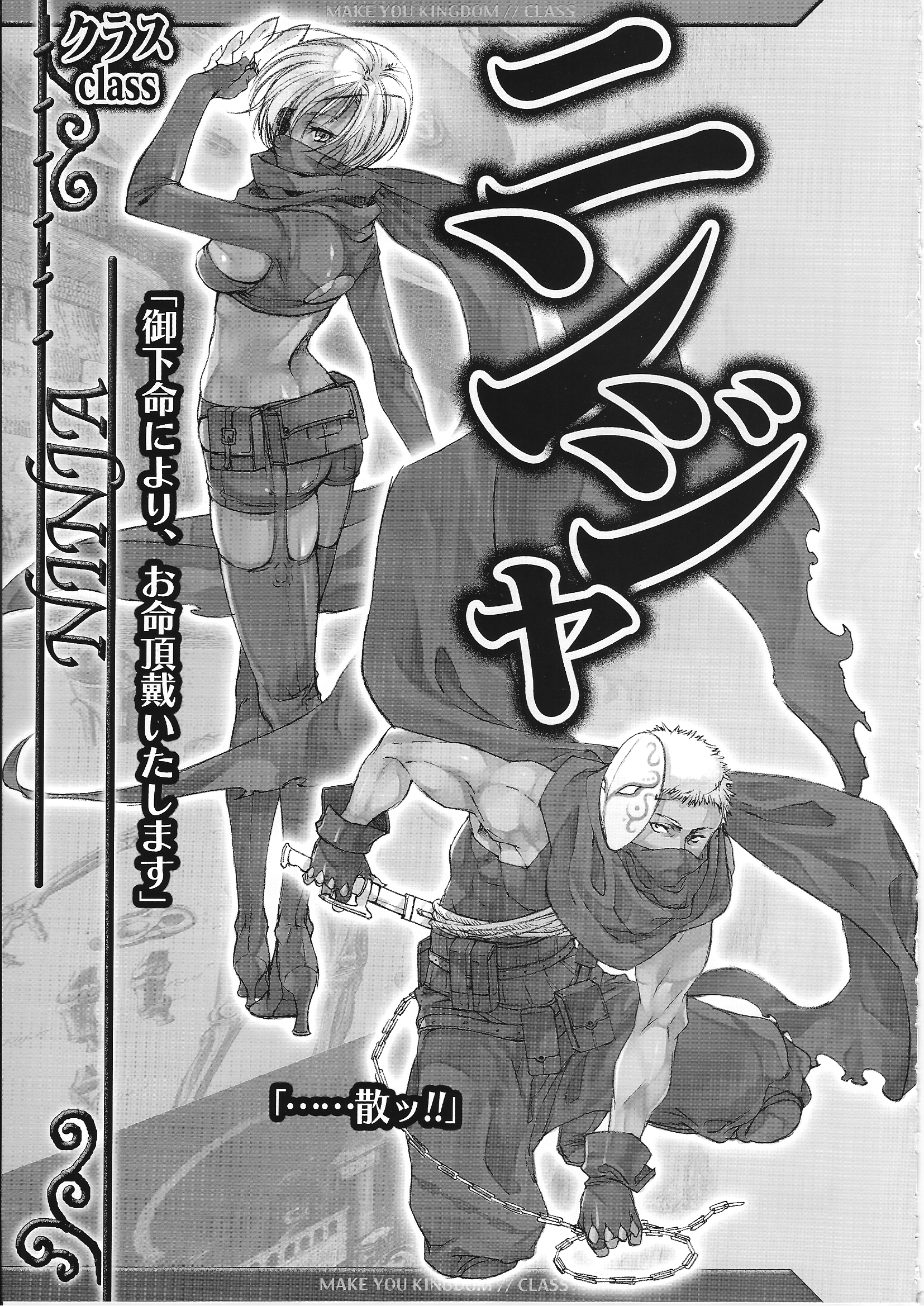
"My very life is at your command." "--VANISH!!
Class Stats: Adventure 4; 2, 2, 1 free-assignable
Starting Items: {Shuriken}, {Star Fragment}, {Pet}
The Kingdom's secret eyes.
 Scouting ahead in the dungeon and disarming Traps are their primary roles, but their high <Evasion> also suits penetrating the enemy's line in combat. The book makes another "what sort of <Staff> have you got" suggestion, but the example given is between Koga and Neguro ninja, which... doesn't help me at all, anyway.
Scouting ahead in the dungeon and disarming Traps are their primary roles, but their high <Evasion> also suits penetrating the enemy's line in combat. The book makes another "what sort of <Staff> have you got" suggestion, but the example given is between Koga and Neguro ninja, which... doesn't help me at all, anyway.
Class Skills:
-
Shadow Clone
- (Interrupt, Self) - no Check
This Skill may be used at any time. Reduce your <HP> by 1D6. You can reuse any one Aid or Interrupt Skill you've already used this Cycle.
-
Shinobi Army
- (Interrupt, Self) - no Check
Use this Skill when a Trap or Base effect is triggered. Subtract 1D6 from your <Staff>. The Trap or Base's effect is nullified (if it's a Permanent effect, it is only nullified for the current Cycle).
-
Disruption
- (Interrupt, Single) - no Check
Use this Skill when any other Character takes damage. Spend 1 <Hope>. All damage taken by that Character is reduced by [1D6 + your total <Sympathy> for them] for the remainder of this Cycle.
-
Spy
- (Support, Self) - no Check
Use this Skill alongside a Command Check to Gather Information. Increase the Difficulty by as many levels as you like. If the Check passes, learn a number of Monster names and/or Traps in the room equal to the number of chosen levels (which Monsters and/or Traps are revealed is left to the GM's discretion).
-
Puppet Master
- (Aid, Self) - no Check
Subtract 1D6 from your <Staff>, and select a Character. Any one Permanent-type Skill that Character possesses has no effect until the beginning of the next Cycle.
-
Phantasma
- (Permanent, Self) - no Check
While in combat, if there are no allied Characters in the same Area as you, your <Evasion> is increased by [your current <Staff> ÷ 5].
Servant
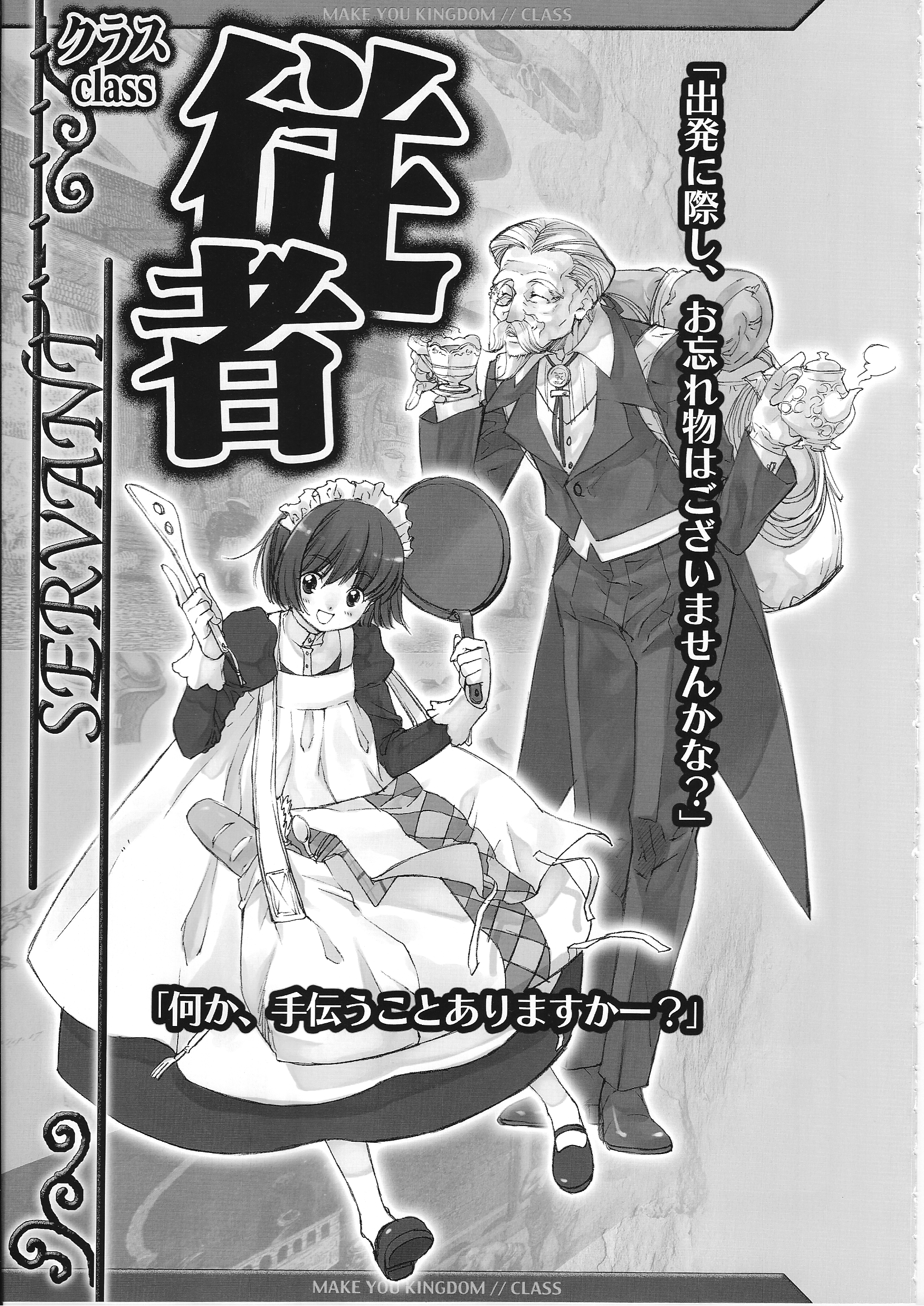
"I always worry I've left something behind when setting off." "Anything I can do for you, then?"
Class Stats: All 2
Starting Items: {Spear}, {Backpack}, {Box Lunch}, {Instrument}
The Court's backbone. You can choose who is your actual master/mistress (it doesn't even necessarily have to be one of the other players, either), but at the end of the day, your role is to bolster the Court as a whole. Also, while the basic template is one of butler/maid, there are other sorts of Servants: squires to a Knight, secretaries to a Vizier, acolytes to a Priest, chuunin to a Ninja. Use your imagination, dammit.
Class Skills:
-
Assist
- (Support, Single) - no Check
Use this Skill at any time. Transfer 1 <Drive> from yourself to any other Character.
-
Preparation
- (Interrupt, Single) - no Check
Select any one Character from your Court. This Character can spend 1 <Hope> to perform a single Kingdom Phase action. This effect can only be used once per Session.
-
Cheerleading Squad
- (Aid, Single) - no Check
Use this Skill while in your Encampment. Spend 1 <Hope> and select a Character. That Character gains a bonus to their next Check equal to [your current <Staff> ÷ 5].
-
Devotion
- (Support, Self) - no Check
Use this Skill when making a Co-Operative Action. The bonus added to the target's AV is equal to [your total <Sympathy> for them + 2].
-
Master
- (Permanent, Self) - no Check
When taking this Skill, select any one Character from your Court. Whenever this Character makes a Total Success, gain 1 <Drive>.
-
Suicide Run
- (Support, Self) - no Check
Use this Skill when attacking. Subtract 2D6 from your <HP>, and add that same number to your Weapon Strength.
For simplicity's sake, I'm making the example Court from one of each Class. However, I didn't realize until after I'd done it that the randomizer I used to match up the Audience Participation rolls didn't actually save the output at all, so you're just going to have to take my word for it that it came up like this:
-
JohnOfOrdo3 - Royalty
dereku - Knight
Everything Counts - Vizier
Ryuujin - Priest
Mr. Maltose - Ninja
goatface - Servant
Next time: obscure sayings and troubled pasts! I can't wait!
1 - In case you were wondering, no, this is not the last reference to Wizardry we're going to see in this game. As a bonus, the original English name for "Suicide Run" was "Ogg". If you get that joke without Googling it, well, you're a goonier man than I, Goonga Din.
What's In A (Second) Name?
Original SA post
Cynical-Pop Meikyuu Kingdom Dungeon Theater
Chapter 2.3: What's In A (Second) Name?
Got your Classes hashed out, now it's time to actually make the character! First step is a name. No real restrictions here, but just in case you get stuck, the book "helpfully" provides a set of tables for you to roll one up! I put "helpfully" in quotes because... well... maybe I'd better just show you.
The first thing you do is roll a single 1D6, the result of which tells you which of the actual tables you'll be rolling on for your name:
-
1: Name A + Second Name A
2: Name B + Second Name A
3: Exotic Name + Second Name A
4: Name A + Second Name B
5: Name B + Second Name A
6: Fantastic Name + Second Name B
Each of the main tables takes a D66, with each result on the primary Name Tables has two options, male and female, and each table following a general trend. "Name A" and "Name B" both draw on the stereotype of Japanese fantasy naming: foreign words chosen at random because they sound neat. "Exotic Names" are much the same, only weirder. "Fantastic Names" are a grab-bag mix of mythological and literary references. Summarizing doesn't really do them justice, so here they are in full:
pre:
Name A 11: Orange / Jasmine 23: Bamboo / Olive 36: Tuba / Organ 12: Lanternflower / Morningglory 24: Cloud / Climate 44: Naan / Cookie 13: Clover / Thornapple 25: Tao / Snow 45: Willow / Cache-cache 14: Daphne / Mushroom 26: Avalanche / Eclair 46: Scone / Couscous 15: Granada / Primrose 33: Vivacita / Metronome 55: Flask / Clip 16: Radish / Marigold 34: Canon / Bassoon 56: Clavadora / Crayon 22: Cypress / Magnolia 35: Oboe / Harmonica 66: Soap / Broom
pre:
Name B 11: Age / Wednesday 23: Schwarz / Moegi 36: Zippo / Chocolat 12: Giorno / Noel 24: Slot / Kirie 44: Ninepins / Lucha 13: Dusk / Mañana 25: Joker / Dice 45: Decathlon / Lacrosse 14: Winter / Juno 26: Jigsaw / Domino 46: Kabaddi / Pingpong 15: Hiran / Bianca 33: Backgammon / Marbles 55: Pound / Velvet 16: Walnut / Rouge 34: Cigaro / Cocoa 56: Ruble / Cotton 22: Grey / Scarlet 35: Spichka / Orange-pekoe 66: Schilling / Silk
pre:
Exotic Name 11: Moai / Cyrstalskull 23: Gogh / Victoria 36: any star 12: Chupacabra / Mbembe 24: Zombie / Onyankopon 44: any weapon 13: Kungfu / Yinyang 25: Getuppah / Carmen 45: any animal 14: Bushido / Miyako 26: Overkill / Sashimi 46: any jewel 15: Champion / Barbie 33: Butcher / Devi 55: any word + Dragon 16: Upanishad / Sorge 34: Bronson / Madonna 56: roll on any Word Table 22: Deathmarch / Intel 35: Gygax / Eroica 66: your name
pre:
Fantastic Name 11: Adam / Eve 23: Maharaja / Krishna 36: Xanadu / Yomi 12: Jack / Momo 24: Kageotoko / Kurotokage 44: Albion / Laputa 13: Oz / Alice 25: Orpheus / Venus 45: Xenda / Gormenghast 14: Conan / Leda 26: Solomon / Salome 46: Innsmouth / Ys 15: Arthur / Isis 33: Watarigarasu / Deedlit 55: Fuunuimu / Yapoo 16: Elric / Glorianna 34: Nyarlathotep / Bast 56: Xanth / Narnia 22: Gilgamesh / Amaterasu 35: Annatar / Fortuna 66: Kalevala / Ihatovo
-
JohnOfOrdo3 - Kabaddi / Pingpong
dereku - Tuba / Organ
Everything Counts - Giorno / Noel
Ryuujin - Avalanche / Eclair
Mr. Maltose - Bamboo / Olive
goatface - Canon / Bassoon
All clear? I hope so. Because it's about to get stranger still.
"Second Names"... I honestly have no solid idea what the fuck these are supposed to represent. Kotobank defines the term basically as "a name one is called aside from their actual name", which makes it synonymous with "nickname" or "alias". So it should be simple, except that all of the "Second Names" provided are actually aphorisms and proverbs, a lot of which could only marginally be considered descriptive. Listing all of these would necessitate explaining their meanings and take way too much space, so I'll just stick to the rolled examples:
-
JohnOfOrdo3 -
nodo kara te ga deru
, "a hand from the throat"; an impossible request; asking for the moon.
dereku - ryoute ni hana no , "flowers in both hands"; doubly blessed; alternately, to have a pretty woman on each arm.
Everything Counts - tora no o o fumu , "stepping on a tiger's tail"; walking fearlessly into danger.
Ryuujin - ishibashi o tataite wataru , "strike the stone bridge as you cross it"; take nothing for granted; one can never be too cautious.
Mr. Maltose - kaze ni yanagi no , "like a willow in the wind"; flexible.
goatface - doragon mo hadashi de nigedasu , "even dragons flee barefoot"; a fearsome reputation.
Sooo... names? I got nothing. You figure it out.
Next time: the rest of character creation! I can't wait!
Fiancee (Again)
Original SA post
Cynical-Pop Meikyuu Kingdom Dungeon Theater
Chapter 2.4: Fiancee (Again)
Backgrounds! Those are always important! They give your character motivation, and provide possible plot hooks for future campaigning. In Meikyuu Kingdom , though, this is actually backed up by the game mechanics. Every Background must include a Mission: some long-term goal for your character to fulfill as a Landmaker, inspired by their past. (For the most part, these Missions are entirely driven and fulfilled by the players' actions, but there are still a handful that require a bit of GM fiat to see through.) When they complete their Mission during an adventure, your character gains a Level at the next Ending Phase of play; this Level not only stacks with the Level you'd usually gain for successfully completing a Scenario (assuming you did so, of course), but it's exempt from the Kingdom Level cap! So essentially, the maximum Character Level for a character who has completed their Mission is [Kingdom Level + 1]. Neat, huh?
Now, as with most things in this chapter, Backgrounds have a series of tables for random generation. Unlike most things in this chapter, though, the book explicitly INSISTS that newbies use said tables for their characters; only once you've played a few times and have a good feel for how the game works are you officially clear to make up your own. The setup for the Background Tables is a variation on the standard D66: instead of rolling both dice simultaneously and counting the lowest rolled number as the "tens" digit, roll them separately and take the first die as the "tens". The reason for this is most likely the significant increase in the number of available options.
Time for examples!
JohnOfOrdo3 posted:
1.3: You originally came to this Kingdom seeking asylum from a neighboring Kingdom. Randomly select a square of Terra Incognita from the map on your Kingdom Sheet; this is the site of your home country. Decide on a name for it, and mark its Relation on the Sheet as <Strained>. Your Mission is to raise your Kingdom's Relation with your home's to <Allied>.
 The king's a foreigner! But instead of producing a birth certificate, his Mission is to make peace with his homeland. Rolling additional dice along the X and Y axes of
the Kingdom Sheet's Terra Incognita map
, he gets 6 and 1, placing it in the southwest corner of the region, further rolling generating its name as the "New Adventure Alliance". C'mon and grab your friends.
The king's a foreigner! But instead of producing a birth certificate, his Mission is to make peace with his homeland. Rolling additional dice along the X and Y axes of
the Kingdom Sheet's Terra Incognita map
, he gets 6 and 1, placing it in the southwest corner of the region, further rolling generating its name as the "New Adventure Alliance". C'mon and grab your friends.
dereku posted:
4.5: You are a spy for one of the Great Powers. Roll a 1D6 to determine your home nation: 1, the Dynamite Empire; 2, the Millennium Dynasty; 3, the Metro Khanate; 4, the Capitalist People's Republic of Hagulma; 5 or 6, roll again. Naturally, this is a secret from the rest of the Court, but your purpose is not exactly malicious. Your Mission is to maneuver the Kingdom into becoming a Vassal State of your home nation.
So the king's from out of town and the head of the military is a spy? This kingdom's off to a great start. dereku's next roll is a 6, so they reroll and get a 1. The Dynamite Kingdom has sent him to tell everyone how awesome they are, and convince them that they could be even more awesome together. Well, guess that doesn't sound so bad.
Everything Counts posted:
6.6: You were the slave of a monster or Tyrant (Dungeon Book, p. 64). Select one other character from your Court. This character freed you, and in return, you have sworn your loyalty to them. Start with 1 point of “Loyalty” <Sympathy> with this Character. Your Mission is to die for this Character while possessing at least 1 point of <Sympathy> for them. Whether or not your death was “for” them is at the GM's discretion.
Woo, yeah... this one's kinda tricky. Naturally, with this being a fantasy setting, death isn't necessarily permanent, but still, most deaths occur in combat, and Politicians typically aren't typically built for running into melee range. On the other hand, this also means they trend heavily towards the "squishy" side of the HP scale, so maybe if they just time it right... er, but that's getting way ahead of things. The text doesn't require random selection of the character, so unless EC has their own idea, the first unused roll of theirs is a 4, which comes out to Ryuujin's Priest on my Everyone But That Guy Table. Hmm... this could be interesting (Incidentally, a Tyrant is basically a Landmaker who's gone insane and started ruling over a patch of wild dungeon with an iron fist. Anyone who wanders through is taken prisoner and forced to play along.)
Ryuujin posted:
1.1: For whatever reason, your parents abandoned you, and you spent your early childhood in the dungeons. This experience inspires you to seek out a partner with whom to make your own family, and make it right. Your Mission is to establish a <Empathy> Status of <Lover> with another Character.
Empathy Statuses, which I don't believe I've covered, are attained by maxing out one of the three Sympathy sub-types: Affection, Loyalty, and Friendship. <Lover>, as you might guess, requires full points in Affection. There'll be more detail on what these Statuses actually mean in a later chapter. All that concerns us right now is that Ryuujin's looking to start a family. They don't have to pick any particular Character for this; they could even have several pokers in the fire, so to speak. Still, might make for some good RPing if they went for someone close at hand... someone showing them a bit of Loyalty, perhaps... wink wink nudge nudge

Mr. Maltose posted:
5.5: You can barely restrain your lust for battle. The world is gray to you, only bursting into color for the instant when you take a life. Your mission is to get the killing blow on 100 Monsters.
 Well. That's certainly... rather... straightforward. Works out fairly well for a Ninja, too. Might be kind of awkward rolling something like this up for a Politician or a Servant, unless you're looking for a challenge, I suppose. Anyway, not much to say about this one, so let's move on.
Well. That's certainly... rather... straightforward. Works out fairly well for a Ninja, too. Might be kind of awkward rolling something like this up for a Politician or a Servant, unless you're looking for a challenge, I suppose. Anyway, not much to say about this one, so let's move on.
goatface posted:
4.2: A rival Kingdom is holding your family hostage and forcing you to act as a spy for them, sowing confusion and passing back whatever information they require. Randomly select a square of Terra Incognita from the map on your Kingdom Sheet; this is the site of the enemy country. Decide on a name for it, and mark its Relation on the Sheet as <Strained>. Your Mission is to establish an <Empathy> Status of <Rival> with another character in your Court.
Great! Another freaking spy! And this one's actually trouble!
 Still, it's not really their fault. <Rival> is the sole exception to the Sympathy monopoly on Empathy Statuses, being attained by maxing out one of the Antipathy sub-types while having at least one point of Sympathy for the same character; maybe they could team up later for a rescue mission, just like in that one Bruce Willis movie! Random kingdom generation puts goatface's parents/siblings/whatever in "The Third Demon City", at map point 2x4, just a couple spaces north of Kitty Planet.
Still, it's not really their fault. <Rival> is the sole exception to the Sympathy monopoly on Empathy Statuses, being attained by maxing out one of the Antipathy sub-types while having at least one point of Sympathy for the same character; maybe they could team up later for a rescue mission, just like in that one Bruce Willis movie! Random kingdom generation puts goatface's parents/siblings/whatever in "The Third Demon City", at map point 2x4, just a couple spaces north of Kitty Planet.
Next step: Jobs! Apparently, you're born a Landmaker, but you don't actually realize it for a while, kind of like the X-Men . Since life is lived pretty much universally at the subsistence level, everybody's got to pull their own weight. Jobs are handed down through family units, so before you rose to power as a Landmaker, there was something that occupied your waking hours, and the skills you learned from that Job will stick with you forever. Each Job also gives a permanent +1 bonus to one of your Ability Scores, which is quite handy. A detailed listing of the basic Jobs and their attendant Skills will take up my next post (or possibly two, there's rather a few of them), so for now, I'll just leave this here:
-
JohnOfOrdo3 - Astrologist (Charisma)
dereku - Adventurer (Adventure
 )
)
Everything Counts - Aristocrat (Charisma)
Ryuujin - Professor (Wit)
Mr. Maltose - Magician (Wit)
goatface - Chef (Adventure), Happymancer (Charisma)
Oh, Servants get two Jobs. Did I forget to mention that? Well, they do. It's a balancing mechanic, mostly, since they have such average stats in everything by default.
So now that you've got all your Abilities added up and your Sub-Stats accordingly calculated, what's left? Well, you still have to pick a Class Skill and mark down the starting Skill from your Job. Then, figure out your starting equipment. You've got a pool of Common Items to choose from, combined from the listings on your Class and your Job. You can only have up to six items in your inventory at a time, so anything you don't want or don't have room for can be passed to someone else; any unclaimed Items once the dust has settled are discarded. However, if you find yourself with room to spare, there's a quick 2D6 table you can roll on for some free general-purpose loot. Then, write down the names of the other members of your Court in the Acquaintances column of your Character Sheet, select one person from that list, and give yourself one point of <Sympathy> for them (sub-type chosen at random).
The last step is another one that's a bit unusual: Likes and Dislikes. Every character has two of each, determined by rolling D66 on each of the four Word Tables, which, as the name implies, are all made up of a bunch of words; the results are then assigned at will between the Likes and Dislikes entries. Note that these are purely for role-playing purposes - a Chef who dislikes cooking will suffer no penalty, nor will a Knight who likes martial arts enjoy a bonus.
-
JohnOfOrdo3 - Darkness, War, Dungeons, Other species
dereku - Fiancee, Royalty, Fireworks, Daydreams
Everything Counts - Fiancee (again), Futility, Tradition, Medicine
Ryuujin - Dressing up, Numbers, Tradition, Adventures
Mr. Maltose - Staying up late, Getting up early (how symmetrical
 ), Meddling, Monsters
), Meddling, Monsters
goatface - Fiancee (again), Haircuts, Cooking, Crime
That's pretty much it for creating a character in Meikyuu Kingdom ! Next time: a big ol' bastard list of employment opportunities! I can't wait!
Gainful Employment
Original SA post
Cynical-Pop Meikyuu Kingdom Dungeon Theater
Chapter 2.5: Gainful Employment
Jobs! Everybody's got (at least) one! But I already explained all that. So what do you get out of them?
-
Ability
: Permanent +1 bonus to the Job's primary stat.
Skill Groups : Whenever you gain a Level, you choose a new Skill, either from your Class or one of your Job's available Skill Groups.
Equipment : A couple of items to start your Landmaking career.
Prodigy Effect : Prodigies are a special type of Citizen, representing people who possess some singular ability or demonstrate exceptional skill in their profession. Any Prodigy who has stayed in the Kingdom for at least one full game may be tapped at will by the Court for their "Prodigy Effect", which generally amounts to an extra Skill. The number of Prodigy Effects that may be activated over the course of a game is capped by the Kingdom's Cultural Level.
Job Skill : Some unique ability you picked up from your pre-Landmaking years. Obtained free at character creation and only ever lost if you change Jobs somehow.
Enough with that list. On with the list!
Astrologist
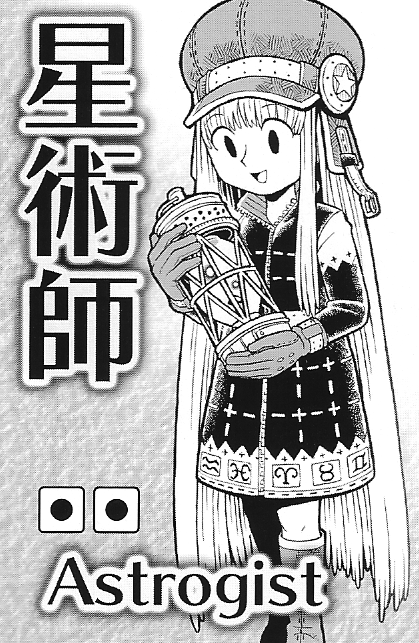
I know why the caged star sings...
In the Million Dungeons, Astrologists don't just read stars, they converse with them. Somehow, this allows them to influence the weather and improve agricultural harvests, because "star" seems to mean something different in this game than it does in your average dictionary. For one thing, they're apparently sentient.

-
Ability
: Charisma
Skill Groups : Astrology
Equipment : Star Fragment x2
Prodigy Effect : (Aid) This ability can only be used if your Kingdom has a {Farm}. Increase your Kingdom's Budget by 1 MG.
Voice of the Stars - (Permanent, Self) - no Check
You may count each individual Star Fragment in your inventory as additional <Staff> or <Hope>. These Star Fragments do not count towards your maximum <Staff> or <Capacity>. You may treat this Skill as an Astrology Skill.
Magician
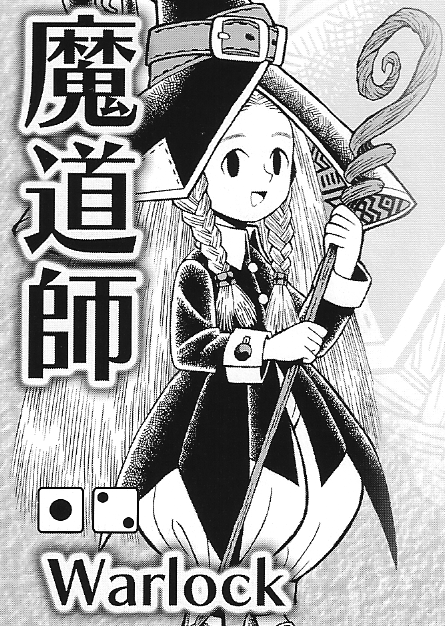
cuteness supremacy
Astrology, Summoning and Science are collectively referred to as "the Three Great Magics". Magicians dabble a bit in all three. However, since the Dungeon Hazard is widely believed to have been caused by an ancient magical experiment gone wrong, the practice of magic is frowned upon in many kingdoms and even actively oppressed in others. Recent generations have begun to shake off this prejudice, however, and it's no longer quite so unusual to find open practitioners holding office.
-
Ability
: Wit
Skill Groups : Astrology, Summoning, Science
Equipment : Grimoire
Prodigy Effect : (Permanent) When Information Gathering during the Kingdom Phase, add 1 to the AV.
Ritual - (Support, Single) - (Wit) / 9
Select any 1 non-Permanent Skill known by a character with whom you have at least 1 point of Empathy. On a successful Check, you learn this Skill temporarily. Any time afterward, you can use its effect as printed by spending 1 <Hope>. Skills learned in this way are forgotten after one use, or replaced when learning a new one.
Summoner
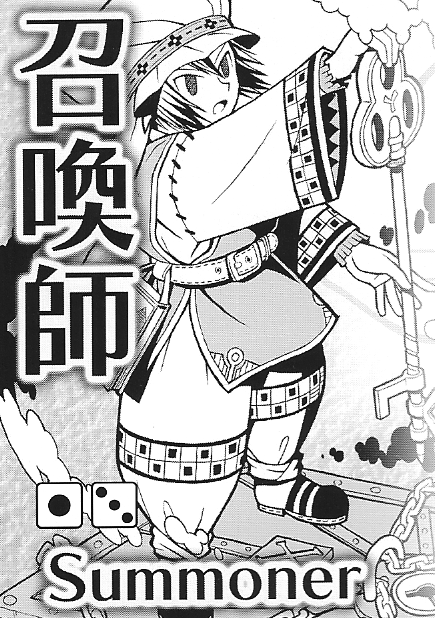
"Kingdom Hearts is light!"
Transport matter across great distances through the use of key-shaped implements called "Unchains". Cool, huh?
-
Ability
: Charisma
Skill Groups : Summoning
Equipment : Familiar
Prodigy Effect : (Aid) Can be used at any time. Randomly select a Rare Item category, and then an Item within that category. The GM must then place the generated Item in a randomly chosen room in the current adventure map (hidden from the PCs, of course). The first PC to make a successful Search Check in that room acquires the Item.
Minor Shift - (Support, Single) - (Charisma) / target's Level + 7
While in combat, select any 1 Character. On a successful Check, you can spend 1 (Hope) to move that Character to an Area of your choosing.
Professor
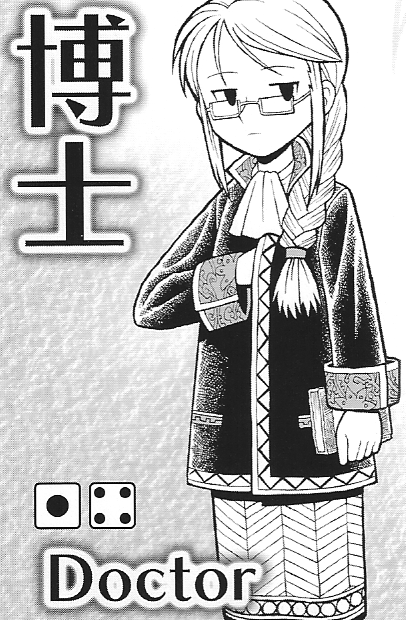
"Remember, I know more than you."
Of the Three Great Magics, Science is a relatively new arrival. Adherents preach rationalism and experimentation above all, huffily disdaining any "fluctuations" which they cannot presently explain... such as Astrology, Summoning, or the Dungeon Hazard. Still, the advent of Science has advanced the understanding of more mundane matters considerably in recent years, making it the fastest growing of the Great Magics.
-
Ability
: Wit
Skill Groups : Science
Equipment : Glasses, Trap Encyclopedia
Prodigy Effect : (Plan) During your Kingdom Phase, you may change this Prodigy's Job to that of one of the PCs or that
of one of your other Prodigies. If you do, then change his Prodigy Effect to that of the new Job as well.
Monsterology - (Support, Court) - (Wit) / 9
While in combat, select any 1 Monster on the Battlefield, and make the check above. On a success, every Character in your Court gains a +1 bonus to their Hit Checks and Weapon Strength when targeting that Monster. This effect does not stack.
Medic
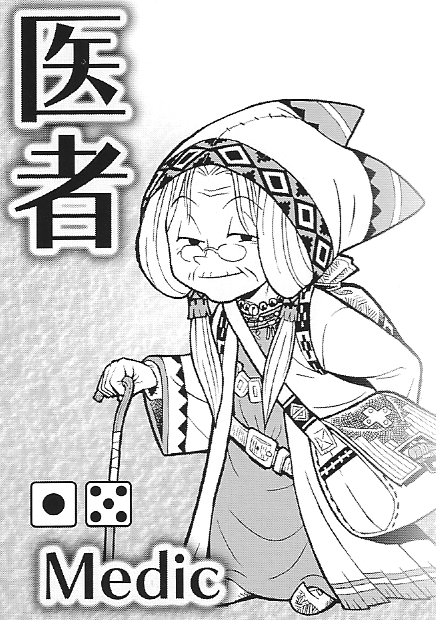
"Show us where it hurts, dearie."
Doctors, basically. This is one of those professions that's been helped out immensely by the aforementioned rise of Science, and life expectancy is the highest it's been probably since the Dungeon Hazard. There's some friction with Priests, though, as they tend to think of healing as their job.
-
Ability
: Wit
Skill Groups : Science, Item
Equipment : Stretcher, First-aid Kit
Prodigy Effect : (Permanent) During the Ending Phase, before the Round-Table, you may recover 1D6 lost <Citizens>.
Field Doctor - (Interrupt, Court) - no Check
You may use this skill at the end of combat. Spend 1 <Hope> and recover 1d6 <Staff> lost in the battle.
Aristocrat
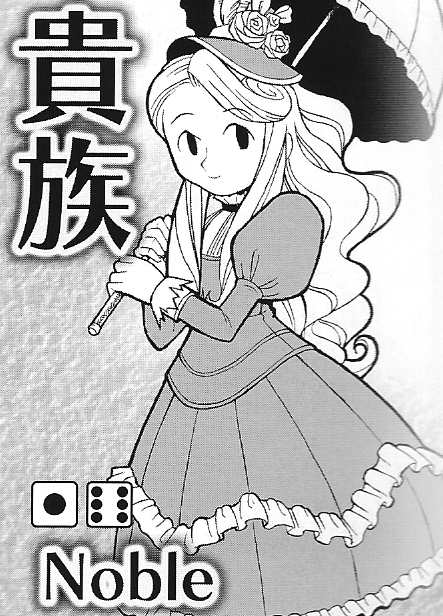
"Ah do declayah!"
Descended from a noble bloodline, your "job" boils down to "being alive", which tends to make you unpopular in smaller kingdoms where time is measured in harvests and everyone lives three-to-a-room. Still, someone's got to keep a touch of class about the place, don't they?
-
Ability
: Charisma
Skill Groups : Negotiation, Performance
Equipment : Outfit, Full Course
Prodigy Effect : (Permanent) Your Kingdom's (Cultural Level) is increased by 1.
Noblesse Oblige - (Permanent, Self) - no Check
While in combat, your (Valor) is equal to the number of Characters in the same Area with whom you have at least 1 point of <Sympathy>.
Eunuch
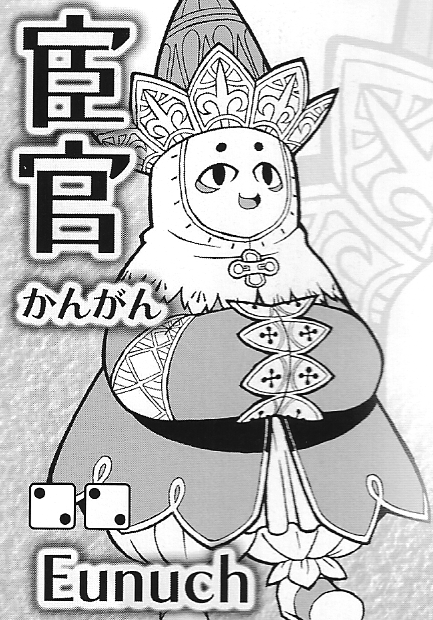
......
Yep. Eunuchs. Advisers and government officials, they willingly have their testicles removed in order to remove the physical distraction of sex from their largely intellectual duties, like a more drastic take on the Mentats from Dune . The flavor text specifies that the process of removal is dangerous, and the possibility of restoration is slim, yet somehow young men are still lining up for the position. Also, there's nothing rules-as-written about gender exclusion, so female Eunuchs are entirely possible. How that works out, I don't even want to know.
-
Ability
: Wit
Skill Groups : Convenience, Negotiation
Equipment : Golden Snacks, Watch
Prodigy Effect : (Aid) One Character of your choice gains 1 <Antipathy> towards a randomly chosen Character.
Conspiracy - (Permanent, Self) - no Check
When a Character with whom you have at least 1 point of <Antipathy> fails an Action Check, you may spend 1 <Hope> to make the failure a Total Failure.
Warrior
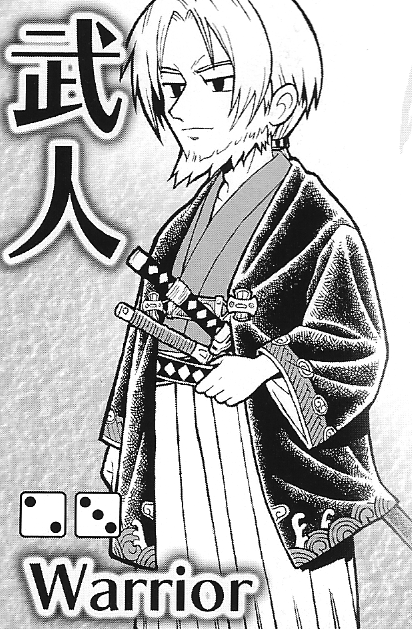
"......"
Fighter-types who love to fight. You guys can fill it in from there, I'm sure.
-
Ability
: Valor
Skill Groups : Hand-to-hand, Shooting
Equipment : Greatsword
Prodigy Effect : (Permanent) Your Kingdom's (Military) is increased by 1.
Blade Opera - (Aid, Self) - no Check
You may combine this skill with an attack. Spend 1 Hope, then select a number of Characters up to your own (Valor) and roll to hit. Any of the chosen characters whose Evasion is lower than your to-hit roll take damage as from a normal attack.
Executioner
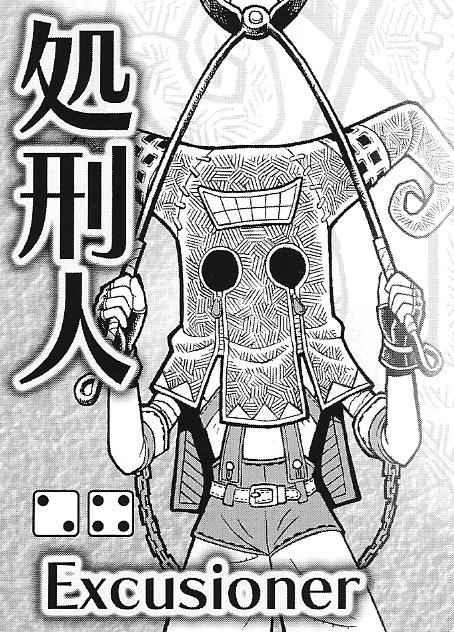
"That back molar is going to have to come out."
Sometimes, you have to get a little barbaric in order to keep things civilized. Whether they're put to active use or just told to stand there and radiate menace, keeping an Executioner around tends to reinforce the peoples' loyalty to their rulers. The flavor text also mentions some common execution methods in the Million Dungeons, such as portable guillotines for justice on the go.
-
Ability
: Valor
Skill Groups : Hand-to-hand, Negotiation
Equipment : Battle Axe, Instrument of Torture
Prodigy Effect : (Permanent) At the beginning of the game, add 1 to your <Vox Populi>.
Headhunt - (Aid, Self) - no Check
You may use this Skill after making a successful attack on another character in your area. Spend as many <Drive> as you like, then roll that many dice. If even one comes up as 6, then the enemy you attacked is immediately reduced to 0 HP.
That's about half of them. Next time: the rest! I can't wait!
Happymancer & Friends
Original SA postCardiovorax posted:
It's bilingual.
Just like "Make You Kingdom"!


Cynical-Pop Meikyuu Kingdom Dungeon Theater
Chapter 2.6: Happymancer & Friends
Where was I?
Guard
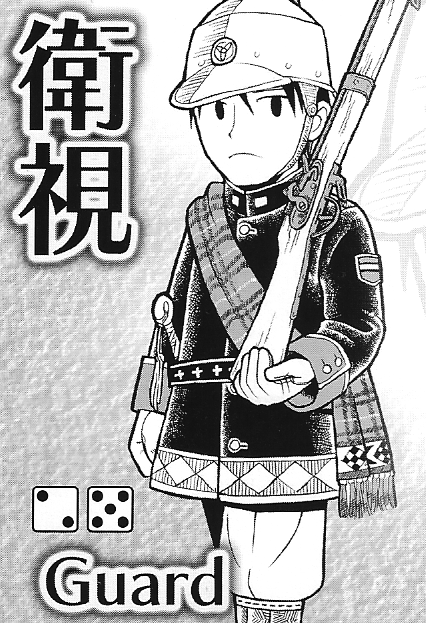
"Watch the skies, traveler."
Your standard militia/police force, with duties ranging from repelling enemy invaders and leading disaster recovery efforts to raiding the local gambling den and carrying kittens down from trees.
-
Ability
: Valor
Skill Groups : Shooting, Convenience
Equipment : Rifle
Prodigy Effect : (Permanent) Increase your nation's (Public Order) by 1.
Human-Wave Sweep - (Support, Area) - (Valor) / 9
During combat, spend 1 <Hope>, select an Area within range of one of your equipped weapons, and make the above check. If you succeed, every Character within that area takes damage equal to 1/5 of your <Staff>. If you fail, lose a number of <Staff> equal to the Difficulty minus your AV.
Merchant
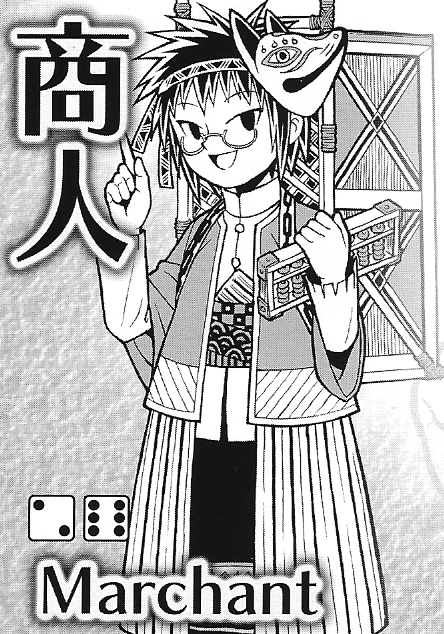
"Now, how much would you pay for this high-quality potion-bottle set? But wait! There's more!"
Turns junk into cash through a complicated alchemical process known as "browbeating".
-
Ability
: Wit
Skill Groups : Negotiation, Item
Equipment : Wallet, Credit Card
Prodigy Effect : (Permanent) Increase your Nation's (Quality of Life) by 1.
Hard Sell - (Support, Single) - (Wit) / target's Evasion
You may use this Skill during combat. Select one enemy character as a target. If the above check succeeds, discard one item of your choice and gain 1 MG. (If you choose a Material, lose 10 of that Material.) You may use this Skill only once per combat.
Daedalist
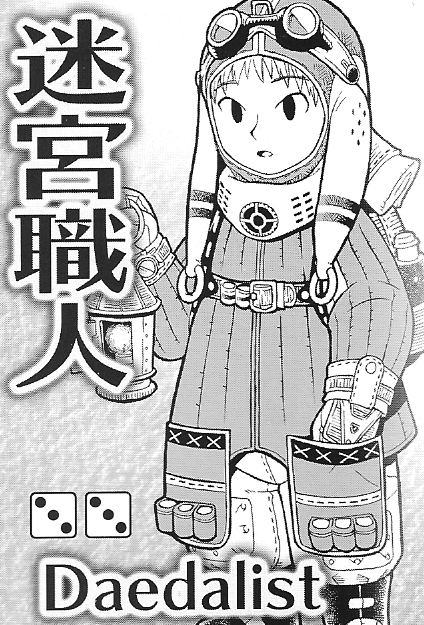
What's with the ear flaps?
Craftspeople who can rearrange and reshape portions of dungeon by directly interfering with the "kernel" that serves as the area's core. You might think this would count as a Great Magic, but apparently not. Indispensable on construction projects.
-
Ability
: Adventure
Skill Groups : Dungeoneering
Equipment : Dungeon Insurance
Prodigy Effect : (Permanent) When you take this Talent, select one type of Facility. The cost to buy Facilities from this type is lowered by 1 MG.
Dungeon Tectonics - (Support, Area) - see text
While in Combat, select 1 Area and 1 Combat-type Trap of your Level or lower. Make an (Adventure) Check with a Difficulty of [7 + the Trap's level + the target Area's Trap Level]. On a success, place the Trap in the target Area.
Barkeep
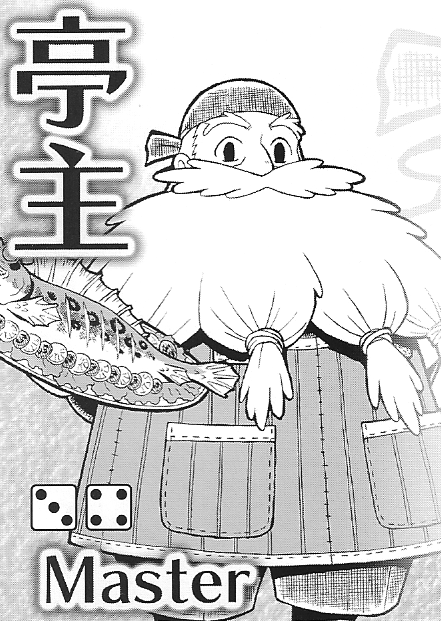
This guy rolled boxcars on the Facial Hair Table.
Keeps the drink flowing and the guests relaxed. Besides, what sort of fantasy game would it be without any inns?
-
Ability
: Charisma
Skill Groups : Negotiation, Convenience
Equipment : Booze, Full Course
Prodigy Effect : (Aid) You may use this ability if your Nation contains an {Inn}. Increase your Nation's Budget by 1 MG.
Mood Maker - (Aid, Single) - no Check
When you rest at camp, choose 1 character. That character gains 1 <Drive>.
Cook
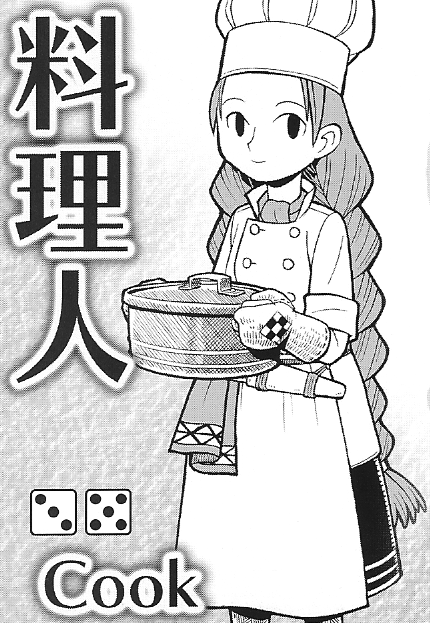

If it bleeds, they can grill it. Landmakers still gotta eat, y'know.
-
Ability
: Adventure
Skill Groups : Convenience, Item
Equipment : Pot, Apron
Prodigy Effect : (Permanent) Increase the level of your Boxed Lunches and Full Courses by 1.
Dungeon Banquet - (Aid, Dungeon) - (Adventure) / 9
You may use this skill when you use a {Boxed Lunch} or a {Full Course}. If you pass the above check, then in addition to the item's other effects, all characters in your Court receive a +1 bonus to Valor for 1 Turn.
Happymancer
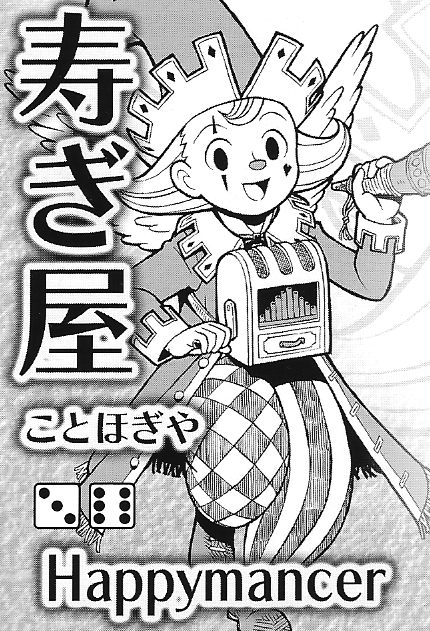

Anywhere there's a festival, there they'll be, with a song, or a story, or just a bit of conversation, whatever it takes to keep everybody in the right mood. Don't let the clown get-up fool you, either, they can work any sort of crowd: joyful, sorrowful, they'll even fan the flames of anger if that's what's needed.
-
Ability
: Charisma
Skill Groups: Performance
Equipment: Musical Instrument, Party Popper
Prodigy Effect: (Aid) Once during your Ending Phase, when rolling on the Fluctuation Table, you may increase or decrease your roll by 1.
Sweet-Talk - (Interrupt, Single) - no Check
You may use this skill whenever another character gains <Empathy>. Spend one <Hope> to double the amount of <Empathy> gained.
Worker
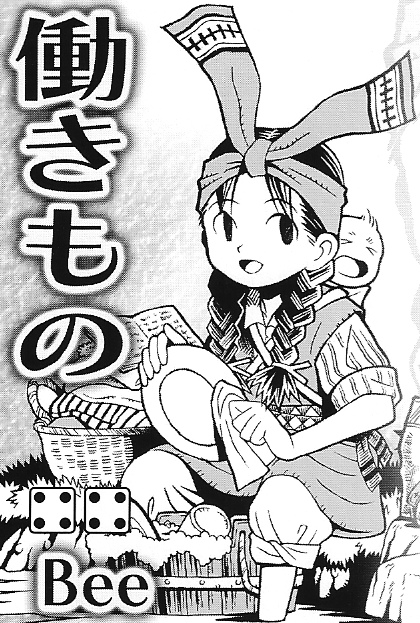
bzzzzzzzzzzzzz
Most of the Jobs revolve around using a skill or filling a particular need; this one is all about getting shit done. Whaddaya need?
-
Ability
: Adventure
Skill Groups : Handy, Item
Equipment : Broom, Tent, Tonic
Prodigy Effect : (Permanent) Increase the level of one of your Facilities by one.
Hustle - (Interrupt, Single) - no Check
You may roll this skill whenever anyone, including yourself, rolls on a table during the Dungeon Phase. Spend one <Hope> to nullify the result and reroll on that table.
Hunter
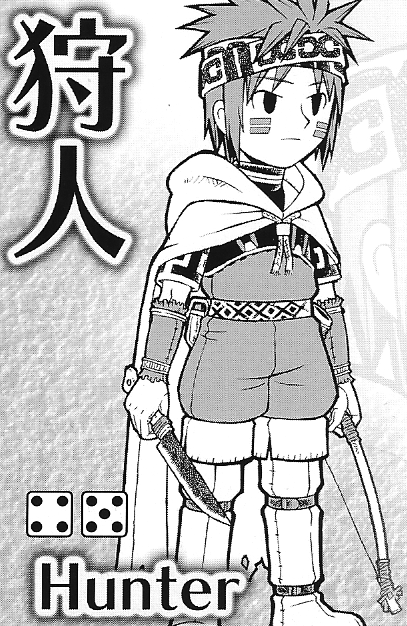
The cheek stripes are absolutely essential.
Rangers. They shoot arrows at animals. It's that simple.
-
Ability
: Adventure
Skill Groups : Marksman, Dungeoneer
Equipment : Crossbow, Cloak, Living Drill
Prodigy Effect : (Permanent) When taking this Talent, choose 1 Monster Type. All members of your Court get a +1 to-hit and damage bonus when attacking a Monster of your chosen Type.
Hunting - (Planning, Self) - (Adventure) / 9
On a successful Check, acquire 1D6 [Meat], [Hide], or [Fang].
Adventurer
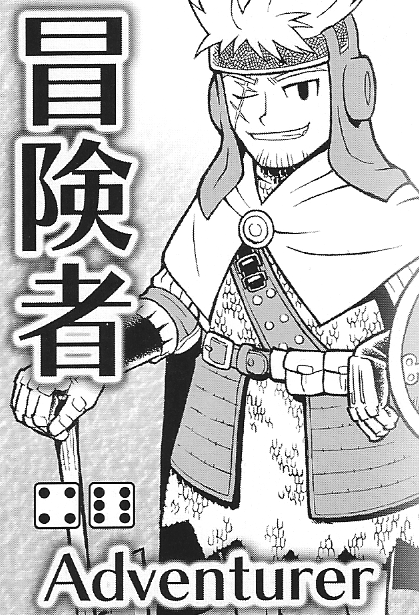
Your classic murderhobo.
Chronic do-gooders, explorers, or just folks seized by wanderlust, anyone who manages to stay alive long enough in this line of work will find a name's been made for them.
-
Ability
: Valor
Skill Groups : Hand-to-hand, Dungeoneering
Equipment : Shield, Armor, Map
Prodigy Effect : (Permanent) Increase the <Staff> maximum of everyone in your Court by 3.
Fame - (Permanent, Self) - no Check
Once per combat, when an attack of yours brings an enemy of a level higher than yours down to 0 HP, gain 1 <Vox Populi>.
Loafer
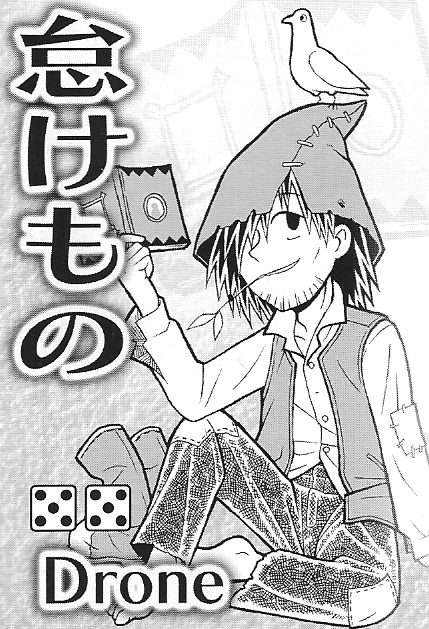
Hatbird sold separately.
Most of the Jobs revolve around using a skill or filling a particular need; this one is all about not getting shit done. Hey, it can be a lot harder than you'd think!
-
Ability
: Valor
Skill Groups : All
Equipment : Booze, Playing Cards
Prodigy Effect : (Permanent) You may tap this Prodigy to nullify the effect of any random table roll.
Lazybones - (Permanent, Self) - no Check
During combat, if you take no action (including Aid actions and Interrupt actions) during the Round, then recover 1 HP at the end of the Round. During the Dungeon Phase, if you take no actions for one Quarter (including Aid actions and Interrupt actions), then recover 1 Drive.
Thief
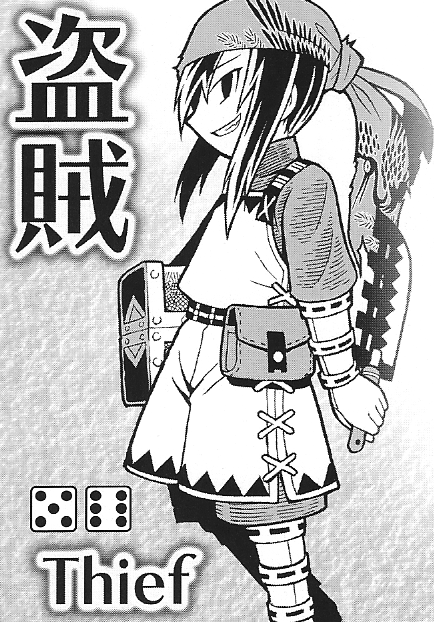
Eh, I got nothing. Let's just get this done.
Rogues. Again, just that simple.
-
Ability
: Adventure
Skill Groups : Negotiation, Item, Dungeoneering
Equipment : Dagger, Familiar
Prodigy Effect : (Aid) Whenever anyone rolls on the Wandering Table, you may nullify the effect and reroll on the Wandering Table in that person's place.
Magic Fingers - (Interrupt, Trap) - (Adventure) / Trap Level + 9
You may use this skill whenever anyone in your Court becomes the target of a Trap. Spend one <Hope> and make the above check. If you succeed, then for the duration of this cycle, the Trap has no effect.
And that's it for Jobs. Next time: how to actually play the game! I can't wait!
The Basics
Original SA post
Cynical-Pop Meikyuu Kingdom Dungeon Theater
Chapter 3.1: The Basics
Phases of Play
Each game of Meikyuu Kingdom follows a progression of four Phases:
-
Preparation Phase
- Wherein the GM makes an adventure, everybody decides on a place and a time to meet up, players make characters if they haven't already, etc. To my knowledge, no rules actually reference this phase, but there it is anyway.
Kingdom Phase - GM introduces the plot. Players prepare themselves for adventure and/or the kingdom for their absence.
Dungeon Phase - Explore! Kill! Loot! Continues in a partial loop until the players either go home and give up, complete the scenario, or die.
Ending Phase - Everybody piles together the loot they made in the previous Phase and divvies up how best to spend it to keep the nation strong. Also, if they completed the scenario, this is where they level up.
In-Game Time
When everyone has resolved their actions, that is one Cycle . Cycles have two more commonly used sub-terms depending on when the time is being measured: Rounds in combat, and Quarters during the Dungeon Phase. The passage of four Quarters equals one Turn , which isn't actually a cycle but will come up later.
Actions
Characters exist in one of two states: Ready and Spent . Most actions require the character to be Ready, and they become Spent once the action is resolved. At the end of each Cycle, all remaining characters revert to Ready.
There are four main types of Actions:
-
Support
- The most common Action Type. Usually supplements a basic action (like an attack or movement) in some way that wouldn't take a lot of in-character preparation to pull off. Acting character must be Ready, and becomes Spent once the action is resolved.
Plan - More complicated and time-consuming actions that set up some benefit for later use. Cannot be used during combat. Acting character must be Ready, and becomes Spent once the action is resolved.
Aid - Supplementary actions to, well, aid another character's action. Resolution does not make the acting character Spent, and can even be performed if already Spent. However, Aid Actions cannot be combined, and the same character cannot perform the same Aid Action more than once per Cycle.
Interrupt - Actions that target and supersede other Actions. Note that Interrupts can themselves be Interrupted; in this case, each Interrupt is resolved in the order they were declared, and the original Action only resolves once that's done. Resolution does not make the acting character Spent, and can even be performed if already Spent. The same character cannot make the same Interrupt Action more than once per Cycle.
Action Checks
Roll 2D6 and add the appropriate Ability (predetermined by game data, or else set by the GM); this total is your Achievement Value (AV) . If the AV is equal to or greater than the Check's Difficulty (again, predetermined or else GM'd; typically ranges from 7 to 11), the Check succeeds. A standard, simple enough mechanic that I was for some Godforsaken reason compelled to spend the better part of two months trying to make sound complicated. :spergicide:
-
Hope = More Dice
- Before rolling the dice for a Check, you may spend any amount of <Hope> to roll an additional number of dice equal to the amount spent. Pick any two from this pool to use for your AV.
-
6 = Drive
- Before calculating the AV, you may choose to convert any 6s rolled into <Drive>. Converted dice are removed from the Check pool. You can't convert dice for <Drive> if doing so would reduce the number of dice in the Check Pool to less than one.
-
11 = Total Failure
- A Total Failure occurs when the dice used for the AV are both 1s. The Check fails regardless of Difficulty, and the <Vox Populi> is decreased by 1. The AV is treated as a 0. (NOTE: this only happens when the
AV dice
are
two
1s. If you've spent <Hope> and roll two 1s in the Check Pool, it only counts as a Total Failure if you're somehow dumb enough to choose them both. If you roll a 1 and a 6 normally, then take the 6 for <Drive>, the lone 1 does not count as a Total Failure, though it'll probably fail normally since it's just a 1, but hey, none of my business.)
-
66 = Total Success
- A Total Success occurs when the dice used for the AV are both 6s. The Check succeeds regardless of Difficulty, and the character making the Check gains 2 <Drive>. The AV is calculated normally.
-
Staff = More Numbers
- After calculating the AV, you may decrease your <Staff> by 1D6 to increase the Check's AV by 1. If you roll more <Staff> than you actually have, you lose them all, but the effect still goes through. (This also applies to Skills that reduce <Staff>.)
-
National Power Checks
- Whenever a Check is made using a National Power instead of an Ability Score, the roll may be made by any player. Also, <Vox Populi> exclusively replaces <Drive> wherever it shows up: increasing the Check Pool, converting 6s, and Total Successes.
Co-Operative Actions
Before another character rolls for a Check, you may make a Co-Operative Action to help them by offering advice or assistance. This counts as a Support-type action, so you must be Ready beforehand and are Spent afterwards; also, you cannot Co-Operate with a character for whom you have more <Antipathy> than <Sympathy>. No roll is required, just describe how your character is collaborating in the target action, and if the GM decides it sounds valid, the Check's AV is increased by the total <Sympathy> you have for the character making it.
National Disasters
If the <Vox Populi> ever drops below the number of Landmakers currently in the game, and every time it's caused to drop further below that number (even if it's already at 0), a representative of the Court must roll 2D6 against the National Disaster Table. As the name implies, this is something you'd generally want to avoid doing: plagues, famine, invasions, and uncontrollable shifts in the dungeon are just a few of the possible results.
...huh, that ended on kind of a dire note. Well, anyway! Next time: play begins! Here's hoping I get it up sometime before November!

Court Is Now In Session
Original SA post
Cynical-Pop Meikyuu Kingdom Dungeon Theater
Chapter 3.2: Court Is Now In Session
Once you've got all the characters rolled up and the little details hammered out, it's time to start actually playing the game. The first part of every session will be the Kingdom Phase , which itself follows a progression of four sub-phases: Prologue , Round-Table , Action Resolution , and Departure .
Prologue
By design, a solid chunk o' roleplay. How much or how little your group breaks off is a matter of individual taste, but should at the bare minimum include the GM's background exposition, the introduction of this session's adventure (most typically in the form of a citizen's petition), and the PCs' reaction to same.
Round-Table
Now that everybody knows what's happening, it's time for the Court to put its collective heads together and decide what to do about it. Of course, the answer to this is will probably generally boil down to "strap on our swords and go kill things until the problem goes away", but there's a bit more involved when you've also got a kingdom to take care of (roleplaying not strictly required, but recommended, I mean it's a roleplaying game, what did you even come here for, geez):
-
Organization
- One by one, each player petitions the Royalty for as many <Staff> as they think they'll need in the dungeon. The Royalty then assigns everyone a number of <Staff> taken from the Kingdom's <Population> based on the merit of their arguments.
-
Budget
- Same basic principle, only the Vizier takes point this time (or the Royalty again, if there isn't one present), while everybody else pesters him to buy them things:
-
Each player may request one Common Item with a Cost less than or equal to the Kingdom's current (Quality of Life).
-
Facilities can be built by deducting the Cost from the Kingdom's <Treasury>. These things get their own chapter later, so I'll save the details for then.
-
Passageways can be added or destroyed for 1 MG apiece.
-
Each player may request one Common Item with a Cost less than or equal to the Kingdom's current (Quality of Life).
Action Resolution
Once the Kingdom's good and prepped, the Landmakers have just enough time before heading out to make some personal preparations. Action Resolution lasts for one Cycle, which means everybody gets just one turn, but there's no mention of any particular order to follow, so fight it out between yourselves, I guess. Your options run as follows:
-
Aid- and most Plan-type Actions
from Skills, Facilities or Items can be performed at this time (if not, it'll say so specifically on the card).
Co-Operative Actions
are also permissible. You're welcome to try any others, but it's up to the GM whether or not to allow them
-
Create an Item
from its component Materials, as listed on the card. Multiples of the same Item may be created in the same action so long as there are enough Materials on hand to do so.
-
Send your <Staff> to
Gather Information
on the dungeon ahead. This is resolved in the following order:
-
Delegate a number of your <Staff> to send on the job. Must be at least one.
-
Designate a room on the current adventure's map to scout. If no information has been gathered yet, this is done at random. If at least one room has already been scouted successfully, you can choose any still unexplored room at will.
-
The character gathering information must make a Command Check, using either (Wit) or (Adventure), with a Difficulty of [7 + number of rooms explored since the beginning of the mission + number of <Staff> lost on this mission]. On a success, the GM reveals the number of Monsters and Traps in the room, and any connecting Passageways; on a Total Success, the GM also reveals the Monsters' and Traps' names as well, and identifies the Dungeon Boss if it's present. On a failure, you lose [Difficulty - AV] of the gathering <Staff>, but if at least one is still alive, the GM gives you the same information as with a regular success; on a Total Failure, though, you lose
all
of the gathering <Staff> and learn nothing.
-
Finally, you must choose to either continue the mission by sending the remaining <Staff> through one of the current room's connecting Passageways and repeating the Command Check, or call them back and end your turn. Naturally, if there are no <Staff> left, there is no choice.
-
Delegate a number of your <Staff> to send on the job. Must be at least one.
-
If nothing else seems appealing, you can always
Take A Stroll
and check up on how the citizenry are faring. The events are typically personal and the rewards relatively minor, but Landmakers are such natural adventure magnets that you've still got a small chance of stumbling across a minor national crisis just walking around the neighborhood.
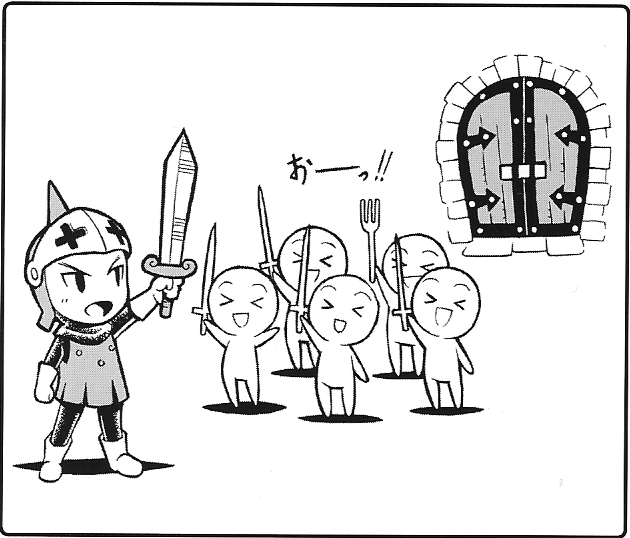
Excelsior!
Departure
With loins girded, all that's left now is the getting there! Get out your local Terra Cognita map, start from the entrance to your Kingdom and chart a course to wherever the action's been scheduled. For every plot you cross along the way, something happens:
-
If the plot is unexplored, roll 2D6 against the Travel Event Table. While results trend towards Bad News, you'll get some low-impact Checks to save against the majority of it.
-
Crossing a previously mapped plot triggers a specific event depending on which of the seven Special Plots is sitting in that square. Of these, only two are at all Good News, and the Bad is a tier worse than anything on the Travel Event Table. On the plus side, though, you'll have the benefit of knowing where they are ahead of time... unless you get the Travel Event that generates one at random, in which case, cross your fingers and try to roll high.

-
Passing through the Domains of other Kingdoms depends on your own Kingdom's standing with them.
Allied
and
Friendly
nations will let you pass through freely,
Neutral
ones will charge you a 1 MG toll,
Strained
costs 1D6 MG, and
Hostile
won't let you through at all.
As soon as the Court reaches the spot on the map marked "DUNGEON", the Kingdom Phase ends. Next time: the next phase! Guess what it's called! G'wan, guess!
Everybody Delve!
Original SA postoccamsnailfile posted:
Rifts:™ Dimension Book One: Wormwood
Pretty sure I neglected to mention it at the time, but the idea of the planet itself as a living organism that responds to the presence of sentients by forming itself into structures struck me as an idea with a high degree of applicability.

On a more immediately relevant note, as previously stated, the PDF's shortcut method on the card names left some questions hanging at certain points, so I'll be re-translating those as I get to them. I've also decided to risk coming across as a primadonna and am rejecting their translations for most of the game terminology. In the former case, I'll make a note whenever my translation and the PDF are significantly different; in the latter case, it's just me finding the majority of their word choices unnatural rather than wrong (though if you want to accuse me of just having my own terms stuck in my head and refusing to shift them, I guess there's not really any evidence I could present to the contrary
 ), so I don't imagine anyone will have any great difficulties in puzzling them out.
), so I don't imagine anyone will have any great difficulties in puzzling them out.
ANYWAY,

Cynical-Pop Meikyuu Kingdom Dungeon Theater
Chapter 3.3: Everybody Delve!
The next phase of play is called the Dungeon Phase, because it takes place in the dungeon. Any questions so far?
First thing the Dungeon Phase needs is a dungeon. Since making one is the GM's job, all you'll have to show for it at the start will be one of these (which was probably put out on the table after the Prologue in the last phase):
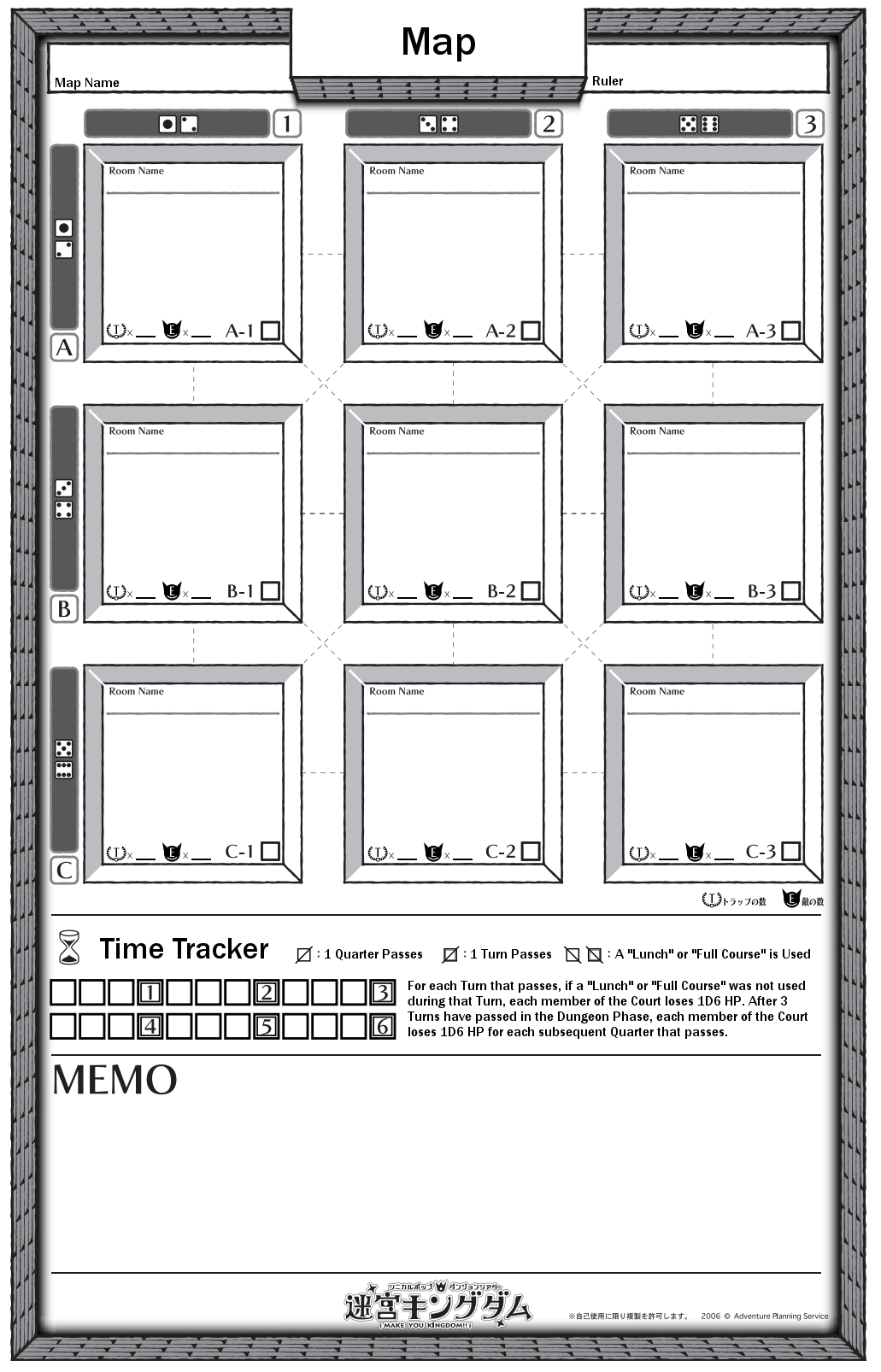
Don't have to worry anymore about getting the sheets labeled up and described. Handy!
The Dungeon Name is, by default, the only part that the GM is required to write down for you. The spaces at the bottom of each room are for the number of Traps (the T that looks like it's surrounded by laurels) and Enemies (the E in the black smiley devil face) present within it; these are only filled in by Gather Information checks. Usually, the same goes for the name of the Dungeon Boss (Ruler), although that may have been revealed by the game's plot (if you're storming a dungeon with a name like "The Lair of Siembieda the Mad", it doesn't take Mycroft Holmes to figure out who's probably waiting at the end). The check box in the corner of each room gets marked when that room has been fully explored. This comes up later.
The Time Tracker in the middle measures how long you've spent in the dungeon. Cycles in the Dungeon Phase are measured in Quarters , with each Quarter following the progression of Move , Encounter and Make Camp , to be detailed shortly. Four elapsed Quarters equals one Turn , which is where things get tricky. At the end of a Quarter, if one full Turn has passed since the last time the Court used at least one of the two food Items - {Boxed Lunch} and {Full-Course} - everyone loses 1D6 <HP> to hunger, and will lose an additional 1D6 <HP> at the end of every Quarter that passes afterwards, until you either find something to eat or the Phase ends, for good or ill. After three Turns have passed in the dungeon, the Court starts losing 1D6 <HP> at the end of every Quarter due to exhaustion; this is separate and cumulative with the loss from hunger, so watch out!
(What the map doesn't remind you of is that if you use three or more of the food Items combined in the course of a single Turn, everybody gets hit with the "Fat" Status Effect, which makes it harder to move around in combat.
 So, while management of your time and resources is important here, trying to solve the problem with overkill will only hurt you in the end.)
So, while management of your time and resources is important here, trying to solve the problem with overkill will only hurt you in the end.)
But you can table those concerns for now, because you haven't started even one Cycle yet. C'mon, dungeon ain't gonna explore itself, ya know.
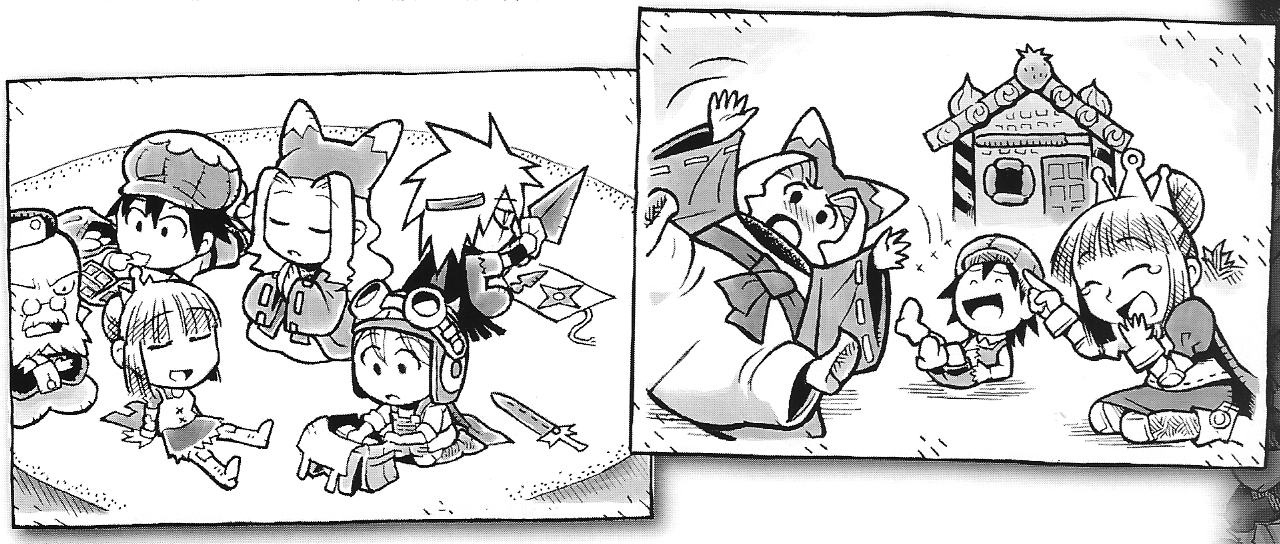
Left: a typical dungeon camp scene. Right: a Priestess falls victim to the dreaded Candy House trap.
Move
First step is the simplest. Pick an open Passageway leading out from the room you're in and move through it into an adjacent room. Entering the dungeon is considered your first movement, so you'll just skip to the next step at the start. If the dungeon is spread out across more than one map, moving from an edge room on one map to another is still just one move, since despite appearances they are still adjacent.
Also, you can freely cross any number of previously explored and cleared rooms in one go, but nothing stays empty for long out in the Million Dungeons. Every time you move into an emptied room, have one of you roll a 2D6. If the result is less than [Number of people in the Court + number of rooms already crossed], the GM rolls on the Random Encounter Table and a group of Monsters appears. If this happens, the move is interrupted, and you must proceed with the...
Encounter
When you arrive in a new room, the GM describes the visible interior features, generally including any monsters/people/other such beings present, the names and numbers of which are written down in the middle of the room's square. What happens next depends on their disposition:
-
Hostile
- For whatever reason, they just plain don't like you. Combat begins as soon as you enter the room.
-
Neutral
- They have no strong feelings one way or the other! (
 ) Random Encounters always start out as Neutral. You can go ahead and attack Neutral Monsters anyway, or you can try and Negotiate with them. This is handled by having a Court representative roll 2D6 against the Negotiation Table (if Negotiating with a Random Encounter, subtract 2 from the result). Typical results involve giving something to the monsters (an Item, some money, a good duel) to turn them Friendly, or refusing and turning them Hostile.
) Random Encounters always start out as Neutral. You can go ahead and attack Neutral Monsters anyway, or you can try and Negotiate with them. This is handled by having a Court representative roll 2D6 against the Negotiation Table (if Negotiating with a Random Encounter, subtract 2 from the result). Typical results involve giving something to the monsters (an Item, some money, a good duel) to turn them Friendly, or refusing and turning them Hostile.
-
Friendly
- For whatever reason, they just plain love you guys. If you really want to be a dick, combat is still an option, or you can play nice, end the Encounter step, Make Camp and start an Exchange with them.
However the encounter winds up being resolved, if you're not ready to stop yet, you can attempt to Press On . Have a representative make a Charisma Check with a Difficulty of [Court's total <Staff> / 10 + 7]. If successful, you may make another Move without advancing the time. If it fails, you just...
Make Camp
Once you've got everyone settled down, the Quarter is essentially over, but there's still a bit you can do before turning in. Each member of the Court may perform one of the following actions; all actions are considered Planning, so you'll be Spent once they're resolved. Who goes in what order is entirely up to you.
-
Search
- Specify a Passageway, a particular object within the room, or the room itself, then make a (Wit) or (Adventure) Check to search it for traps. The Check's Difficulty is [Number of people in the Court + 7]. If successful, the GM reveals all Traps or other information hidden at that location; if it turns out there's nothing special there, you pick up 1 Material of a random type as a booby prize.
-
Disarm
- If a Trap has been discovered that can be disarmed with an Action Check, you can make it now.
-
Gather Information
- Works exactly as in the Kingdom Phase, except that you can only gather info about adjacent rooms.
-
Exchange
- If there are any Friendly Monsters in the room, you may attempt to strike up a trade with them. Choose one of the Monsters as a target, and then select one of the following types of exchange:
-
Information - Choose another room in the dungeon and make a (Charisma) Check with a Difficulty of [5 + target Monster's Level]. If successful, learn the same information about that room as if you'd made a successful Gather Information Check.
-
Materials - Make a (Charisma Check) with a Difficulty of [7 + target Monster's Level]. If successful, you may discard a number of any Material not listed on that Monster's card up to their Level, and receive the same number of any Material that
is
listed on their card.
-
Citizenship - Make a (Charisma Check) with a Difficulty of [9 + target Monster's Level]. If successful, that Monster joins your <Staff>, and if they're still alive when you make it back to the Kingdom, they stay on as a new Monstrous Citizen.
-
If the target Monster has any <Empathy> for the character making the Exchange, the Check's Difficulty is decreased by the total amount of <Sympathy>, and/or increased by the total amount of <Antipathy>.
-
If any of the Monsters present have the "Intrigue" or "Public Enemy" Monster Skills, increase the Difficulty by 2 for each.
-
The GM may
award voodollarsalter the Difficulty by 1-3 points based on the player's roleplaying of the Exchange scene.
-
If the target Monster surrendered in combat, decrease the Difficulty by 2.
-
Information - Choose another room in the dungeon and make a (Charisma) Check with a Difficulty of [5 + target Monster's Level]. If successful, learn the same information about that room as if you'd made a successful Gather Information Check.
-
Rest
- Even downtime is full of excitement for a Landmaker. Pick an Attribute, and roll 2D6 against the Rest Table for it. Typical results vary by Attribute: (Wit)'ll get you <Vox Populi>, (Charisma) increases <Sympathy>, (Adventure) digs up a free Item or discovers something new about the dungeon, and <Valor> tends to breed <Antipathy>. There's no restriction on which one you roll, but most of the results also require Checks, so you're probably better off not picking your lowest.
-
Other
- Any other Support or Planning Action, such as from Items or Skills, can be used at this time. Co-Operative Actions are also kosher. Anything besides that has to be cleared with the GM first.
-
Change Battle Formation
- If you want to change where a character is placed at the start of combat, you can do so now. Unlike the others, this action is completely free.
But wait, there's more! If any Check made in Camp comes up as a Total Failure, in addition to the normal effects of such a result, you have to roll against the Incident Table for whichever Attribute was being used in the failed Check. Results range from really bad to even worse. Roll high.

Once all actions have been resolved, mark off the time on the map and start again from Move . The Dungeon Phase will continue in this manner until the scenario has been successfully completed, the Court is wiped out, or you give up and return home early. However, note that heading back to the Kingdom does not automatically end the Dungeon Phase; it's possible to head back out and try again, but this carries its own set of risks which will be covered with the Ending Phase.
In between that, though, combat is practically a phase in itself, and this post has taken long enough to get done, so Next time: roll initiative! I can't wait!
blah blah kill blah
Original SA post
Cynical-Pop Meikyuu Kingdom Dungeon Theater
Chapter 3.4: blah blah kill blah
Try as you might to get along with everyone you meet, sooner or later you're going to run into the hard truth that sometimes the only way to keep things civilized is to whip out your sword and start lopping off heads. When this happens in the game, the screen goes blurry and zooms in as the music changes into something more uptempo, signaling the beginning of Combat .
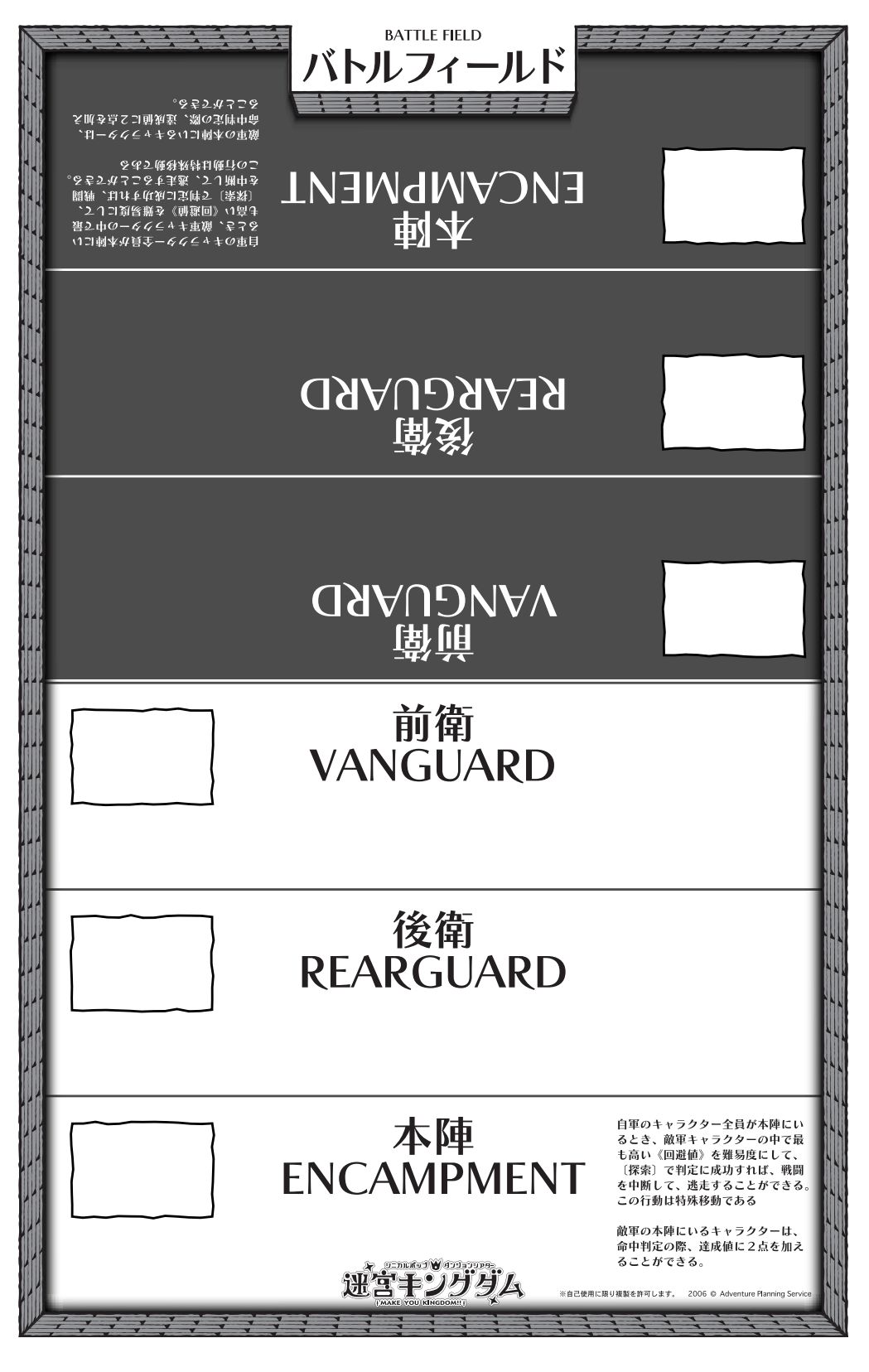
First thing’s first: set up the Battlefield , pictured above. The GM sets up their Monsters and any Combat Traps on the dark half of the board, arranged according to the scenario (if unspecified, they're placed at will); the PCs are set up on the light half according to the formation decided on in the Dungeon Phase setup or the most recent Camp. The book emphatically states at this point that no revisions can be made at all once the Court has restarted the Dungeon Phase. The implication seems to be that, unless rearranged in Camp, PCs start a new combat in the same Battlefield positions they were in at the end of the last combat, even if that leaves them in the middle of the enemy's Encampment. However, even after double-checking the original text, the official errata, and the Meikyuu Kingdom FAQ, I can't find anywhere that actually makes that EX plicit, so either there's something in the Japanese that's flown over the heads of two translators so far, or there's no implication at all and I'm missing something obvious because I'm a big dumb dummy dope.
Whatever the case, there's one more preparatory step, and that's checking for a Surprise Attack . A Surprise Attack means that the enemy gets to take one free Full Action before Combat begins proper. This occurs if either of the following conditions are met:
-
Insufficient Information
- If you enter a room without knowing the number of Monsters in it and the Monsters there are Hostile, have a Court representative make an (Adventure Check) / [20 - total number of Monsters in the room]. If the Check fails, Surprise Attack.
-
Caught From Behind
- If Combat starts with any Court member's marker on the enemy's side of the Battlefield, Surprise Attack. This is the other factor behind my previously discussed assumption, as there doesn't seem to be any other way for this to ever happen.
As with the rest of the Dungeon Phase, time in Combat is measured in Cycles - here called Rounds - which follow a repeated sequence until an end condition is met. The first part of the Round is the Tactical Check , basically a group initiative roll. A representative of the Court makes a (Wit) Check with a Difficulty equal to the highest <Evasion> among the Monsters present; if the enemies are NPCs made using PC data instead of card data, substitute [enemy's highest (Wit) + 7] as the Difficulty (NPC enemies can also make Co-Operative Checks to increase the Difficulty by one point each).
If the Tactical Check passes, the Court gets to take their Full Actions first, and vice versa. Full Actions consist of two parts, a Move and an Action , which must be resolved in that order. Which characters take their actions in which order isn't so rigid, BUT! Once one half of a Full Action has been taken, the other half must be completed before another can start. So you can't say, for example, move your character up, let another one move out of the way, then blast the whole Area with a Skill and let the other guy move back to where they were. Either you go first and they soak some of the damage, or you let them go first and lose the position. Strategy!

(Note: none of what follows from here to the end of the Round is at all mandatory. If there's no other option that looks good, you can Pass either one or both of these steps. Even if you Pass on them both, though, you'll still wind up Spent at the end, so maybe think twice about it.)
Move is exactly what it sounds like: move your character forwards or backwards 1 Area on the Battlefield. However, it's not always as easy as that. An enemy in the same Area will always try to Obstruct you from moving past them. If the number of Allies also present is greater than the enemies' total <Valor>, the line cannot hold and you can move past them freely. If less than or equal to, you're successfully boxed in and can't move past them in either direction, unless you sacrifice 1D6 <Staff> to hold them off while you and the rest Break Through to the other side.
After you've moved (or not), take your choice of Action.
Attack is the most basic, which makes it the most complicated. Follow the steps:
-
Select a Weapon
- If you have one in your Item Slots, you'll probably want to use it now. If you have many, single one out in particular. If you have
none
or just feel like playing on Hard Mode, you can improvise any Item into a Range 0, Power 1 Melee Weapon.
-
Determine Range
- All Weapon Items have a Range printed on their cards. Range 0 are Melee Weapons, and can only be used to attack targets in the same Area as you. Ranged Weapons can target anyone up to their Range in Areas away from you, but only if that Area is currently being lit by a {Star Fragment}.
1
-
(Determine Lethality
- If you want to keep the target alive for whatever reason and are using a Melee Weapon, you can declare the attack to be Non-Lethal at any time before making the Hit Check. Past that point, it's assumed you're going in for the kill. Making a Non-Lethal Attack reduces the Weapon's Power and the target's <Evasion> by 2 points, and renders the target Unconscious if it reduces their <HP> to 0 or less. This isn't actually part of the basic attack procedure, they stuck it at the end of the chapter under "Special Combat Rules" because how often is it really likely to come up, but I'm moving it up here and you can't stop me nyah nyah nyah.)
-
Make the Hit Check
- Roll your (Valor) against the target's <Evasion> (while in the opposing Encampment, increase the AV by 2). If successful, proceed to the next step; if it's a Total Success, roll on the
Critical Hit Table
first, and then move on.
 If it fails, you've missed and your Action is over; if it's a Total Failure, roll on the
Fumble Table
and take your licks before passing on to the next in line.
If it fails, you've missed and your Action is over; if it's a Total Failure, roll on the
Fumble Table
and take your licks before passing on to the next in line.

-
Determine Damage
- Deal [Power of Weapon used + total <Hostility> for the target] points of Damage to the target. If you want them
really
dead, you may spend an amount of <Hope> up to your (Valor) to add 1D6 points of Damage per. Factor in any Damage-reducing Items such as {Armor} or Monster Skills such as {Shell} (rather confusingly rendered by the PDF as "Cortex"
 ), and subtract the total amount left over from the target's <HP>. (Note the difference, there:
Damage
may be lessened, but if an effect says it
reduces <HP>
, that's sapped directly and there's nothing to do but hope you've got some left.)
), and subtract the total amount left over from the target's <HP>. (Note the difference, there:
Damage
may be lessened, but if an effect says it
reduces <HP>
, that's sapped directly and there's nothing to do but hope you've got some left.)
This seems like a good time to discuss what happens when a Character's <HP> is reduced to 0 or less. Depends on the character: Monsters are automatically considered irretrievably Dead, while PCs and Major NPCs get to roll on the Mortal Wound Table for a chance at survival. The odds of coming out of that roll merely Unconscious are pretty good, too, though it'll either cost you something or take a Check to pull through. Unconscious characters are considered Spent, cannot perform any Aid or Interrupt Actions, and have their <Evasion> set to 7; if an Unconscious character takes even one more point of damage, they move down the list to Dead. Dead characters are everything Unconscious ones are (except for the <Evasion>, but who's going to want to hit a dead guy?). Dead PCs or Major NPCs must be revived by using a {Restorative Herb} or {Grail} on them before the Ending Phase is complete, otherwise too much time will have passed to save them and it’ll be time to roll up someone new.
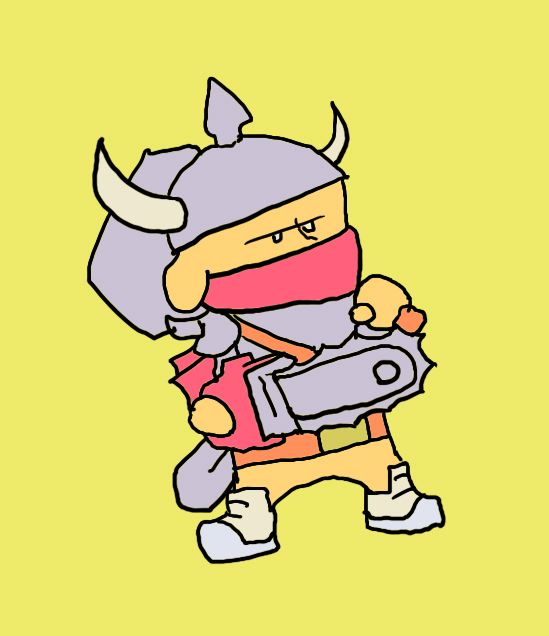
This post is getting kind of wall-of-texty, so here's a picture I found of an Ogrekin dressed up as the guy from the box art of Munchkin .
If you're the non-violent hippy type or there’s nothing near enough to hit, there are a passel of Support Actions , too.
-
Move Again
- durr
-
Evacuate
- As above, but you pick up a "Dead" or "Unconscious" character from the same Area and carry them along with you when you go. It doesn't specify a direction, but I reckon things'd have to have gotten pretty desperate if your plan hinges on taking a dead guy to go and see the ones that most likely made him dead in the first place...
-
Exchange Items
- Give what you've got to and/or take what you need from one Allied character in the same Area. Only limit is one character per Action. Well, and your Item Slots.
-
Investigate
- Searching for Traps again. Same rules as in Camp, with the exception that only specific Objects may be targeted while in combat.
-
Disarm
- Again, basically the exact same rules as before. The difference here is that you can only target Combat Traps set by the enemy while you're in the Area with it,
unless
you're in the enemy's Encampment, in which case you access their Master Control Panel or something and can attempt to disarm
ANY
trap that's been discovered! Doesn't help you with discovering them, though.
-
Other Actions
- As usual, Support Actions from any available card data may be performed as long as the text doesn't specifically exclude usage in Combat, and flights of imagination are encouraged but will require GM approval before being accepted as reality.
One final option which doesn't fit neatly into any of those categories is effecting a Full Retreat . This can only be done if all Allied characters are present in your own Encampment. Make an (Adventure) Check against the enemy's highest <Evasion>. If it succeeds, all enemy characters are removed from the Battlefield and combat ends (I can't find any official mention of anything particular happening if the Check fails, but common sense would seem to dictate that it would leave at least the character making the roll Spent, and the Round would continue from there). Fleeing PCs must move back to the room they came from, so retreat is flatly impossible if a Trap or somesuch has closed off that Passageway; Monsters, on the other hand, have the home court advantage of being able to scarper off to any room the GM likes. (Incidentally, this is what's printed on the Battlefield.)
After both sides have fully resolved all their Full Actions, it's time to take a headcount. If both armies still have at least one member standing, start a new Round over back at the Tactical Check. If the whole of one side has been removed from the Battlefield due to death, unconsciousness, retreat or surrender, combat ends and the other side is declared victorious. For the purposes of having anything left to talk about, we'll go ahead and assume it was the PCs who won.

The loot you earn from the defeated enemies (surrender counts as defeat, retreat does not) is determined by rolling on the Treasure Tables, which are divided by Level ranges. You can roll one of two ways, which must be decided on before the dice are actually thrown: enemies can be taken individually, and you roll on the Tables whose Individual Level range corresponds to each enemy's Level; or, groups of identical enemies may be lumped together, and you roll just once for each group according to the Tables' Total Level range. Higher Level ranges have a better chance of snagging Rare Items, but if you're trying to farm out some Materials, rolling individually a bunch of times would improve your chances there.
After clearing the loot screen, the game shifts back to the Dungeon Phase at the point of setting up Camp, unless the room you just cleared included the Dungeon Boss, in which case the scenario is cleared and the game moves back to the kingdom to wrap up any loose ends and (ideally) use your newly won wealth to expand your influence. Next time: that stuff I just said! I can't wait!
1 - What the book doesn't tell you here is that the majority of Ranged Weapons have a disadvantage built into their effect text: if the Hit Check is successful and there are multiple characters in the same Area as your intended target, the one you actually hit is chosen at random. I guess this is to discourage players from making a meat wall out of one or more Knights and having the rest of the Court safely plink every threat to death from behind them.
Anime Death Tentacle Kingdommaker
Original SA post
Cynical-Pop Meikyuu Kingdom Dungeon Theater
Chapter 3.5: Anime Death Tentacle Kingdommaker
You've spent a hard day bringing the hostile hinterlands to heel and now you're finally back on your own home turf, but don't crack open those brewskis just yet. Landmaking ain't like murderhoboing, after all, where you cash in your bounty and hit the taverns. There are responsibilities to responsibilize, Ts to dot and Is to cross, ducks what need lining up in rows before you can rest. The quacking would only keep you awake if you tried, anyway.
Before you do anything else, though, ask yourselves: are you really done with the dungeon? You set out there with an objective, remember? Well, did you successfully complete the scenario as given to you way back in the Prologue, or have you "tactically withdrawn"? In case of the latter, you'll probably want to give serious consideration to a Re-Challenge . With a Re-Challenge, you turn right back around to try that sucker again, restarting at the Kingdom Phase. This tops off your <HP> and gives you a chance to refill your <Staff>, Gather Information, or any of that other previously-detailed stuff. On the somewhat-less-than-upside, it also ends all continuous effects (such as Facility buffs from the first Kingdom Phase or Bad Statuses) and resets the <Vox Populi> to [10 - total number of Re-Challenges attempted this Game]. A very definite risk involved is the GM taking this opportunity to rearrange or even partially repopulate the dungeon, but as we'll see in a minute, even this pales against the penalty for leaving a job only half-done.
One more thing about this, and it's kind of important so I'll put sirens around it for emphasis:
 Not all Scenarios will allow Re-Challenges.
Not all Scenarios will allow Re-Challenges.
 This depends largely on the threat that's being addressed -- a great slavering beastie made of constellations set to take its rampage right down Main Street probably won't wait around while you get yourselves situated, but a sleeping dragon whose snore-smoke threatens to blanket the sky overhead will be just as evicted in another day or two. Also, unless your GM happens to be Megaduke Douchecanoe of Pricksylvania, they'll have told you outright at the start if this was the case.
This depends largely on the threat that's being addressed -- a great slavering beastie made of constellations set to take its rampage right down Main Street probably won't wait around while you get yourselves situated, but a sleeping dragon whose snore-smoke threatens to blanket the sky overhead will be just as evicted in another day or two. Also, unless your GM happens to be Megaduke Douchecanoe of Pricksylvania, they'll have told you outright at the start if this was the case.
If the Scenario has been completed or the Court votes to end the game early anyway, then the last phase of regular play begins, the appropriately named Ending Phase . Just like the others, this Phase follows a progression of sub-phases, as follows: Kingdom Change , Epilogue , Round-Table , and Level Up . ( Re-Challenge doesn't properly fit in this or any other Phase, and is treated the same way as an Interrupt action.)
Kingdom Change
The world doesn't come to a stop while you're off gallivanting about the dungeons, and the events that have taken place in your absence are determined here. For each Character that returns, roll 2D6 against the Kingdom Change Table; however, if the Scenario was not completed, you roll against the Kingdom Downturn Table instead. Most of the results are either shared between them or variations of each other (the people kept working diligently / slacked off while you were gone), just with any possible benefit removed (increase <Treasury> by 1 MG for each Turn that passed) and/or penalty worsened on the Downturn Table (increase <Upkeep> by the same rate). They're not a whole lot individually, but resolving half a dozen Downturn results all at once can really punch a hole in your plans or even leave the Kingdom in ruins.
Epilogue
Just like the Prologue, another mixture of roleplay and exposition that sums up how the situation stands after the events of the game. If the Court was promised a specific reward for completing the Scenario, it's given to them now.
Round-Table
Again, startlingly similar to its Kingdom Phase counterpart, the Ending Phase version consists of the following steps:
-
Earnings Report
- The Servant leads this one (or any non-Royalty Landmaker, if no Servants are present). First, if the scenario was completed, the <Treasury> increases by [Kingdom Level + (Current <Vox Populi> ÷ 2)] MG. Mark down any other assets gained from the Dungeon Phase or the Epilogue (money, Items, Prodigies, etc.), and erase any assets that were lost. Finally, roll 2D6 against the Market Table to determine which Material is currently in the highest demand; that Material may be sold at a price of 1 MG for 3, all others 1 MG for 5.
-
Budget Meeting
- Vizier (or Royalty) takes point. Calculate how much the Kingdom costs in <Upkeep>: the base value is [number of Turns elapsed * number of Territories in the Kingdom] MG, increased by 1 MG for each member of the Court if the Scenario was not completed, and possibly increased or decreased by any number of Facility/Skill effects or roll results. Subtract the result from the <Treasury>; if there isn't enough there to cover it, you'll have to sell Facilities to make up the difference.
The same selection of purchases that were available in the Kingdom Phase is available here, with one very notable addition. If you defeated the Dungeon Boss through combat or diplomacy, you may at this point purchase the Scenario's map by spending [5 + number of unexplored rooms consecutive to the Entrance] MG from the <Treasury> and updating the Known World Map with that space as a Territory of your Kingdom.
If, after all purchases have been made, the <Treasury> remaining is greater than the current (Quality of Life), reduce the former to be equal to the latter. This is the balance that is carried forward into the next game.
-
Exploration Meeting
- This one's totally meta. The GM leads a discussion among the group about who they feel performed the best in this game, using such suggested criteria as "Best Roleplaying", "Most Helpful", you know, all that happy hogwash. The players then put it to a vote, and whichever one of them wins gets a Medal, which are used to qualify for Advanced Jobs.
-
Dismissal
- Revert all remaining <Staff> to <Citizens>. Adjust the Kingdom Level if needed.
Level Up
If the Scenario was completed successfully, each member of the Court may gain one Level, so long as this won't put their Character Level above the current Kingdom Level. Any Characters who completed the mission from their Background may also gain one Level, but the Level gained this way is not subject to the Kingdom Level cap. On gaining a Level, the following effects are applied:
-
Increase maximum <HP> and <Staff> by 1.
-
Acquire one new Skill. This can be a Class Skill, one from a Skill Group provided by your Job, or a General Skill. In the unlikely event that there are no options you can actually take, skip this step.
-
Add up your <Affection> and <Hostility> scores. If either one comes out to be greater than your new Character Level, reduce them until they're equal.
Any Character eligible to gain a Level but prevented by the Kingdom Level cap may instead take part in Retraining : choose any number of the Skills you have learned, unlearn them, and learn a new one from the available pool in place of each. Also, regardless of how the Scenario turned out, you can change one of your character's Likes or Dislikes to reflect the events of the game.
And that's it! Game's over, see you all next week. Write-up's not over, though, and I'm not even going to try and promise a clear estimate on when it'll show up again. When it does: a grand tour of the data cards! I can't wait!
...and the rest
Original SA postCyphoderus posted:
There are Bad Statuses as well.
 OHSHIT
OHSHIT

Cynical-Pop Meikyuu Kingdom Dungeon Theater
Chapter 3.uh, something: ...and the rest
In between the Ending Phase and the start of the Skill cards, they stuck all the miscellaneous rules that didn't rightly belong in any of the previous chapters, right where I could forget about them completely until a minute ago.

Bad Statuses
Yep, exact same video-game concept. Exact same terminology, even. You'll usually get these from Traps or Monster Skills. There are several Item or Skill effects which will clear them up, or most of them have conditions attached that let you remove them for "free".
-
Poisoned
- No prizes for guessing. Lose 1 <HP> at the end of each Round in Combat, and at the end of each Quarter of the Dungeon Phase. Remove by Resting in Camp or returning to the Kingdom.
Distracted - Your concentration is broken, and you can't seem to fit it back together. Cannot gain <Drive> from any special effect or by Action Check dice appropriation. Remove by rolling a Total Success or Total Failure on an Action Check, or by returning to the Kingdom.
Fat - Don't you call it "portly", "pudgy" or "stout". I won't tell you once again. Lost 1 <HP> every time you Move in Combat. Remove by not eating for one full Turn, or by returning to the Kingdom.
Cursed - You've been turned into a toad or something via bad juju. However it's flavored, Action Roll results of 3 or less now count as Total Failures. Remove by returning to the Kingdom.
Asleep - You're so tired, you can't seem to keep awake! Essentially, you're Unconscious, but you wake up at the end of Combat or the moment you take any damage. If an effect hits you that would put you to sleep while you're already Asleep, you lose 1D6 <HP> instead.
Mindless - Your mind regresses to primal instinct. Works the same as the "Berserk" status from the Final Fantasy games, where you lose control of the character and just watch as they hit anything that crosses their line of vision with no discrimination between friend and foe. Remove by
Relationship Scores
I covered these already, didn't I? Only then I called them "Empathy" because vocabulary. Anyway, each sub-type has a maximum value of 5. Max one of them out and you'll more than likely hit upon a Special Relationship :
-
Unrequited Love
- Occurs when you have 4 or more points of Love <Affection> for one Character. Whenever that Character rolls a Total Success, you gain 1 <Drive>.
Lovers - Occurs when two Characters have 4 or more points of Love <Affection> for each other. Whenever one of the characters makes a Check, the other may spend 1 <Hope> to Interrupt with a Co-Operative Action.
Best Friends - Occurs when two Characters have 4 or more points of Friendship <Affection> for each other. Whenever one of the characters takes damage or is hit with a Bad Status, the other can substitute themselves as the target, but only once per Cycle.
Devotee - Occurs when you have 4 or more points of Loyalty <Affection> for one Character. Whenever that character takes damage, gain 1 point of <Hostility> for the Character who dealt it.
Rival - Occurs when you have 4 or more total points of <Hostility> AND at least one point of Friendship <Affection> for the same Character (no requirement on their end, making it entirely possible to be Rivals with someone who doesn't even know you exist
 ). Once per Game, you may use any 1 non-Permanent Skill known by that Character.
). Once per Game, you may use any 1 non-Permanent Skill known by that Character.
Unknown Encounters
This is, I believe, as close as the game comes to officially sanctioned GM dickery. The GM may designate a number of Combat Encounters in a scenario equal to the average Level of the Court to be "Unknown Encounters". In an Unknown Encounter, the stats of any or all Monsters involved are hidden from the players; all the GM is required to give are physical descriptions. So not only are their capabilities a mystery, but the Difficulties of any Checks made against them are secret! The PCs may attempt to ferret out their secrets by making a (Wit) Check with a Difficulty of [target Monster's Level + 5] (still a secret!), or by using the Professor's {Monsterology} Job Skill. If either of these are successful, the GM must reveal that Monster's stats.
Splitting the Party
It's a thing you can do. Movement, Encounters, and Camp are all resolved separately, one group at a time. If Combat begins while the Court is split, any PCs not in the room where it's starting may roll against the Dynamic Entry Table to try and burst in. This may be done before the first Round, or at the beginning of any Round after that.
Opposing Checks
Resolve Monsters first, then PCs. In case of two opposing PCs, flip a coin or something.
Falling Damage
No measurements given for how high up you have to be, so I guess it's up to the GM. Damage is a flat 3D6 <HP>, anyway, though the falling Character can make an (Adventure) / 9 Check to halve it.
Thinking On Your Feet
Make your own shit up and see what the GM thinks of it. Not recommended for newbies.
Kingdom Destruction
Yeah, this is a Big One. Your Kingdom and anything in it is destroyed if any of these conditions are met:
-
The entire Court is either Dead or Unconscious (in which case they'll probably
be
Dead in a minute).
-
The Kingdom's <Population> becomes less than or equal to the current number of Landmakers in the Court.
-
All of the Kingdom's Territories are lost.
-
The {Royal Palace} is destroyed.
-
Any of the National Powers become 0.
Kingdom Restoration
But so long as you're alive, it's not over yet! Once a Landmaker, always a Landmaker, even if you're reduced to ruling over a one-room tenement apartment in an abandoned building. All National Powers are considered to be 1, and you cannot gain any <Citizens> until you've acquired a new Territory. Once you have, though, [2D6 + number of Landmakers in Court] <Citizens> appear to live in it, and you're back in business. (Alternately, you could go make land for some other Kingdom, but where's the fun in that?)
Special Alliances
Oh, I love this one. Special Alliances are when one or more players from one Meikyuu group sit in and play a session with the Court of another group. Why give a fancy name to something like that, you may ask? The answer, of course, is tables: 1D6, rolled during the Prologue, against the Alliance Table corresponding to your Character's Class, to determine what it is they're doing way over in this other Kingdom adventuring with a bunch of strange Landmakers. Results usually imply a sort of mini-sub-quest to be folded into the larger Scenario - a Knight searching for a holy relic, an Oracle lost in a crisis of faith, a Servant on a mission to destroy a cursed object. After the game, if everybody's agreeable to the idea, both Kingdoms may mark the other down as Allied.
Trade and Exchange
I thought this had been covered back in the Kingdom Phase, but apparently it's an optional rule. During the Treasury Meeting of either the Kingdom Phase or the Ending Phase, you may initiate Trade with any other Kingdom on your Known World map with whom you have Diplomatic Relations of Neutral, Friendly, or Allied:
-
Purchase Materials
- If the Kingdom has a designated Staple, spend 1 MG to purchase 1/3/5 of that Material depending on your level of Relations.
-
Sell Materials
- Roll on the Market Table to determine what they need, then sell any of that Material you have on hand, 2/3/4 for 1 MG depending on your level of Relations.
-
Purchase Rare Item
- Choose a Rare Item at random. You may purchase 1 of that Rare Item for [Cost + 1] MG/[Cost * 2] MG/[Cost * 3] MG, depending on the same thing it always depends on.
-
Sell Rare Item
- Have a member of the Court make a (Wit) / 9 Check. If successful, you may sell 1 Rare Item to the Kingdom for [Cost + 1] MG/[Cost] MG/[Cost ÷ 2] MG, depending.
-
Use a Facility
- If the Allied Kingdom is fully fleshed out - say, because of a Special Alliance - you may use one Facility they own with a Plan-type Action.
-
Exchange Program
- Lose one Prodigy, gain another with a randomly generated Job.
Passing Time
Tempus somethingorother, I forget the words but the basic idea is that time happens. Once during the Setup Phase (oh hey, something does reference it!), the players may elect to advance the game calendar by one year and roll against the Time Passage Table for a quick assessment of their fortunes over that time. Results are evenly split between good and bad.
Ghosts
A player whose Character dies during the game may, instead of being revived (or if they weren't in time, I guess), choose to become a Ghost and continue to assist the Court from beyond the grave. A Ghost Character may reduce either their <Affection> for another Character or another Character's <Affection> for them by 1D6 to make one Plan, Support, Assist or Interrupt Action; also, for the rest of the Cycle after doing this, any Permanent Skills they possess(ed) become active again. The drawback to this is that if the Ghost Character loses all their <Affection>, or if the Court loses all their <Affection> for the Ghost, there's nothing left to tie them to this world and they vanish for good.

Transporting Items
As a Plan Action during the Dungeon Phase, you can send some of your <Staff> back to the Kingdom with Items or Materials that you've found. Treat each citizen as if they had one Item Slot, assign the Items to be transported accordingly, and reduce your <Staff> by however many it ends up taking. Then, make a (Military) / 9 Check. If successful, increase the <Population> by the number of <Staff> dispatched, and mark the Items down on the Kingdom Sheet. If it fails, some of them fall victim to Traps or wandering Monsters en route; decrease the number of <Staff> by [Difficulty - Result] before increasing the <Population> (apparently, the ones who survive pick up the slack, because no mention is made of losing Items this way). On a Total Failure, the transport is a total failure, with all <Staff> and Items lost.
Government Policies
Hey, wait a second, this isn't anywhere in my copy of the Kingdom Book. Huh. I thought the PDF had been made using the same version, but I guess they got a reprint or something. Well, whatever. During the Round-Table of the Kingdom Phase, the Royalty or Vizier can make an Aid Action to enact one of two Policies to increase either the <Treasury> or the <Population>. When they do so, the maximum <Staff> for all members of the Court becomes [(Charisma) + Level] for the rest of the game. Beats me why. Before the Earnings Report of the next Ending Phase after declaring a Policy, make a Check with a Difficulty equal to [Kingdom Level + 5], using either (Quality of Life) for <Treasury> or (Public Order) for <Population>. If successful, increase the <Treasury> by [Kingdom Level] MG or the <Population> by [current Population ÷ 10].
Okay, that's that for the optional/miscellaneous rules. Next: the card data, I mean it this time.
Tour of Data - Advanced Skills (General to Science)
Original SA post
A quick preface before I begin this beguine: the whole rest of the Kingdom Book, and the majority of the Dungeon Book after it, is made up of data cards for all the Skills, Items, Monsters and cetera. The data parts are competently represented in the /tg/ PDF translation, but without the artwork and flavor text, not to mention its usage of the often bewildering official English names, it's not always clear just what each card is meant to be depicting. So, for the rest of this write-up, I'll be giving my own take on the original Japanese card names first, followed by the English version used by the PDF in parenthesis (unless they turn out to be identical), and an ideally brief summation of what they
are
rather than what they
do
. Alright? Alright.

Cynical-Pop
Meikyuu King
 WAIT HOLD IT STOP DA MUSIC
WAIT HOLD IT STOP DA MUSIC
 Maybe this doesn't actually need to be said, but I'm gonna say it anyway just so I'll know it's not gonna come up later:
The names I come up with will aim to be more literal than localized, and either way, any similarities that might possibly exist between them and what winds up in the published Lanternworks version will be completely coincidental.
Alright? Alright. Okay, for real this time.
Maybe this doesn't actually need to be said, but I'm gonna say it anyway just so I'll know it's not gonna come up later:
The names I come up with will aim to be more literal than localized, and either way, any similarities that might possibly exist between them and what winds up in the published Lanternworks version will be completely coincidental.
Alright? Alright. Okay, for real this time.
Cynical-Pop
Meikyuu Kingdom
Dungeon Theater
Chapter 4.1.1: Tour of Data - Advanced Skills (General to Science)
Skills! They’re what you do. Three kinds, two of which we've already seen:
Class Skills
, half a dozen specialties for each of the six Classes;
Job Skills
, a singular ability granted by membership in one of the available Jobs; and
Advanced Skills
, covering everything else.
Advanced Skills are separated into twelve Groups:
General
,
Melee
,
Ranged
,
Astrology
,
Summoning
,
Science
,
Dungeoneering
,
Negotiation
,
Handy
,
Entertainment
,
Item
, and
Secret
(more precise definitions will be provided in turn when we come to them). Each Job has a list of one or more Skill Groups associated with it, which determines the pool of Skills you can initially choose from when your character gains a level. However, there are some Facilities coming up in a couple of posts that will let you expand on that list or change Jobs and switch it out completely. (Note: when switching Jobs, if your old one had a Group that your new one doesn't, you do NOT lose any Skills you've already learned from that Group, you just can't learn any new ones. Or relearn ones you had at the time but later forgot due to Retraining or some similar effect.)
Every Action has a Type, as well, which determines when and how its effect can be used:
Permanent
(always "on"),
Assist
(any time certain conditions are met),
Interrupt
(as before, but supersedes any and all Actions before it),
Support
(user's turn to act in Dungeon Phase or Combat, Exhausts on resolution), and
Planning
(user's turn to act in Dungeon or Kingdom Phase, Exhausts on resolution). These terms aren't limited to Skills, and anything that produces an effect will have at least one of them on the card somewhere. There are also six predefined Targets (
Single
,
Self
,
Court
,
Kingdom
,
Room
and
Item
) but they're pretty much self-explanatory so I won't bother.
But enough talk! Have at you!
GENERAL
As the name might imply, Skills from this Group don't require any particular knowledge to pull off. In fact, more than a few of them seem more like the sort of personal traits that might be called "Feats" in some other games, but hey, Skills work too.
Jobs: All
-
Introduction
(Step Forward)
- You... step forward, and, uh... introduce yourself. I know, this "what they are" business is off to a lame start, but just like some of the names come out identical, sometimes there just isn't anything to add to what's already there. v
 v
v
From The Heart (True Romance) - What you feel for them is a pillar that cannot be shaken.

Big Eater (Belly-god) - You have one of those endless anime appetites, as seen in protagonists such as Son Goku of Dragonball or One Piece 's Luffy D. Monkey (if you'll pardon me for repeating myself
 ). The Effect Text only mentions using multiple Recovery Items at once, but the Flavor Text heavily implies immunity to the "Fat" Status, at least as a penalty for overeating. Which got me thinking: the original text for the
Thinking On Your Feet
entry from the last post mentioned "reinterpreting flavor text", so maybe it counts for more than just fluff in this game...? But I digress.
). The Effect Text only mentions using multiple Recovery Items at once, but the Flavor Text heavily implies immunity to the "Fat" Status, at least as a penalty for overeating. Which got me thinking: the original text for the
Thinking On Your Feet
entry from the last post mentioned "reinterpreting flavor text", so maybe it counts for more than just fluff in this game...? But I digress.
Forced March - Time is an implacable foe, and the only way to fight it is to keep moving.
Massacre (Savage Killing) - Slice off a few body parts to show you mean business.
All Units, Charge!! (Assault Force) - zerg rush kekek(ry
Beauty - Beautiful people have better luck than the rest of us, it's a scientific fact.
Hot-Blooded (Punk) - "There's a reason why you lost... one simple reason. You pissed me off."

MELEE
Techniques and maneuvers for the up-close-and-personal types. Jobs: Warrior, Executioner, Adventurer
-
Heave
(Hoick)
- Somebody in your way? Move 'em.
Iron Arm (Knock Back) - Somebody in your way? Make 'em move.
Cover (Shield) - Somebody in the way? Keep 'em safe.
Charge - Nobody in the way? Make good use of the space.
Rush - Somebody in the way? Make 'em wish they weren't.
Jump - Are you in the way? Well, get out of there, stupid!
Dual-Wield (Double Arm) - Why else do you think you have two hands?
Parry - *clang!*
RANGED
Techniques and maneuvers for the ones safely behind that last bunch. Jobs: Warrior, Guard, Hunter
-
Aim
- Hit what you're pointin' at.
Rapid-Fire (Blaze Away) - Two bullets are better than one.
Phantom Bullet - Your gun can now fire ghosts instead of bullets.
Covering Fire - Not a lot to talk about these past couple of groups, eh?
Sure-Shot (Dead Eye) -

Point Blank - ...until you see the whites of their eyes.
Preemptive Strike (First-Strike) - Hit 'em before they know there's a fight on.
Hawkeye - Hit 'em before they can even see you.
ASTROLOGY
No Nancy Reagan stuff, here. You've got the stars trained to jump on command. Haven't gotten to the lore chapter yet, so I still don't know exactly what's up with that, but the cards don't lie. Jobs: Astrologist, Magician
-
Starlight
- Star bright.
Shooting Star - When I said "jump on command"? Not just a figure of speech.
Horoscope - Okay, so maybe a little Nancy mixed in for flavor. But still.
Astral Sword - Not quite a sword made of stars, but a sword covered in stars, which is about as good and a lot easier to keep a grip on.
Asterism - A beacon of hope in the darkness.
Time Cheat (Mock Clock) - Apparently, the movement of the stars directly governs the passage of time in the Million Dungeons, so if you can tell them how to move...

Star Wars - No, it's not her husband this time. Not that beardy nostalgia-wanker either. It's about assigning everyone their own personal star to predict the enemy's movements for them.
Stargazer - So, stars control the weather, too, I guess. Man, I have got to get around to reading that chapter, because seriously what the heck is going on with these things.
SUMMONING
Teleportation and monster control. Sounds simple, gets fancy. Jobs: Magician, Summoner
-
Delivery
- Call up reserves from home.
Major Shift - Phase Door by any other name.
Banish (Retransmit) - As above, only externally targeted. There's probably a name for that spell, too, but I can't remember it. Probably getting Phase Door wrong, too. Meh.
Transfer - This is where things start to get tricky: teleporting wounds from your own person to another's.
Use Monster (Alias) - Bind a monster to your service, then call it up at will to do your attacking by proxy. I guess citizenship could be considered a form of payment.
Possession (Download) - As above, but you only summon the monster's mind.
Familiar - When you send monsters out to Gather Information, you can have them rough up whatever you find while they're at it.
Change of Address (Remover) - For your last trick, make a whole building appear out of thin air! Didn't Copperfield do that once?
SCIENCE
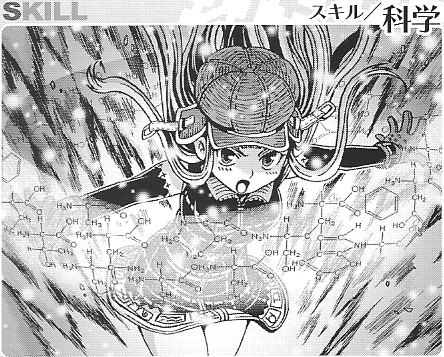
In case you'd forgotten, in the Million Dungeons, science is considered a form of magic.


 Jobs: Magician, Professor, Medic
Jobs: Magician, Professor, Medic
-
Synthesis
(Composition)
- "I can create... a knife gun."
Analyze - If you can see it coming, you know where not to be when it arrives.
Multitask - Seems more like a General Skill to me than anything requiring a scientific method, but hey, ain't my game.
Revive -
actual flavor text posted:
"C'mon, you, get up!" "He can't hear you. His eyes have rolled back, see?" "Nonsense, he's just fine. Ain't ya!? (*elbow drop!*) " "GYAOOW!!" "Well hey, look who's awake."

Anti-Magic Formula - To clarify my earlier statement: science is considered a form of magic by everyone except the scientists. In fact, kind of a touchy subject with them, so careful what you say, unless you're just looking to get your ear lectured off.
Boosting Formula (Boosted Science) - The exact opposite of the previous Skill, a formula to make magic work even better. Sometimes they get along okay with their fellow wizards.

Logic Attack (Logical Blast) - Kill someone with a well-crafted argument .
 A well-crafted argument that takes the form of a bolt of pure energy, granted, but still. (Also, as a bit of trivia, the Japanese word used here to mean "reasoning power" was apparently originally coined to refer to "The Force" in the original translation of
Star Wars IV
, but subsequently dropped in favor of transliterating the English word. Coincidence?)
A well-crafted argument that takes the form of a bolt of pure energy, granted, but still. (Also, as a bit of trivia, the Japanese word used here to mean "reasoning power" was apparently originally coined to refer to "The Force" in the original translation of
Star Wars IV
, but subsequently dropped in favor of transliterating the English word. Coincidence?)
Halfway's a good place to stop, seems like. Next time: from walking through walls to hitting your opponent with vowels! I can't wait!
Tour of Data - Advanced Skills (Dungeoneering to Esoteric)
Original SA post
Cynical-Pop Meikyuu Kingdom Dungeon Theater
Chapter 4.1.2: Tour of Data - Advanced Skills (Dungeoneering to Esoteric)
DUNGEONEERING
A bit of survival knowledge, a lot more direct manipulation of the world at large. Still can't believe this isn't considered one of the Great Magics. Whose idea was that, anyway? Jobs: Daedalist, Hunter, Adventurer, Thief
-
Trapper
- Whether by personal experience, book learning, or an innate sixth sense, you have a preternatural ability to find what's hidden.
Treasure (Good Time) - Monsters always keep the best loot hidden away, just gotta know where to look for it.
Dungeon Construction (Road Construction) - Knock down a wall and walk through it. Simple as that.
Sneak Through - An easier trick to manage when you can sink yourself through the floor and literally walk right under the enemies' feet (or feet-equivalents).
Containment (Wall) - Being able to pull chunks of the floor up and into peoples' way is handy, too.
Acrobatics (Hit & Away) - Still, one mustn't underestimate the value of being really, really fast.
Earth Rend (Dungeon Prominence) - Pulling up a bit more than a wall, now. Maybe pulling down some of the ceiling, too, for good measure.
Hidden Form (Stealth) - Remove yourself from the battlefield by momentarily integrating with the Dungeon Kernel. While useful in emergencies, the long-term effects of directly exposing a human body to the Meikyunification process are still unknown, but nobody's betting much on them turning out to be pleasant.

NEGOTIATION
One-stop shopping for all your interpersonal and social combat talkyskill needs. Jobs: Noble, Eunuch, Executioner, Merchant, Barkeep, Thief
-
Scout
- Pick an enemy in Combat and offer them their own bunk. You have to pay up front before you even make the Check, so it's much less cost-efficient than using the Negotiation mechanic, but if you've got the cash to burn, this is probably one of the better fires to toss it in.
Connections - Get more done during Camp through the magic of outsourcing!
Abet (Propaganda) - The Japanese name, as far as I can tell, is never used outside of court documents, so its meaning is very specific. The effect text lets you spend <Drive> to recover lost <Vox Populi>. The flavor text tells us that failure can hurt a Landmaker's credibility, but agitating the populace can increase their support. The artwork shows a guy in a crown flipping some lady's skirt. I have absolutely no idea how all of this is meant to fit together conceptually.

Beg For Your Life (Cry Pardon) - Hardly the most dignified tactic, but when it comes down to bowing your head or losing it...
Prestige - Rep so hard they can't even look you in the eye.
Right Arm (Loyalist) - Haven't got much to add to the card itself, but I think it's interesting that "right arm" ( migi ude ) has the same connotation in Japanese as "right hand" does in English. That's all. Moving on.
Split - Spread dissension among the ranks, and the enemy might just beat itself up for you!
Sexy - [Beauty] is a passive benefit to being attractive, thus a General Skill. This one's for actively using it to your advantage, which requires a bit more know-how (or so I'm guessing).
USEFUL
That is, making yourself useful. Y'see? Jobs: Eunuch, Guard, Barkeep, Worker
-
Combination Attack
- Greater than the sum of its parts.
Awakening Kiss (Blessed Kiss) - Ah yes, the old "Prince Charming", a classic for the ages.
Indomitable (Gung-ho) - Loyalty makes you strong! So take off your shoes, for industry!
Aggravation - Throw an enemy off their game with a well-timed taunt.
Blitz Tactics - Historically speaking, I think there's more to a blitzkrieg then just moving around really quick, but that's all you get here. Doesn't prevent a Surprise Attack, pretty sure, but it can keep the situation from getting any worse.
Date - Being able to have a romantic moment alone in the middle of a dungeon sounds like it'd take quite a bit of skill, indeed.
Chained Attack (Alignment Attack) - Okay, boys, Routine 27! (Works every time.
 )
)
What One Likes Best, One Will Do Best (Love Affair) - Mouthful, ain't it? Well, that's the straight translation, I didn't want to take too long trying to figure out a way to shorten it. Leave that for the professionals. After all, that's what they like best, right? So it all works out!

ENTERTAINMENT
Showbiz! Jobs: Noble, Happymancer
-
Carnival
- I guess I could see how turning camp into a bacchanal would make everybody forget all about the room they just got done mapping out the other day, but what I don't get is why you'd want to do it.

Martial Music - Piper Bill would be proud.
Impromptu - Like [Aggravation], only more directly inspired and possibly less aggravating.
Combat Dance - Boogie wonderlaaaAAAAA THAT WAS MY FAVORITE ARM
Spell-Song ( Galdr ) - Sing 'em into a swamp.
Spirit Sound (Sonumen) - I dunno how either of the names relate to using the letters in someone's name to kill them, but the idea's awesome enough that who cares.
Narcissist (Narcissism) - You love you.
Mind's Eye (True Sight) - Your training in the theater allows you to see through illusions, apparently.

ITEM
Get the most out of your gear. Jobs: Medic, Merchant, Cook, Thief
-
Big Bag
- Double your carrying capacity.
Never
a bad idea.
Shopping - They shall call you the Bargainmaker.
Mend (Patch-up) - See? Good as new.
Present - Here ya go!
Weapon Mastery - Just watch out for tired archaeologists with guns.
Economy - Use less, have more.

Full Power (Full Efforts) - Work smarter, not harder.

Partner ( Fetish ) - What, you've never named your car, even? It's not that weird!
ESOTERIC
Practically superpowers , these are the most advanced of the Advanced Skills. In order to learn one, three requirements must be met: you must have an Advanced Job (or in the case of Servants, just one Advanced Job will do); you must know a certain number of Advanced Skills from the Group(s) specified for each Esoteric Skill; and your current Job must provide access to at least one of the specified Groups.
-
Sound-Cutting Sword
(Sonic Blade), 1+ Melee
- An attack so fast your sword actually slices through the sound barrier.
Kill Zone , 1+ Ranged - Interrupt an enemy's movement by blasting the hell out of them.
Overpowering Chant (Cry Chant), 2+ Astrology/Summoning/Science - Eliminate the middleman of spellcasting and buffet foes with syllables of raw magic.
Beast Memory , 1+ Dungeoneering - You now know so much about monsters that you can become one whenever it's convenient.
Alas, Cruel World (Les Miserables), 1+ Negotiation/Entertainment - When you sing, all the world stops to listen.
Life is Sweet (Dolce Vita), 1+ Useful/Item - "When you do things right, people won't be sure you've done anything at all."
Yeah, it's not the weekend anymore and this is only one post. What can I say, I'm unreliable. Next time: loots!
Tour of Data - Common Items
Original SA postNingyou posted:
The lexicon from the intro, the opening fiction, leading into the dumb ~~freedom of the streets~~ thing by asking "why a 14yo girl would suck cocks in bus stations when she could be anywhere else"
[...]
At the other end of the spectrum, though....well, some "whitebread loser" with "his semen still warm in some 14yo boy's mouth" (whyyyyyy does the writer keep coming back to fourteen-year-old prostitutes that's kind of weirdly, frighteningly specific)
They're not "coming back" to them, it's the same prostitute in both examples, a subtle emphasizing of Mr. Minivan's utter cluelessness about the world beyond his Miracle-Gro front lawn where people stop being polite and start being real.
Also who the fuck didn't love stomping through the dead leaves every fall when they were a kid.

Cynical-Pop Meikyuu Kingdom Dungeon Theater
Chapter 4.2: Tour of Data - Common Items
Items! They're what you own. Broadly split into two categories: Common and Rare . Common Items are the mundane things, easily bought with plain old cash money during the Kingdom Phase; Rare Items are the magical artifacts and suchlike, and are generally much harder to get your hands on. Rares are listen in the Dungeon Book, though, so data-wise, it's all Commons for now.
All characters have six Item Slots which represent their inventory. Each Item takes up one Slot unless specified otherwise in the Effect Text, and a character can only use Items which they have equipped in a Slot. So, a Knight equipped with a sword, shield, and a suit of armor would have half of their Item Slots filled just kitting themselves up for battle, never mind anything else they might want to carry along. Space management is essential!
Each Item Slot can also hold up to 10 Materials , of which there are also ten types: Meat , Fangs , Leather , Wood , Iron , Cloth , Reagents , Machinery , Gunpowder and Information . Materials can be used to craft Common or even Rare Items during the Kingdom Phase, and each Item has listed on its card the components required to make it. Any number of an Item can be made in a single action provided you have enough Materials on hand, although you can't make more than the Court has open Slots to carry.
Unless you combine the Items together, creating instead a single Item with an increased Item Level ( unless the Item you're making doesn't have a Level to increase). Crafted or purchased Items always start at Level 0 (though Items looted from Monsters may have some Levels on them already), and can be raised up to a maximum Level of 10 by crafting, special events, or using certain Skills or Facilities. Naturally, higher Levels mean better effects: weapons do more damage, food restores more HP, that sort of thing.
Item effects have the same range of Action Types and Targets as I told you about in the first Advanced Skills post, so go back and read that one if you can't remember because I hate repeating myself. DATA TIME!!
ARMS
-
Blade
- The king of weapons: a long sharp pointy bit with a handle attached to the blunter end. Flavor text heartily endorses reskinning into whatever sort of blade you fancy, from popular standbys such as broad swords and katanas to more exotic choices like flamberges or kukris.
Dagger - The young prince of weapons: a short sharp pointy bit with a handle attached to the blunter end. Not as much to reskin here, so the flavor text instead has a Dungeon Boss calculating how many Rounds are left until the little girl poking him with one finally takes the last of his <HP>. Yeah, it's that sort of game at times.
Battle Axe - The something big and menacing of weapons: a sharp edged bit at the end of a longer handle. Reskin suggestions stray a bit from the expected, including pickaxes and sickles alongside pulaskis and bardiches.
Shield (Buckler) - The captain of the weapons guard: a sheet of some hard material strapped to one arm.
Spear - The prime minister of weapons: a sharp pointy bit with a really long handle attached to it, so you can get your licks in without getting licked back.
Shuriken - The ninja of weapons. The weapon of ninja. They're a ding-dang Class, you had to know these'd show up eventually.
Crossbow - The okay I'm sick of this gag of weapons. Basic pew pew ranged.
Armor - Hits hurt less.
War Hammer - Big, heavy and blunt. Reskin suggestions include maces, mauls and... "go-go balls"??

Bomb - Did you know that the “petard” by which people are often said to be hoisted is actually a primitive grenade?
 Well, that’s what I was told a long time ago, anyway, but I just looked it up and it’s actually a primitive breaching charge, so the fact’s not as relevant here as I thought it’d be but I’m leaving it because I haven’t got anything else to say.
Well, that’s what I was told a long time ago, anyway, but I just looked it up and it’s actually a primitive breaching charge, so the fact’s not as relevant here as I thought it’d be but I’m leaving it because I haven’t got anything else to say.
Firearm - Just another one of the many marvels brought about by the progress of MODERN SCIENCE!!
 Far more damaging than comparable bow weapons!!...although, granted, it’s not any more accurate… despite being considerably more expensive… um… progress?
Far more damaging than comparable bow weapons!!...although, granted, it’s not any more accurate… despite being considerably more expensive… um… progress?

Great Sword - A sword so big it takes up two Item Slots. For those who want to play as Cloud Strife or Guts or Sagara Sanosuke or well you get the idea.
Broom - “Now there’s something you don’t see every day, Chauncey.” “What’s that, Edgar?” “Princess disarming a pit trap with a broom.” “Oh, I don’t know. Haven’t you ever heard of ‘mine-sweeping’?”

Armor-Piercing Bullet - Some Monsters have damage-reducing Skills; use one of these in an attack to negate them. Still just one to a Slot though, which seems really odd to me since they're just bullets, but whatever.
Cannon - Only takes up one Slot, but requires at least 10 <Staff> to stay equipped, and burns 1 Gunpowder every time it's fired. Blasts the bejesus out of a whole Area for the trouble, though!
LIFESTYLE
-
Pan
- An original hand-hammered wok for cooking on the fly.
Backpack - So many pockets, man, you don't even know.
Cracker (Clacker) - Y'know those things they sell at New Year's where you pull on a string and confetti comes popping out the other end? That's this.

Purse (Frog-Safe) - The Japanese call classic coin purses gama-guchi , "toad mouths". Thus, this ordinary looking bag has a toad sprite living inside of it that will store any coins placed in the bag securely inside of its mouth! Makes perfect sense!
Cloak - All the greatest adventurers have worn them.
Cards - A deck of 52 for the passing of time. Friendly round of Spit In The Ocean, anyone?
Apron - Protects your royal finery from blood spatters during those rip-and-tear moments.
Citizen Registry (Resident Library) - A comprehensive list of every citizen and their capabilities, so that if the Ninja's chuunin squad gets wiped out by a trap while on reconnaissance, the Vizier can tell at a glance who among the Maid Corps is sufficiently stealth-rated to step in as replacements.
Mobile Phone (Handy Phone) - ...of course, not trying to start an argument or anything, but he probably wouldn't have lose his chuunin in the first place if he didn't insist on communicating exclusively by trained courier sparrow. Tradition's all well and good, but don't you think they'd have used cell phones back in
 "The Golden Age of Ninjutsu"
"The Golden Age of Ninjutsu"
 if
they'd only been INVENTED yet?!
if
they'd only been INVENTED yet?!

Portrait - Paint a picture, it'll last longer.
Finery (Costume) - Just because you're wading through knee-deep ogre entrails doesn't mean you can't look ~positively fabulous~ while doing it.
Snack of Sunlight Yellow - If you've read the Meikyuu localization thread at all, you already know the story here. If not, first read aldantefax's initial post about handling cultural references , then either scroll down a ways through the discussion it generated or just skip ahead to where I posted my own findings. Summarizing would just not do it justice.
Glasses - For those who want to look intelligent. Actual intelligence not included.
Credit Card - “A magic card that can topple even the mightiest of budgets with a single careless swipe.”
Grimoire - That’s Latin for “101 Safe & Simple Feats Of Legerdemain To Astonish Your Friends!”.
RECOVERY
-
Box Lunch
(Luncheon)
- Light, portable, cheap, filling. This is
THE
essential right here, folks. All other Items are purely optional.
Wonder Drug (Antidote) - One-stop cure-all for everything from nerve toxins to plantar warts. "Side effects"? Who has time to worry about that?
Keepable Foods - "Meals ready-to-eat": three lies in one! Still, better than starving.
Stretcher - For carrying home those who can't make it on their own.
Coffee - Aaah, glorious caffeine.
Chocolate - Valentine's Day is now, always has been, and always will be, nothing but a massive con job.

Alcohol (Drink) - "Humanity was drinking alcohol 5,000 years ago, and we're still drinking it today. Alcohol is humanity's friend. And how could I abandon a friend?"
Full Course - Expensive, but sometimes a basket full of sandwiches just ain't enough.
Potion - Pretty sure it's an actual international law that you can't have a fantasy setting without healing potions.
First-Aid Kit (Trauma Kit) - Bandages and ointments.
Tonic - [Potion]'s older brother. Marketed by the Hagulma Republic under the name "Ganbari v Do! ", which I imagine I'd find to be riffing on some actual Japanese brand if I went looking, but

Dungeon Insurance - I was kinda hoping the flavor text would name who or what pays out on these policies, but nope, just a concerned voice making a "just in case" speech to some second party. Dunno how you'd pay out on what's essentially a word of recall scroll, though... guess I was hoping to find that out, too. Oh well.
Scientific Spice - Essence of Pure Flavor, only with less hallucinogens (probably).
Love Potion - Well, whaddaya expect?
Elixir - Not the Holy Grail, but a remarkable facsimile. Just don’t tip it over or you’ll set the whole damn town on fire.
EXPLORATION
-
Flag
-

O-Mamori (Amulet) - Actual item. (Also, a quick reminder that the names I provide are literal for clarity, not preference.)
Star Fragment (Blad of Star) - According to the flavor text, they’re happy to hang around with Landmakers “until they grow up”, so apparently they’re not so much star fragments as star larvae . And, as I believe I mentioned previously, these are your primary sources of light. Christ’s nails, but I love this fucking game.

Instrument of Torture - Self-explanatory. As with the weapons, the flavor text on this one suggests several options for reskinning: interrogation chairs, witches’ needles, iron maidens, pears
Power Wrist (Heavy Wristband) - For weight training. Y’know, like in Dragonball ?
Tent - Yep.
Instrument - http://www.youtube.com/watch?v=cAKentKiGOY
Familiar (Animal Companion) - Anything from cattes and dogges to domesticated monsters.
Mount (Ride) - Man, used to be you had to grind your way up to the level cap to get one of these. Now they’re practically throwing them at newbies. I’ve been with this game since launch, but it’s obvious all they care about is money anymore, so I’m deleting my account and burning all of my Jinx shirts, hoodies, figures, comics, novelisations, trading cards, soundtrack CDs, strategy guides, decals, keychains, jewelry, life-sized loot replicas, and imported body pillow covers in protest.

Trap Encyclopedia (Trap Collection) - Perhaps a set of flashcards?

Dungeon Protection Clothing (Dismaze Gear) - As far as I’m concerned, you’re not using this Item right unless you’re also carrying around a [Mace] reskinned as a crowbar.

Map - Wait! They don't love you like I love you.
Watch (Ticktick) - The Harlequin’s true sin was not bringing enough for everyone.
Mole-stick (Living Drill) - Literally a mole tied to the end of a stick. You point the stick at a wall, and the mole digs through it. Have I mentioned yet how much I love this game?
Pumpkin Coach (Pumpkin Wagon) - Flavor text says that by feeding milk to Monsters for 100 days straight, they’ll turn into a team of white horses, which was part of the original story maybe? I never got around to reading them, so
 Anyway, it then goes on to talk about how the first Pumpkin Coach was used by a princess from a certain small kingdom to
assassinate
an imperial prince?!
Anyway, it then goes on to talk about how the first Pumpkin Coach was used by a princess from a certain small kingdom to
assassinate
an imperial prince?!
 I knew the Grimm versions were darker, but holy
shit!
I knew the Grimm versions were darker, but holy
shit!
That’s it for Common Items. Next time: infrastructure!
The verb “ itomeru ” literally means “to stop with a shot”, with the implication that the target has been stopped by death, but can also be used as a euphemism for capturing another’s affections. So don’t worry, the prince is probably just fine!